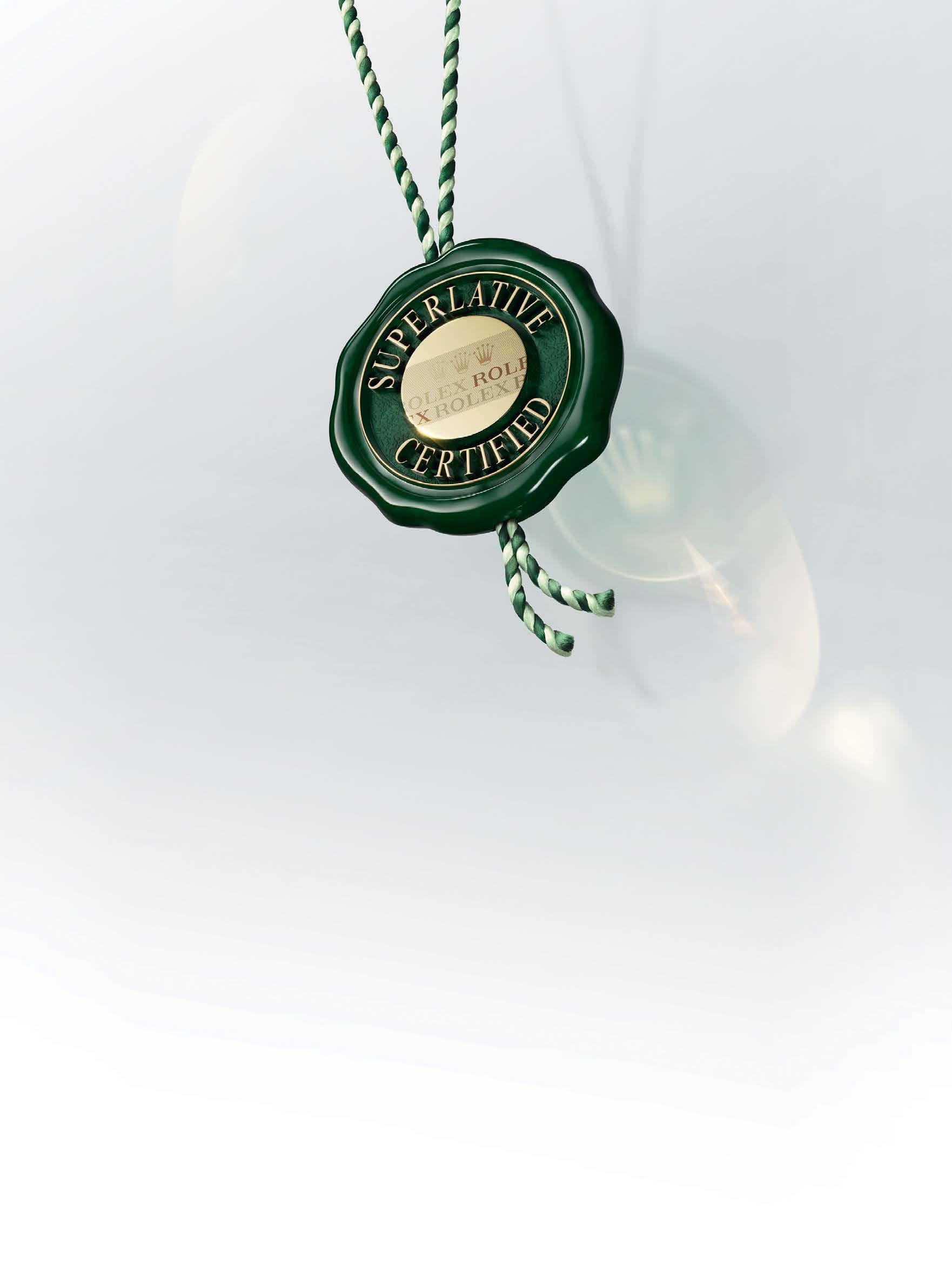





Nestled by the coast of Lusail sits the splendor of Raffles and Fairmont Doha, where luxury is rooted in even the smallest details. Open the doors to mesmerizing hospitality and make memories in a world of sophistication.
Nestled by the coast of Lusail sits the splendor of Raffles and Fairmont Doha, where luxury is rooted in even the smallest details. Open the doors to mesmerizing hospitality and make memories in a world of sophistication.
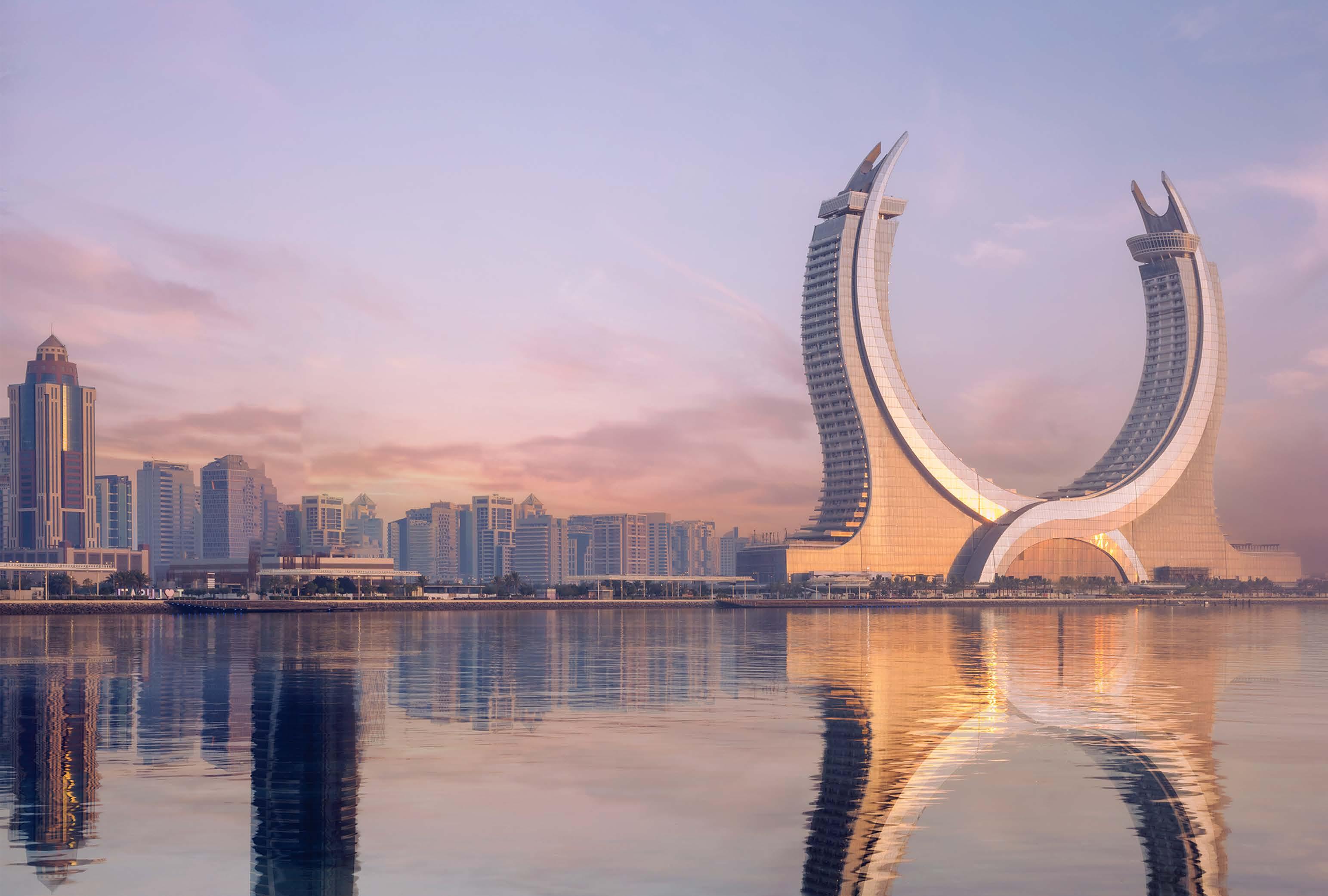




MAXIME HOLDER , Chairman and CEO of PAUL International, on how five generations of his family built the globally renowned French chain of bakery-café restaurants. P.38
Wellfit CEO DR. DIMITRI
is leading his startup to become the region’s biggest fitness brand with a valuation of US$300 million
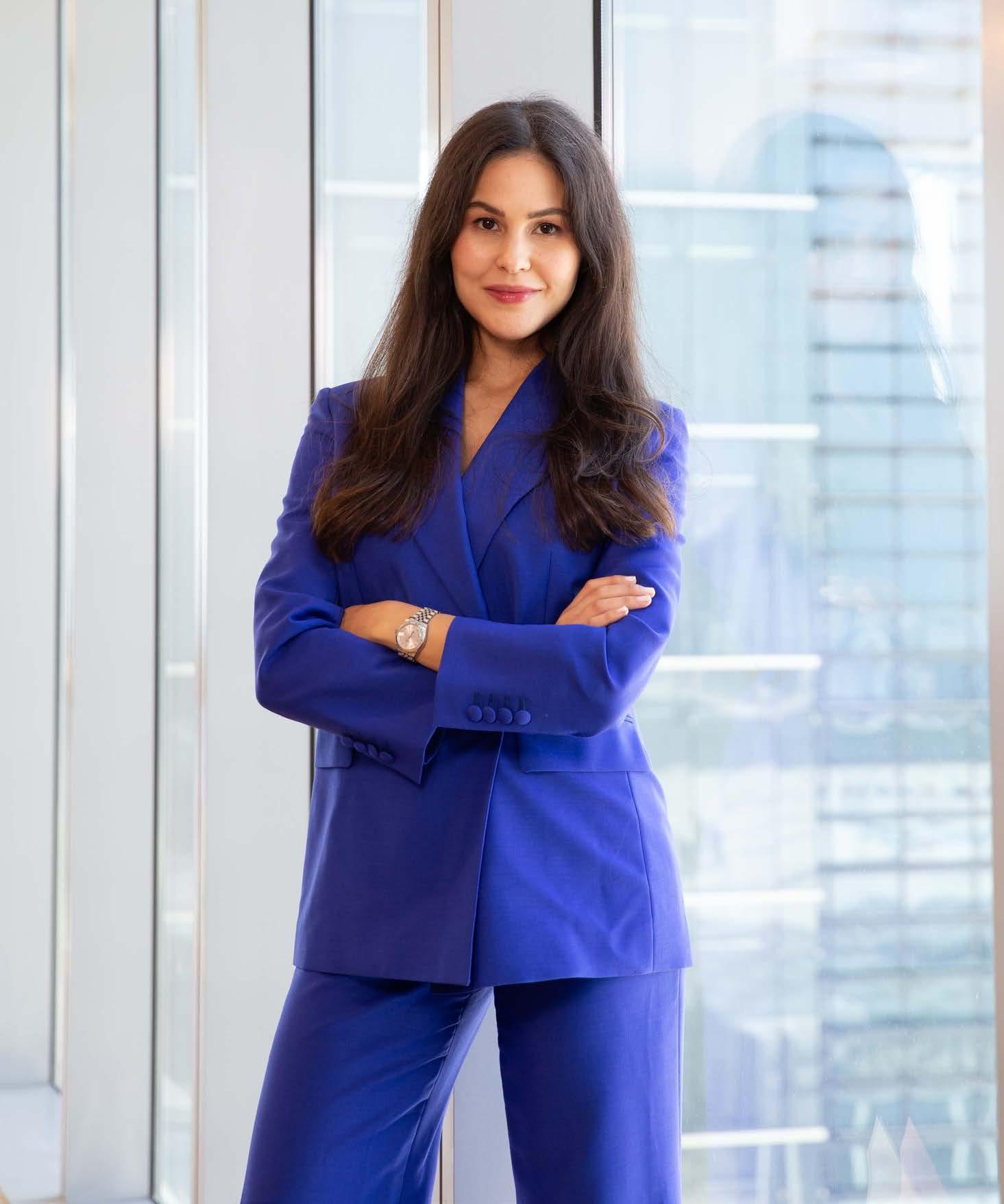
Homes from AED 1,696,000*
*T&C apply
A peaceful enclave hidden within the woodland.
Choose from a range of well-appointed homes, from two-bedroom townhouses to six-bedroom signature villas. Every residence at Sequoia blends nature-inspired design and features with the latest smart home technology, bringing you environmentally friendly convenience and comfort.
27232




57 Entrepreneurship for introverts
The Loop co-founder NAHEED MAALIK explains how to make your particular personality type work for you.
60 An entrepreneurial state of mind
MOHAMMED ABDUL GHAFFAR , General Manager of Entrepreneurship and Social Initiatives at Community Jameel Saudi, on the need for startup ecosystems to foster an open narrative around mental wellbeing for entrepreneurs.
62 Your business, linked
JAMES REYNOLDS , founder of SEO Sherpa, explains how entrepreneurs can boost the SEO of their websites with internal linking.
82 Raring to go
Meet the six startups that have been chosen to be in the second edition of PEPSICO’S GREENHOUSE ACCELERATOR
PROGRAM: MENA Sustainability Edition
September 2023
67 Focused on fertility
TORKIA MAHLOUL , co-founder of Abu Dhabi-based femtech startup Ovasave, wants to help women achieve their reproductive freedom.
72 Purposeful growth
A look into how Germanyheadquartered HENKEL pursues its mission to be “pioneers at heart, for the good of generations.”
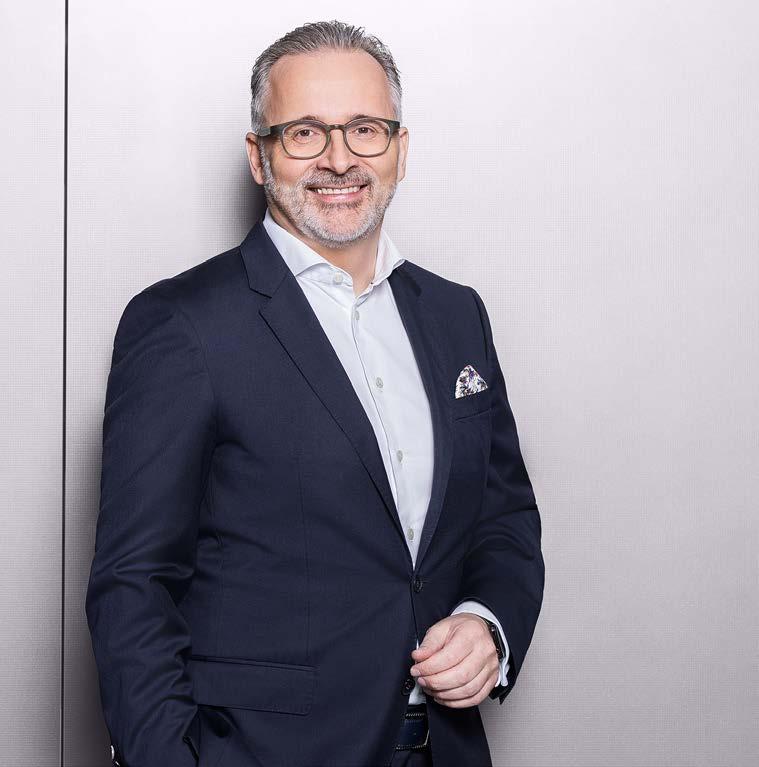
76 Making workplace wellness count
Behind the scenes of RE:SET’S firstof-its-kind employee well-being program at New York University Abu Dhabi.
20 Staying the course
LEDGER Chairman and CEO Pascal Gauthier on why it pays off to be an early adopter.
EDITOR IN CHIEF Aby Sam Thomas aby@bncpublishing.net
CEO Wissam Younane wissam@bncpublishing.net
DIRECTOR Rabih Najm rabih@bncpublishing.net
ART DIRECTOR Simona El Khoury
MANAGING EDITOR Tamara Pupic tamara@bncpublishing.net
FEATURES WRITER Aalia Mehreen Ahmed aalia@bncpublishing.net
DIGITAL SOLUTIONS DIRECTOR Mahdi Hashemi mahdi@bncpublishing.net
HEAD OF INNOVATION
Sarah Saddouk sarah@bncpublishing.net
GROUP SALES DIRECTOR – B2B GROUP Joaquim D’Costa jo@bncpublishing.net
COLUMNIST Tamara Clarke
CONTRIBUTING WRITERS
Gina Bagnulo, Fida Chaaban, Mohammed Abdul Ghaffar, Naheed Maalik, James Reynolds, Aakanksha Tangri
SUBSCRIBE
subscriptions@bncpublishing.net to receive Entrepreneur Middle East every
issue
ENTREPRENEUR.COM
fresh content daily on our website
All Rights Reserved 2023. Opinions expressed are solely those of the contributors. Entrepreneur Middle East and all subsidiary publications in the MENA region are officially licensed exclusively to BNC Publishing in the MENA region by Entrepreneur Media Inc. No part of this magazine may be reproduced or transmitted in any form or by any means without written permission of the publisher. Images used in Entrepreneur Middle East are credited when necessary. Attributed use of copyrighted images with permission. All images not credited otherwise Shutterstock. Printed by United Printing and Publishing.
With a complete line-up of AWD and PWD versions and the the 16-speed HI-TRONIX automated gearbox, the IVECO T-WAY features a host of functionalities such as Rocking Mode, Off-road Mode, Creeping Mode and 4 reverse gears to tackle with ease the toughest off-road conditions. The new architecture of the EBS system, combined with disc brakes on all wheels, greatly improves the vehicle’s performance and the driver’s safety in the most demanding applications.
The new IVECO S-WAY, with a completely redesigned and reinforced cab, offers a wide choice of Euro III/V diesel engines, a delivering class-leading power from 360 HP to 560 HP Euro III / 570 HP Euro V and superior fuel-saving devices, such as anti-idling feature, Ecoswitch, Ecoroll and Smart Alternator, 12-speed HI-TRONIX automated transmission with the most advanced technology in its category, electronic clutch and best-in-class torque-to-weight ratio.

Such frustrations are especially true for those in the field of entrepreneurship, where prioritizing profit and publicity over principles seems to have become the norm, and shortcuts to success -no matter how questionable- are accepted without a moment’s thought. It’s even become commonplace to say one thing, and do another- like business leaders who say that they treat their employees as if they were members of their own family, but then, one finds such assertions would ring true only if you were part of a highly dysfunctional household. In such a landscape, where ruthless tactics often yield quick wins, it’s fair for one to wonder whether adhering to a code of ethics even makes “business” sense. Indeed, all of us have horror stories to share about the worst kind of human behaviors that we’ve seen in the realm of work, and many of the subjects of these tales are known to continue unabated with their misdeeds, either blissfully unaware or willfully ignorant about the choices they make. All of this can be incredibly grating to watch as an onlooker wanting to stay on the right side of things- so, how does one deal with it all?
The solution -at least according to me- is to stop looking outward for validation, and to gaze inward instead. Forget about everyone else- what do you stand for? Do you wish to follow the herd, or would you like to chart your own course, one that’s more in line with your own moral code? What brings you true fulfillment? After all, in the end, it’s all about the legacy we choose to leave behind- and, sometimes, you just have to lead by example.
What goes around, comes around.” That’s what we often sigh to ourselves when we witness instances of bad behavior that goes unchecked, or, worse, rewarded, or even celebrated. But in an era where the concept of karma often feels elusive, it can get hard for one to even want to hold on to one’s integrity. Indeed, it can often feel like most of the world does not seem to give a damn about values, and, yet they seem to be doing pretty well for themselves all the same.
Aby Sam Thomas Editor in Chief @thisisaby aby@bncpublishing.net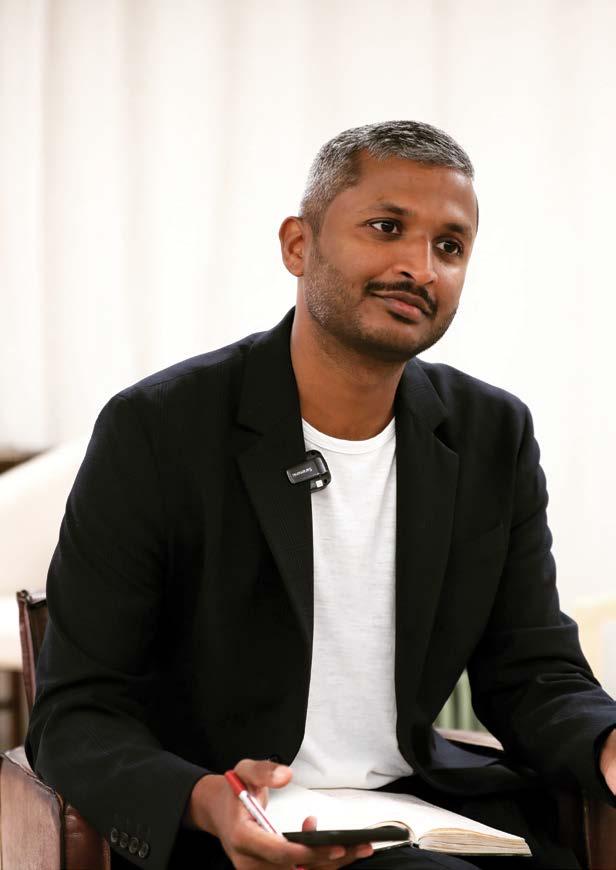
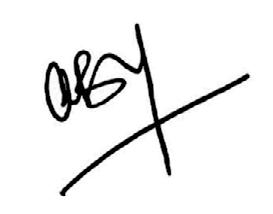





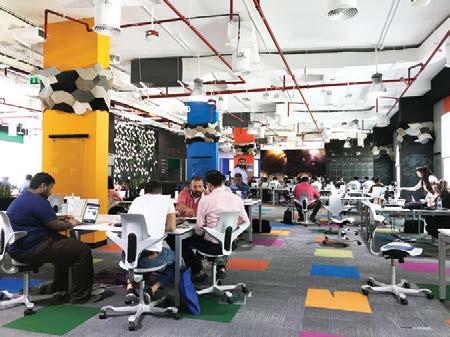

Dubai-based Club Lab Golf is combining technology-powered coaching and personalized club fitting to empower the next generation of golf professionals in the UAE.
 by AALIA MEHREEN AHMED
by AALIA MEHREEN AHMED
There is no one-size-fits-all template to achieving success in sports. And it is precisely with this ethos that the Dubai-based Club Lab Golf was founded as a golf coaching, expert club fitting, and club-building studio by Rohan Mehta and Reg van Rooyen in 2022.
“The inspiration behind launching Club Lab Golf stemmed from a perceptive observation of a gap in the
market,” Mehta says. “In a market where the focus was primarily on retail or coaching in isolation, we saw an opportunity to provide a holistic approach that combined personalized coaching and expert fitting. This realization prompted us to double down on these crucial aspects -coaching and fitting- and offer them together as a cohesive experience.
Our aim was to stand out by bridging the gap, and becoming a one-stop-shop solution for all golf-related services.” The 2,550 sq. ft-wide Club Lab Golf’s offerings are thus demarcated into two verticals: one-on-one coaching that leverages the latest sports technology, and expert club fittings customized to a given player’s existing skillset and natural play. “Our overarching long-term vision for the company centers on enhancing each golfer’s skillset, and, ultimately, helping them become better players,” Mehta adds. “We’re dedicated to addressing golfers’ needs, starting with state-of-the-art equipment and personalized coaching. We aspire for Club Lab Golf to create a ripple effect within the UAE’s golfing sector by setting new standards for player development, and fostering a culture of continuous improvement.”
}Now, for Mehta, who has forayed into other entrepreneurial ventures in the past, the idea to launch a golf-centric entity was sparked when he crossed paths with van Rooyen, who is a Professional Golfers’ Association (PGA) member. Armed with van Rooyen’s professional expertise as well as the power of technology, Club Lab Golf’s services are thus targeted at helping golfers finetune and upskill their talents. “We employ a comprehensive array of cutting-edge sports technology to elevate the quality of our coaching and fitting,” van Rooyen explains. “The centerpiece is the Foresight Sports GCQuad, a leading indoor simulation system renowned for its unparalleled precision in coaching, ball-tracking, and club data analysis. This camera-based device ensures accuracy by eliminating assumptions, enabling us to provide real-time, reli-
able insights. We also utilize Swing Catalyst, a high-speed camera software operating at 600 frames per second. This advanced tool allows us to meticulously analyze golfers’ swings, identifying crucial details for improvement. Complementing these technologies, we’ve invested in high-grade real-feel hitting mats that replicate the authentic feel and spin of real grass.”
}Club Lab Golf’s simulation-like environment therefore clearly aims to replicate the feel of a real golf course, while offering the comfort of practicing in an indoor space. But one might also be curious if such an option can truly substitute the benefits of using an actual golf course. The answer to that is a simple “yes,” argues Mehta. “With our indoor facility, golfers can practice, receive coaching, and get fitted for clubs year-round, overcoming weather limitations that often impact outdoor facilities,” he adds. “The use of cutting-edge sports technology sets us apart, providing immediate data on club and ball performance, enabling golfers to understand their true distances accurately, and eliminate guesswork. Our climate-controlled facility also guarantees comfort, regardless of external conditions. What truly differentiates Club Lab Golf is our personalized approach to providing one-on-one services across the board.”
}But beyond the realm of technology-powered coaching, comes Club Lab Golf’s dedication to offering customized golfing clubs and other equipment. “Club fitting, in simple terms, is like a tailored suit for a golfer’s game,” van Rooyen says. “It involves assessing a golfer’s unique attributes and swing dynamics to determine the optimal specifications for their golf clubs. For instance, a player’s skill level or handicap plays a pivotal role in crafting the perfect club. Beginners, for instance, might start with the basics like correcting their grip size and length of the golf club to ensure comfort and ease of learning. As a golfer progresses and gains consistency, more intricate elements like lofts, lies, and angles come into play, fine-tuning the club to match their evolving technique.” And what may seem as a simple personalization of golfing equipment is, in fact, a significant building block towards creating stronger golfers- and addressing the pitfalls that are inherent to the sport. “We recognized the inconsistencies that can arise

THE INSPIRATION BEHIND LAUNCHING CLUB LAB GOLF STEMMED FROM A PERCEPTIVE OBSERVATION OF A GAP IN THE MARKET.”
from mass-produced clubs, and the discrepancy between claimed and actual specifications,” van Rooyen explains. “To address this, our in-house lab ensures precision and transparency in club building. This facility allows us to assemble clubs with exact specifications, and provide golfers with data-backed insights into why certain adjustments are necessary. The transparency of our lab fosters education, enabling golfers to understand the mechanics behind their clubs, and make informed choices. By emphasizing transparency, education, and a hands-on approach,

Club Lab Golf’s club fitting lab adds depth to the golfer’s experience, offering both tailored equipment, and a deeper understanding of the game.”
}While its expert club fitting services start at a price of AED250, Club Lab Golf’s coaching sessions start at AED575, and its practice bay booking is set at AED250 per person per hour. “Our core target market at Club Lab Golf encompasses a diverse range of golf players and enthusiasts, spanning from beginners to experienced individuals, regardless of gender or age,” Mehta adds.
“Our services cater to a wide spectrum, from those who have never played golf, to seasoned professionals, making it accessible to anyone seeking to enhance their game. The UAE’s multicultural landscape draws customers from various corners of the globe, including Saudi Arabia and India. Club Lab Golf is committed to fostering a welcoming environment for all, acknowledging that both women and children are active participants in our community.” As it so happens, Club Lab Golf’s entry in the UAE market comes at a time when the country has been seeing a
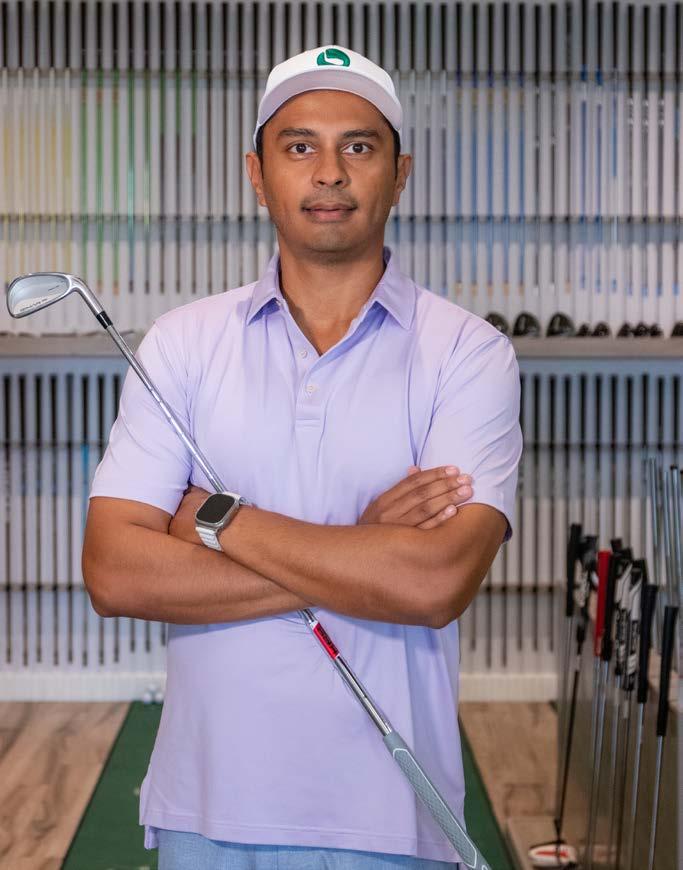
palpable increased interest in golf. “Over the years, golf tourism in the country has experienced significant evolution, and the COVID19 pandemic further accelerated interest, positioning golf as a safe and engaging outdoor activity,” van Rooyen says.
“This surge was particularly noticeable among younger generations, who sought an avenue for athleticism, fitness, and social interaction. With Dubai hosting major international tournaments like the European Tour, the sport’s visibility and allure have continued to expand.
Amidst this evolving landscape, Club Lab Golf holds a vital role in attracting more youngsters to learn the game.”
}Part of van Rooyen and Mehta’s plan to entice more young people to take up golf
WE ASPIRE FOR CLUB LAB GOLF TO CREATE A RIPPLE EFFECT WITHIN THE UAE’S GOLFING SECTOR BY SETTING NEW STANDARDS FOR PLAYER DEVELOPMENT, AND FOSTERING A CULTURE OF CONTINUOUS IMPROVEMENT.→ Rohan Mehta, co-founder, Club Lab Golf → Reg van Rooyen, co-founder, Club Lab Golf
transcends the tools employed,” he says. “In today’s era, where technology provides data-driven insights, the coach remains an indispensable guide in shaping a player’s mental attributes like resilience and patience. The coach, far from being replaced, interprets the information technology provides, making informed decisions tailored to the individual’s needs. The essence of effective coaching lies in the coach’s ability to synthesize technological insights with time-honored coaching principles, resulting in a holistic development that prepares athletes for the multifaceted challenges of the mind and the game.”
lies in their commitment to changing perceptions about the sport. “Through educational initiatives, engaging social communications, and bite-sized content tailored to platforms like TikTok and Instagram, we aim to bridge the gap and make golf relatable to the younger generation,” van Rooyen says. “By leveraging the accessibility and interactivity of social media, we aspire to create an exciting and vibrant golfing community that entices and engages youngsters, fostering a new wave of golf enthusiasts in the UAE.” And according to Mehta, that level of awareness building will only continue within the walls of Club Lab Golf. “Education is central to our mission,” Mehta
declares. “We aim to empower golfers with knowledge, helping them make informed decisions about equipment and coaching that align with their needs and goals. Addressing resistance to coaching and equipment changes is a priority; we aspire to showcase the transformative potential of personalized approaches to golfing.”
}Now, Club Lab Golf’s tech-powered services come at a time when “the human touch versus technology” debate has found its way into the sports arena as well. Both van Rooyen and Mehta, however, remain clear that they key to achieving balance is to not favor one over the other.


“The key lies in finding a
harmonious synergy between technology and human expertise,” Mehta says. “In the realm of golf, for instance, possessing the best equipment and software won’t suffice if there isn’t a profound comprehension of how golf clubs should be tailored to individual specifications. Similarly, top-tier coaching tools are meaningless without a deep knowledge of the sport. The balance is pivotal!” Similar sentiments are shared by van Rooyen when asked how players can develop mental attributes, such as resilience and grit, in a technology-driven sporting environment.
“While coaching has certainly embraced technology, it’s crucial to recognize that the essence of coaching
}It is thus with this approach that Club Lab Golf now aims to cement its spot within the UAE’s sports industry. “Our overarching ambition is to fit every golfer in the UAE, Saudi Arabia, Oman, Kuwait, and beyond, becoming an integral part of the region’s golfing landscape,” Mehta says. “Looking ahead, our vision is aligned with the global growth trajectory of golf. With mergers, acquisitions, and the increasing popularity of the sport, we see boundless potential. As a homegrown organization, we are dedicated to evolving alongside the industry, contributing to its success, and harnessing golf’s positive impact on the economy, tourism, and hospitality. The endorsement of golf by UAE’s visionary leadership fuels our enthusiasm to be a part of this journey, and contribute to Dubai’s standing as a global golfing hub.”
THE USE OF CUTTING-EDGE SPORTS TECHNOLOGY SETS US APART, PROVIDING IMMEDIATE DATA ON CLUB AND BALL PERFORMANCE, ENABLING GOLFERS TO UNDERSTAND THEIR TRUE DISTANCES ACCURATELY, AND ELIMINATE GUESSWORK→ At Club Lab Golf, anyone who signs up for a training session will receive a personalized one-on-one experience using the studio’s software cum app program, Swing Catalyst

Ledger Chairman and CEO PASCAL GAUTHIER on why it pays off to be an early adopter by TAMARA
PUPIC“I like to start early in industries- 2000 was still early for the internet, [and] 2014 was definitely very early for crypto.” This statement by Pascal Gauthier, Chairman and CEO of Ledger, a Parisheadquartered manufacturer of hardware cryptocurrency wallets that reportedly stores more than 20% of the world’s crypto and 30% of the world’s non-fungible tokens (NFTs), offers a peek into the philosophies that has guided his time in the entrepreneurial arena thus far. “I like to work on opportunities when very few others are there, so that I can build my edge,” Gauthier says. “When it kicks in, I’m ready, and I can enjoy the benefits of my work.”
}Looking back to the start of his career, Gauthier says that he left university and entered the workforce in 2000, at a time when dot-com startups were enjoying increased investor confidence- although many among them would eventually shut down in an industry-wide crash. “But after the bubble burst, it created a lot of opportunities for me,” Gauthier says. “Most of my peers went back to consulting, banking, etc., and people thought that the internet was a phase, that it would never work- but I didn’t see it that way.” Having launched his career at price comparison service Kelkoo (which was acquired by the then internet giant, Yahoo, in 2004), Gauthier then went on to join advertising company Criteo in 2008, where he worked for five years as its COO. “I did the first part of my career in
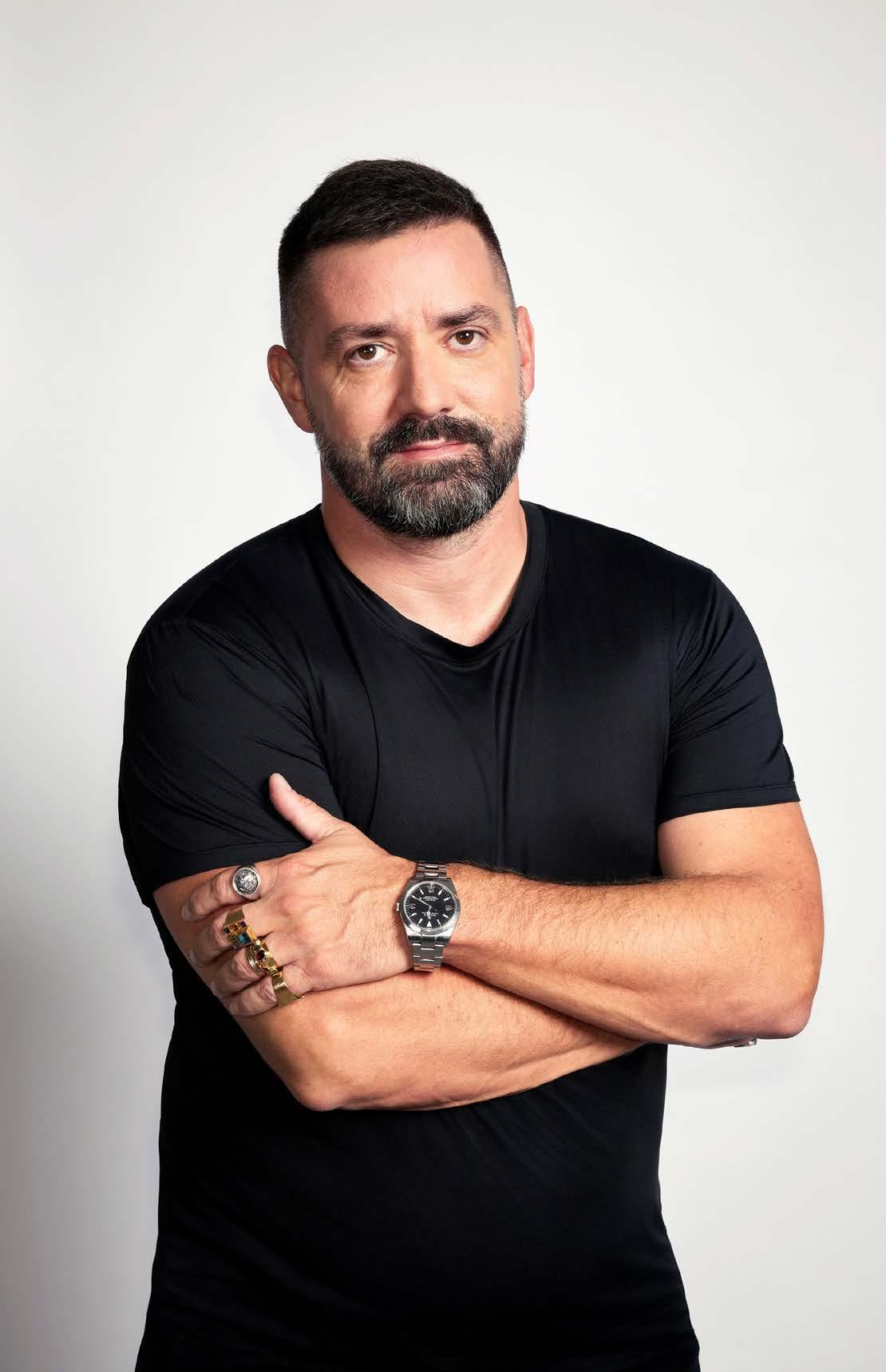
advertising technology, and that’s where I learned the first major lesson in my career,” Gauthier says. “If you find good leaders and good managers, you follow them, and you learn from them, so eventually you can one day do that yourself, which was what I did at Kelkoo.” Indeed, Gauthier credits those experiences for equipping him with the skills that would prove important for leading Criteo successfully. “In 2008, it was a very small startup- it had raised money, it had a team, but it hadn’t found its business model. It wasn’t generating any revenue,” he recalls. “So, I helped turn the company around, and
made it successful. It was the fastest growing company in Europe. We took it from zero to the Nasdaq Stock Market in five years. In the past 20 years, it remains the only French company to list on the Nasdaq.”
}Following his time at Criteo, Gauthier went on to work at venture capital (VC) firms Mosaic Ventures and Index Ventures, and those roles are what eventually led him to Ledger. “Venture capital helped me figure out how to raise money,” he explains. “You go to the other side, and you learn their ways. After that, I was ready to go back into
entrepreneurship, and so, I started Bitcoin-focused financial data website Kaiko, and I also invested in a bunch of companies- including Ledger.” Gauthier recalls here that during his time in the VC space, Bitcoin was coming up in more and more conversations, and it was a brief 2014 chat with Wences Cesares, CEO of Gibraltarbased crypto private bank Xapo, that resulted in Gauthier starting to “dedicate time, resources, and hard work to Bitcoin, and crypto in general.” “It was very early, which gave me time to learn, which was important to me, as I didn’t want to jump into some-
thing that was already a bloodbath with many players,” Gauthier continues. “My first reaction was to meet as many people as possible, everywhere in the world, to see what people were building. I was fascinated and intrigued by the kind of people in crypto at the time- they were trailblazers, a little crazy, the kind of people you want to be at the same party with. It looked like fun.” That said, at the same time, there was also an obvious lack of interest for Bitcoin and crypto among, well, everyday people. “They didn’t know why they should care, or why it was important,” Gauthier says. “They didn’t experience it. There was no everyday application yet. It was different from the internetwith that, you had email; people could understand that. There were use cases. Bitcoin didn’t have that.”
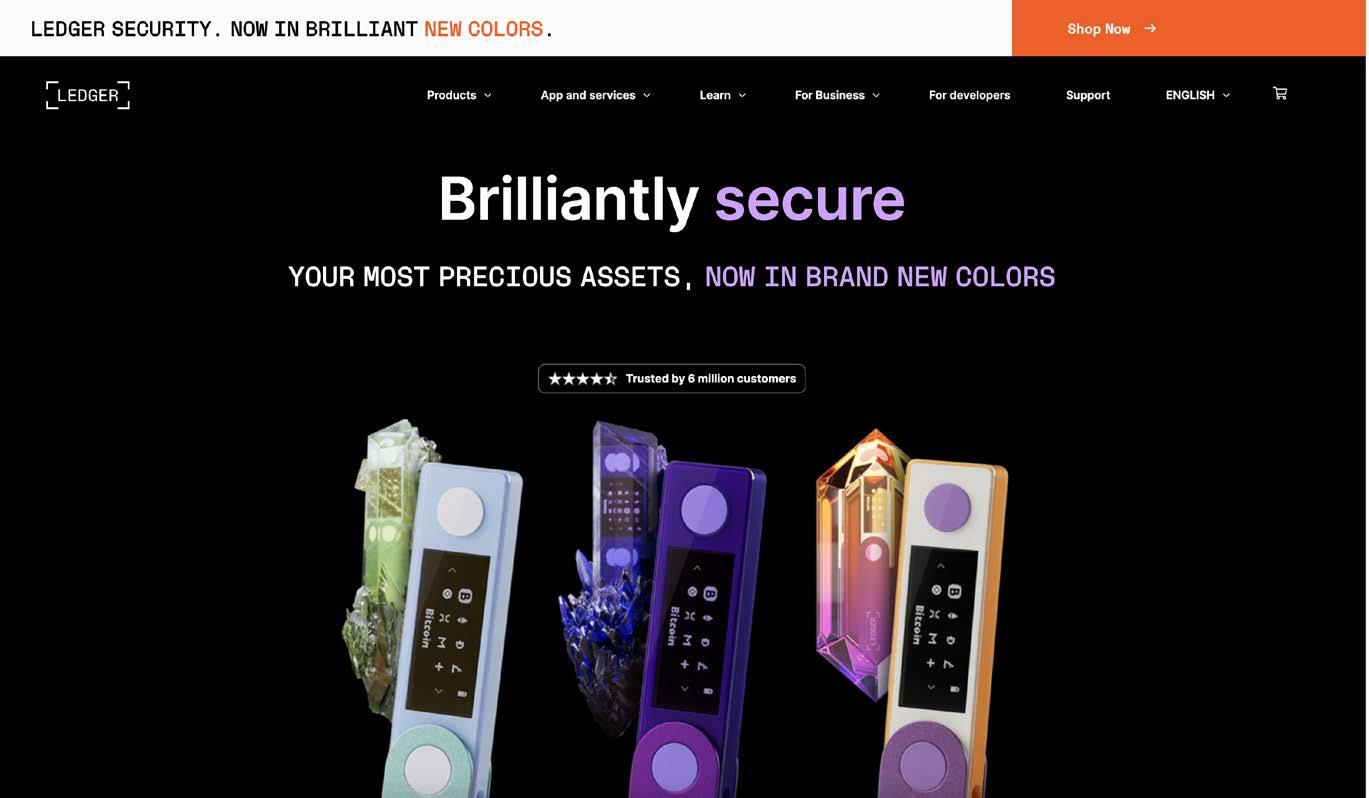
WHEN YOU BUILD AN EXPERIENCE LIKE LEDGER, EVERYTHING HAS TO MAKE SENSE, IT HAS TO FLOW TOGETHER- THE UNBOXING EXPERIENCE, THE MARKETING AND COMMUNICATION, FIRST-TIME CONNECTIVITY, CUSTOMER SUCCESS, ETC. IT’S NOT JUST A BASIC CONSUMER ELECTRONIC PRODUCT. IT’S DIFFICULT, BUT IT’S A GROUP EFFORT.”
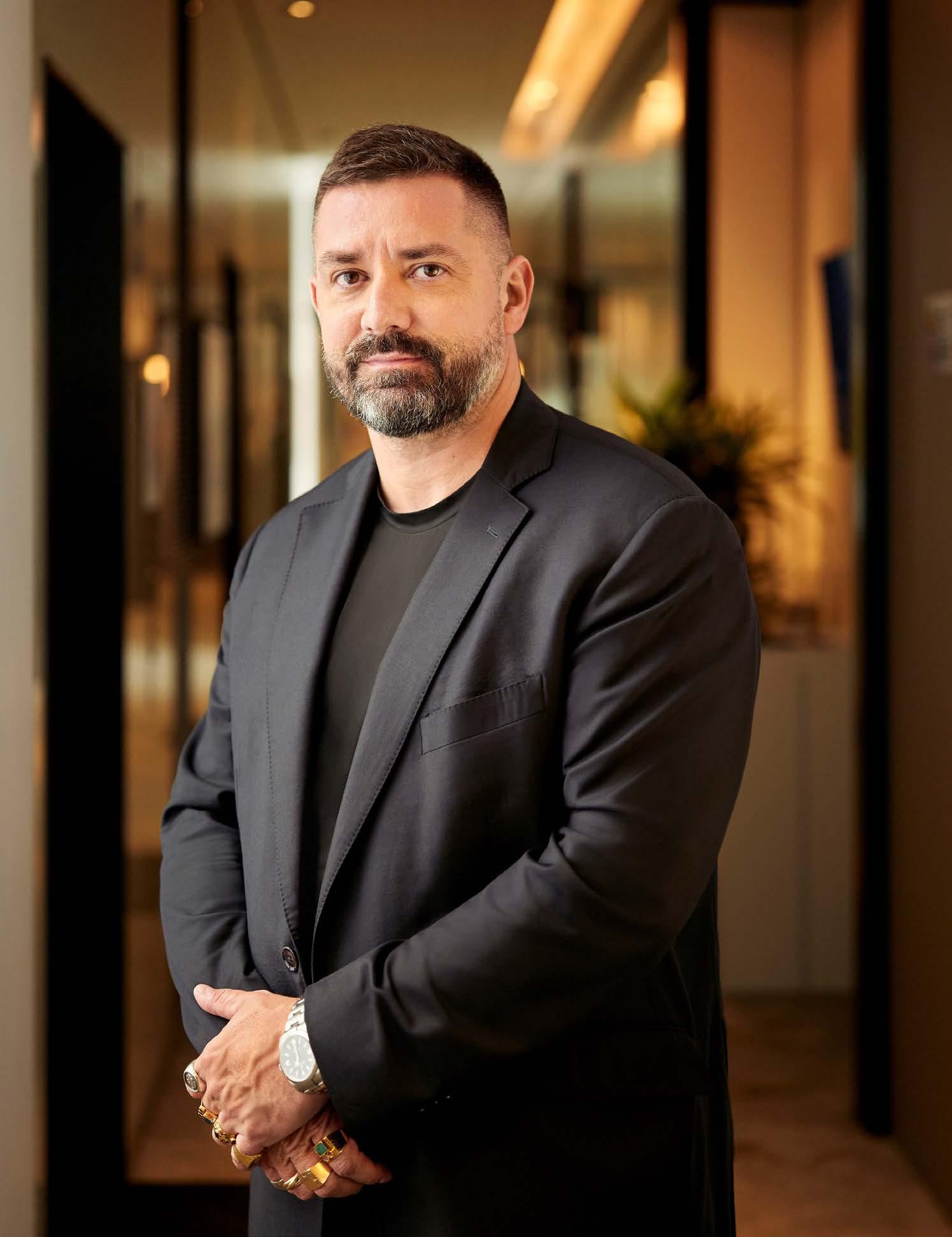
IF YOU FIND GOOD LEADERS AND GOOD MANAGERS, YOU FOLLOW THEM, AND YOU LEARN FROM THEM, SO EVENTUALLY YOU CAN ONE DAY DO THAT YOURSELF.”
}It makes sense then that with Ledger, Gauthier has made sure to create an everyday application of crypto. Ledger manufactures hardware wallets, specifically three products -Ledger Stax, Ledger Nano X, and Ledger Nano S Plus- which can be sold in bundles, such as a family pack or a privacy protection pack, accompanied with accessories for extra security or connectivity. “I joined in 2014 as an investor and board member, in 2017, I became president, and in 2019, I took over as CEO,” Gauthier says. “My challenge was to rebalance the company, make it a tech company, and hire many more engineers. We had forgotten to scale the tech and engineering part of the business, with only 25% of our staff in engineering. Now, we’re at 50% or more.We also had to present a roadmap to the board and the team, and to date, we’re executing on this, and revenue since 2019 has increased 10x. So far, so good.” Users of these wallets are further supported with the Ledger Live app, which helps you buy, lend, exchange your crypto, or get access to all the company’s smart services, such as decentralized finance (DeFi) apps, NFTs and more. “When we build a product, it’s not just a device, it’s an experience- so the whole
company is involved in creating that,” Gauthier says. “Everything we do is catered towards that experience- the e-commerce platform, the device itself, Ledger Live, the ecosystem, and so on. When you build an experience like Ledger, everything has to make sense, it has to flow together- the unboxing experience, the marketing and communication, first-time connectivity, customer success, etc. It’s not just a basic consumer electronic product. It’s difficult, but it’s a group effort.”
}Ledger currently has over 750 employees, spread between France, UK, USA, and Asia, and Gauthier finds diversifying locations to be of crucial importance for finding good engineers to work at his enterprise. “Technical talent is always hard to find, but the right technical talent is extremely hard to find,” he says. “For every ten people we interview, only one will get hired. You need a really efficient, high-performing organization to find this talent, recruit them, and replace them if they leave. It’s an ongoing process.” Meanwhile, as the crypto world at large has been suffering from a so-called “winter” of late, Gauthier believes that it -along with the collapse of major crypto exchanges – has allowed Ledger to surge “leagues ahead of anyone else in the space.” “Earlier this year, we announced that we had sold over six million devices,” he says. “While we don’t discuss financial specifics, we have consistently outperformed the market. Ledger Live revenue and volume has seen 200% growth year-on-year, far outpacing the current market conditions.” However, it hasn’t been all rosy for the company- 2023 saw one of its new services, Ledger Recover, come under fire before even being launched. To understand the premise behind Ledger Recover though, a refresher on crypto basics is necessary. In addition to public and private keys, an important element of holding and transacting with cryptocurrencies are seed phrases, i.e. 12 to 24 random words that serve as backup codes to be used if you lose or delete your crypto wallet. But since seed phrases also cannot be changed or
recovered if lost, people have lost millions worth of crypto over the years. Now, Ledger Recover was a new service designed to change this aspect for its Ledger Nano X, which would allow users to store encrypted versions of their seed phrases with three custodians. However, the crypto community at large had lots of reservations about this process given its inherent security risks, and they made their displeasure publicly known. In response, Ledger agreed to make the service strictly optional, as well as to open source the Ledger Recover protocol with the community, with Gauthier describing the whole situation as “a humbling experience.”
}Despite this blip on the road, Ledger still has plenty to be happy about its accomplishments this year- it, after all, did raise US$108.8 million in a Series C funding round in March. This brought the total amount Ledger has raised, as per Crunchbase, to $577 million, spread across eight rounds from 58 investors. Here, Gauthier readily admits that raising money is always difficult- but it is especially so in the field he operates in. “What’s different with crypto, perhaps, is that you have a market that is volatile, which creates big fear-of-missing-out (FOMO) moments where anyone can raise money, but also big depression moments where nobody wants to invest anymore, and it’s very hard to raise money,” Gauthier points out. “It makes the business hard to forecastit’s nearly impossible. When predictability is hard, it becomes difficult to raise money. We were proud to raise during a difficult moment for crypto, because it showed our resilience when others couldn’t show they were resilient. Most other businesses are building on established and predictable industries, with a known total addressable market. In the last bull run, the total addressable market of the entire crypto market was over $3 trillion. Today, it’s closer to $1 trillion, so you need to deal with that.” So, what would Gauthier’s advice for entrepreneurs still wanting to make it big in this space? “Stay the course,” he replies. “That’s all.”
WHEN WE BUILD A PRODUCT, IT’S NOT JUST A DEVICE, IT’S AN EXPERIENCE- SO THE WHOLE COMPANY IS INVOLVED IN CREATING THAT.”IMAGES COURTESY SAMUEL KIRSZENBAUM
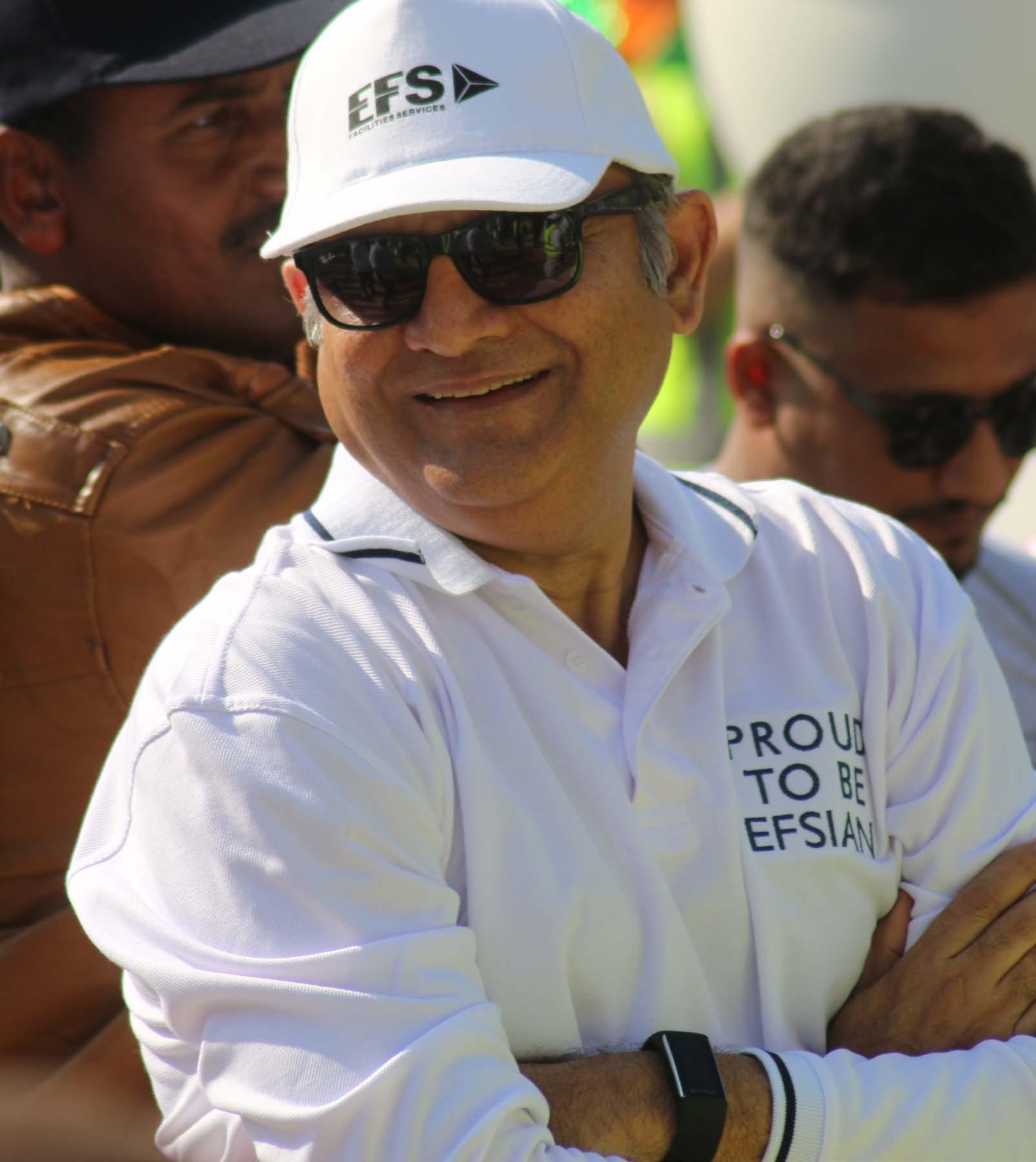
 by TAMARA PUPIC
by TAMARA PUPIC
As the Group CEO of the UAEheadquartered EFS Facilities Services Group, it’s safe to say that Tariq Chauhan knows a thing or two about effective leadership- and according to him, it requires one to look inward to see outward. “A true leader must be self-reflective,” Chauhan declares. “And selfawareness is yet another critical need for those in leadership positions. Being erroneous at times or failing in business is not a sin. It is integral to the risks of doing businessbut openness to learn from these mistakes is essential. Not owning mistakes and blaming others is counterproductive. I therefore strongly advise leaders to be self-aware of their own strengths and weaknesses, and even if the outcome is negative for no fault of theirs, it is imperative to accept that there are risks beyond one’s control. However, mitigating them is their responsibility by virtue of their pole position as leader.”
→ As Group CEO of EFS Facilities Services Group, Chauhan leads one of the fastestgrowing companies in the MEASA region, with it having seized a global opportunity with the help of determined and committed employees from 35+ nationalities.
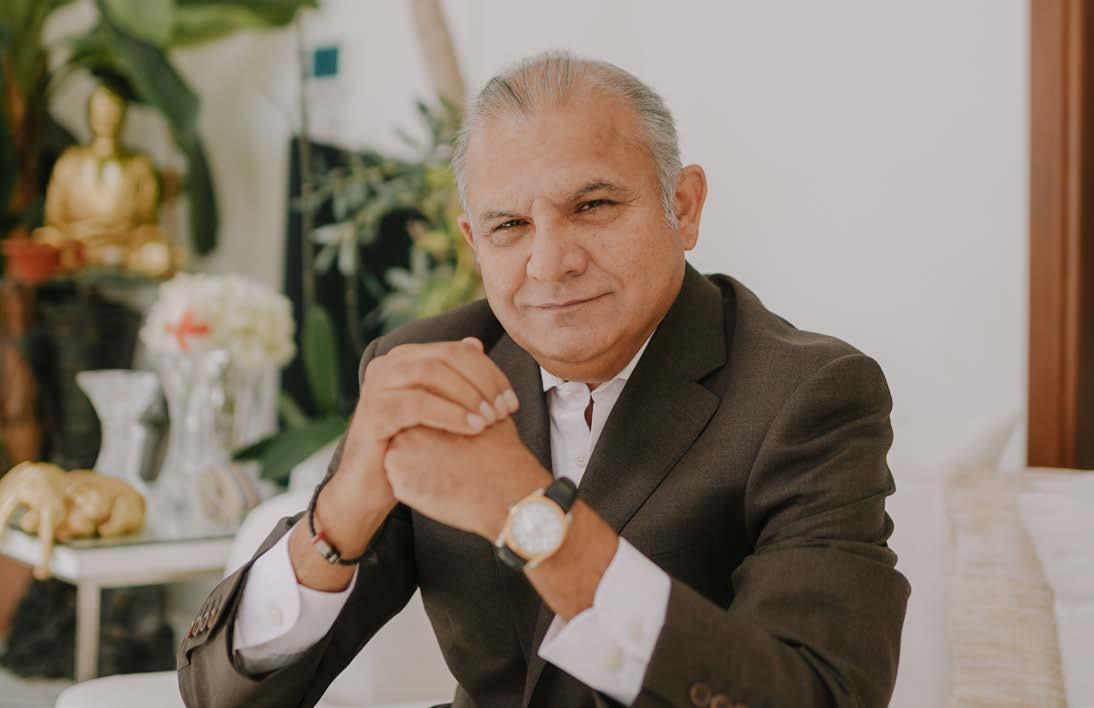
→ At EFS Facilities Services Group, Chauhan believes in promoting a work environment and corporate culture where its employees’ well-being and growth come first.
It becomes clear here that it is with this stance that Chauhan has gathered his thoughts on leadership in his corporate advisory, Getting to Resilient Mode. Chauhan says that he had long held an idea of writing a book, but it was an invitation from the publishing brand, Forbes Books, that prompted him to start on it in 2021. In addition, the onslaught of the COVID-19 crisis in 2020 served as a reminder of the significance of business resilience, and therefore determined the topic of his book. “Over the last few years, I have gained valuable lessons on resilience, both from external experiences, and my own professional journey marked by several failures,” he explains. “Then, I started working on the book by using my early hours every day for writing, putting together multiple chapters. I was inspired by the European Foundation for Quality Management (EFQM) Model [a globally recog-

nized management framework that supports organizations in managing change and improving performance], utilizing its principles to structure the various elements of my book. As for the impact, I was confident that the book would resonate with many individuals.”
Getting to Resilient Mode has already received bestseller status on e-commerce giant Amazon, specifically in the “strategy and
competition” and “business leadership” categories. In addition to it being well received among readers, Chauhan has decided to further ensure the book’s positive impact by announcing that the proceeds from its sales will go towards improving the lives of frontline workers. This announcement was made at the book’s launch, which was held in the presence of the Indian Ambassador to the UAE, H.E. Sunjay Sudhir, at the Mohammed Bin Rashid Library in Dubai. When asked to summarize the key lessons from his book, Chauhan lists three. “It is important to pursue impact by assessing the outcomes and results therein, not just efforts,” he explains. “Secondly, don’t fear risk, and even if the outcomes are not positive, introspect your learnings to correct your future action. Thirdly, continue to embolden your values to create goodwill and self-sustainable moral and ethical guidance.”
Now, Chauhan is someone you certainly wouldn’t think twice about going to for business advice, given that he leads EFS Facilities Services Group, a global leader in delivering integrated facilities management services that is poised to cross US$1.5 billion in revenue this year, having achieved compounded annual growth of 19%
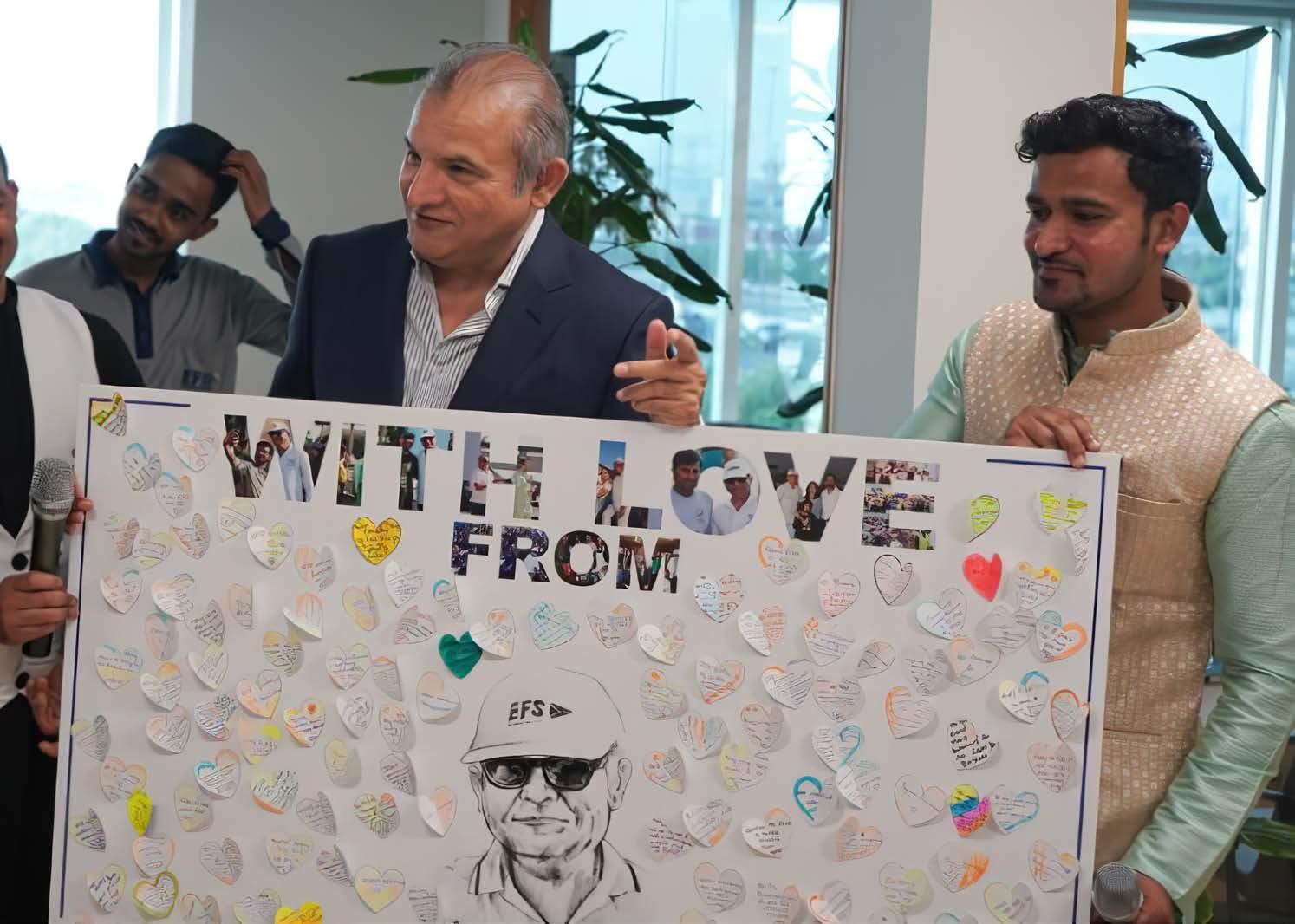
A TRUE LEADER MUST BE SELFREFLECTIVE, AND SELF-AWARENESS IS YET ANOTHER CRITICAL NEED FOR THOSE IN LEADERSHIP POSITIONS. BEING ERRONEOUS AT TIMES OR FAILING IN BUSINESS IS NOT A SIN.”
over the last decade. With its workforce already crossing 25,000 in number, Chauhan now intends to continue to focus on growth and expansion of the group’s footprint by adding Iraq and Malta to the 23 countries it currently operates in. “The distinguishing feature of EFS Facilities Services Group is its 12-year client retention of over 95% of its customers,” Chauhan adds.
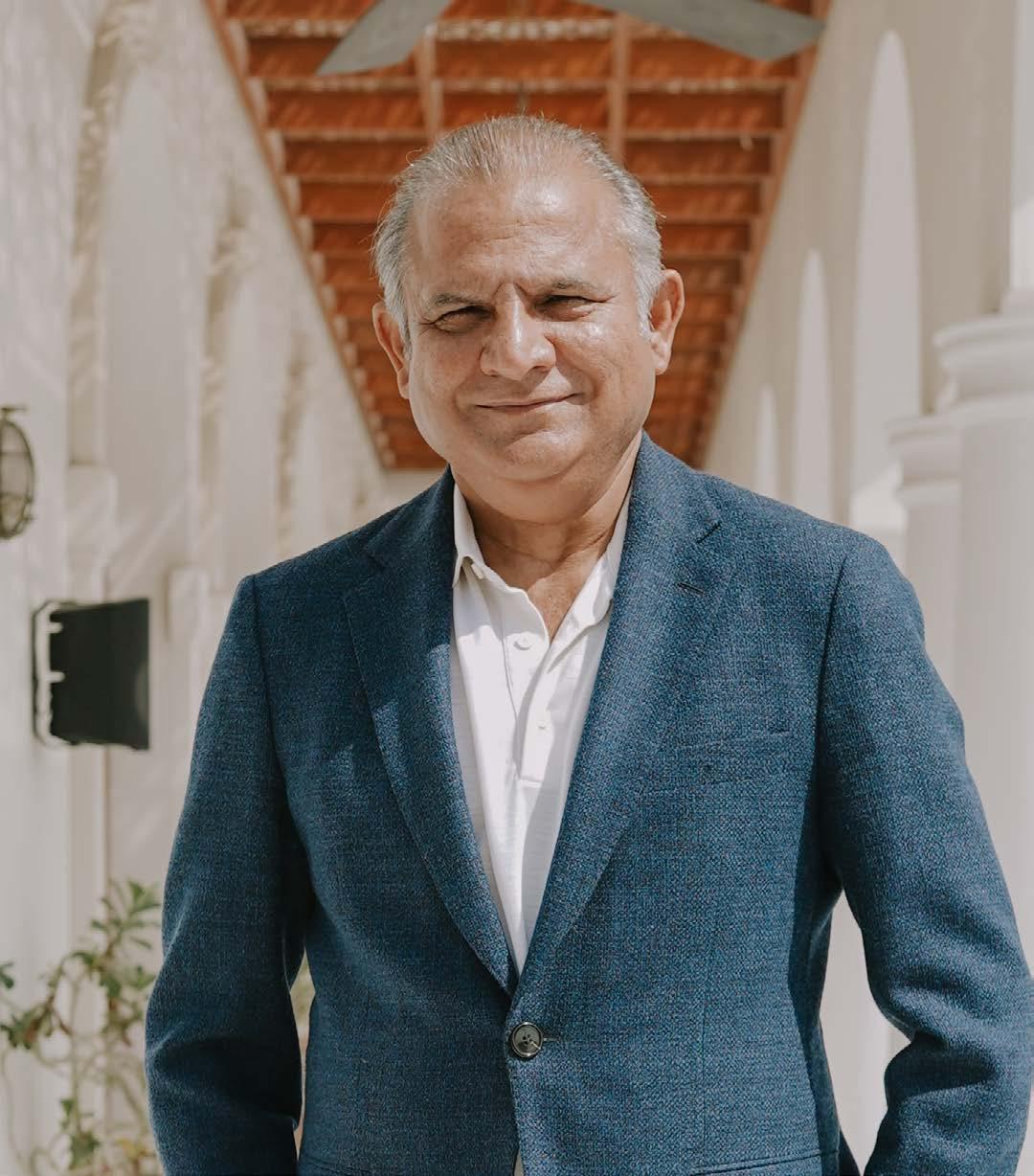
“At the same time, the group continues to add the finest and most of the most prestigious client portfolios from iconic and giga projects in UAE and Saudi Arabia.” However, after so many years in business, Chauhan knows that it is not realistic to talk about only business highs- he therefore also admits that EFS Facilities Services Group is currently
facing several challenges as well. “There is a continuing onslaught of reduction of margins owing to client pressures, competition, and cost escalation, that we are trying to address through innovation and cost reduction,” he says. “Another issue is overall service cost escalations. EFS has adopted a lean strategy in managing its costs, and taking steps from working capital costs to its operating costs, from productivity of its human resources, supply chain, to its logistics costs. The company has set a target to reduce 20% of its cost of sales, while trimming its overheads.”
The third and the biggest challenge his business is facing, Chauhan adds, relates to the rising capital expenditure and working capital needs. “Due to clients’ demand for longer deferred terms of more than 120 days in tenure, the pressure is immense,” he explains. “The company is addressing this by implementing improvements in its receivables management, aiming to achieve an average days sales outstanding of less than 90 days. In the backdrop of banks’ tightening of interest rates, the cost of capital is going up. To meet its growth targets, the company needs additional working capital, whilst it also has to invest in capital expenditure to fund its innovation in both technology and machinery that will help eventually in boosting profit margins.”
Looking beyond the current business challenges, Chauhan has chosen to base the growth strategy for EFS Facilities Services Group on three pillars. “Firstly, we focus on growing through new business and variations to maintain low pressure on overheads, as well as on growing the top line to ensure economies of scale in order to contain the over-
DON’T FEAR RISK, AND EVEN IF THE OUTCOMES ARE NOT POSITIVE, INTROSPECT YOUR LEARNINGS TO CORRECT YOUR FUTURE ACTION.”
heads, and maintain our desired net profit margins,” he says. “Then, we focus on innovation, service excellence, and a lean approach to be more competitive and stay ahead of competition. Lastly, we aim to bring efficiencies in service delivery through upskilling to boost manpower productivity, building a robust shared services model, and streamlin-
(UIBC). When he speaks about the UIBC, Chauhan suggests that this is an entity that people in the business realm would be wise to keep an eye on, given that India and the UAE have recently signed the Comprehensive Economic Partnership Agreement (CEPA). “UAE-India bilateral trade is poised to grow to over $1.5 trillion in the next 10 years, and so there is a great prospect for two-way business between the two countries,” he says. “I highly recommend that entrepreneurs seize this opportunity on both sides. The UIBC’s mandate is to identify such scalable businesses. We have already identified a few opportunities, and very shortly, some of them will be unveiled. My advice is to carefully evaluate these, and do your homework, and just not rush without a proper business plan, due diligence, and assessing the relevant viability.”
ing supply chain. The objective is to boost margins.” Here, I understand that Chauhan’s patience and commitment -or, in other words, his attitude of keeping his head down and simply working hard- is also evident through what he is not telling me. In my interview with him in 2018, he had talked about his grand plan to build a $1 billion organization that would have to “employ about 100,000 people, and these people and their families would enable me to make an impact on a larger percentage of the population.” And given the leaps the business has seen in the last couple of years, be it with its gains in revenue, or the increase in employee numbers, it does seem like Chauhan is very close to achieving this particular goal of his.
Meanwhile, in addition to his work at EFS Facilities Services Group, Chauhan holds a number of board positions, which includes being a founding board member of the local chapter of the UAE India Business Council

Zooming into the UAE, Chauhan praises its ideal positioning as a global center of trade and finance. “It not only provides the ease of doing business, but offers an ideal ecosystem for business professionals to prosper and excel,” he says. “The e-government services, transparent cost structure, and global access are its salient features. For doing business in the UAE, entrepreneurs have access to regional markets and opportunities across the globe.” But while he recognizes that the UAE offers many opportunities for startups, Chauhan also calls for more macro efforts from all stakeholders to develop a more supportive structure for startup companies in the nation. “They need a framework, a guide, because there is a lot of potential, but there is also lot of naivety in young entrepreneurs rushing into business with little planning,” Chauhan explains. “Also, early-stage financiers are putting themselves at risk by not evaluating the preparedness of these startups with strong disregard to financial risk parameters. Due to lack of organizational basics, many of these companies are failing. Following the business plan guidelines, to prudent management of resources, is a common issue. I am indeed involved in guiding some of these companies, and I am looking to work with them to develop a prudent business and risk framework for them.”
As such, Chauhan’s advice for entrepreneurs is for them to remember that the core success of any business depends on people, structure, and systems. “It’s not just the vision, mission, and values, as these are envisioned once the core business framework is in place,” he explains. “So, choose the right people, define the structure to align with the business in focus, and then develop the right systems that encompasses compliance, governance, standard operating procedures, industry best practices, apt technology, and infrastructure. It’s essential to evaluate every aspect of the business plan from market dynamics, product offering, risk management to its seamless execution by choosing the right team.”
IT’S ESSENTIAL TO EVALUATE EVERY ASPECT OF THE BUSINESS PLAN FROM MARKET DYNAMICS, PRODUCT OFFERING, AND RISK MANAGEMENT, TO SEAMLESS EXECUTION BY CHOOSING THE RIGHT TEAM.”
Altruism for business leaders and companies is no longer just another attribute of good governance. It is a requirement to keep employees fully engaged, and to help the organization realize its wider goals. One critical aspect of altruism is to demonstrate to your employees that the company stands for the holistic good of stakeholders, not just profits and management interests. CEO posturing and actions need to transcend beyond self-good and shareholders, and, instead, reach out to all stakeholders.
}Conventional employee engagement methods are no longer sufficient to
maintain a healthy connection between employees and the organization. More importantly, it must consist of definitive actions backed by shared goals. At EFS, we have tried our best to build trust in something very specific, and that is self-good and constant evolution. We have been attempting to align individual goals and ambitions to the shared organizational vision, where there is a common good for all.
}While HR teams can manage routine grievances and counseling needs, it is up to the bosses at every level to co-own this responsibility. It should not just be left to the human resource departments to
↑ Tariq Chauhan, CEO of EFS Facilities Services Group, has published Getting to Resilient Mode, an corporate advisory that sees him share how one can harness -and even be strengthened by- the power of adversity.
take on this responsibility. Still, the entire leadership quadrant must have the mettle to engage their teams to drive enterprise ownership. Team engagement is not just about work performance, but also the need to adopt more inclusive participation where their development and happiness is the focal point, and not just work-related key performance indicators (KPIs).

Altruism must not just be professed, but practiced by TARIQ CHAUHAN
“For an employee to have faith in their bosses, the company’s strategy and values need to be aligned with the principles of altruism.”
}Building trust among colleagues is a requirement that all managers need to achieve. For an employee to have faith in their bosses, the company’s strategy and values need to be aligned with the principles of altruism. It is not just for the CEO to adopt altruism- the company as a whole needs to embrace it.
}In any organization, managers must rise to be both mentors and guides. They have to adapt themselves through continued self-development of the relevant capabilities and personality traits this role demands. To achieve such a stature, the executives in these positions have to connect with employees in a more personal way. The staff must be able to differentiate their manager from that of a preacher to one who “walks the talk.” All employees must be able to seek counsel from their superiors, and not fear any reprisals from disclosures they might make.
}As a CEO, I knew I needed to lead with altruism from the top. I developed multiple avenues to connect with my employees, especially with the frontline workers, where building trust was paramount to strengthening altruism’s pillars. In their moment of earnest need, I prioritized compassion over red tapes. I made sure I took decisions, and that I could drive impact through my related actions, such as guaranteeing 100% job safety, education for needy and deserving children, funding for elderly parents, and assisting any employee in their dire needs. Above all, I ensured that I led an organization where compassion with merits is embedded in the organization’s mainstream and prioritized.
}Bosses need to strengthen their core values to be able to demonstrate the stature of a real leader. There are salient approaches that differentiate leaders from followers. Not just through overtures such as getting
to know employees by name, but in knowing everything about the employees, their health, family, and even finances. No, this is not an indulgence, but a much-needed effort often ignored by leaders and organizations.
}It is equally essential that organizational values concerning leadership -especially those that focus on the inclusivity elementare retained, while the company is continually transforming. The communication strategy from the board has to be emphatic to ensure that all policies are well-articulated and understood across all levels.
}A company must build an effective communication strategy based on inclusivity, and not just media showcasing. It must focus not only on an external audience to support the brand, but also on its internal channels to boost employee engagement. All developments such as board changes, any management restructuring, acquisitions, and outstanding contributions of unsung heroes must be highlighted across the organization.
}A pressing need is to initiate employee engagement for organizations with a sizeable blue-collar population. To gain their trust is of utmost importance, as their self-actualization goals are quite different and complex, with elements that can differ from the white-collar staff. Their concerns about living conditions, family connectivity, and finances are paramount to building an apt engagement strategy. Encouraging health and wellbeing awareness, as well as supporting financial planning and discipline among less-privileged employees are initiatives that can significantly influence employees’ engagement and inspiration.
This is an edited excerpt from Getting To Resilient Mode by Tariq Chauhan, Group CEO, EFS Facilities Services Group. tariqchauhan. com/book


}TARIQ CHAUHAN, GROUP CEO OF EFS FACILITIES SERVICES GROUP, has published Getting to Resilient Mode, an corporate advisory that sees him share how one can harness -and even be strengthened by- the power of adversity.
}“I HAVE TRIED MY BEST IN THIS BOOK TO CONNECT TO ALL THOSE I WANT TO BRING AS MY TARGET READERS, who can apply my learnings to their own insights when experiencing hardships,” Chauhan said. “I am sure these readers will find opportunities to resonate with my experiences, as well as use these perspectives to manage their challenges and triumphs.”
}THE BOOK WAS LAUNCHED IN THE PRESENCE OF THE INDIAN AMBASSADOR TO THE UAE, H.E. Sunjay Sudhir, at the Mohammed Bin Rashid Library in Dubai, with the event coinciding with India’s 76th Independence Day celebrations.
}“IF I CAN TASTE SUCCESS AND MAKE THINGS WORK, THEN SO CAN ANYONE.” Chauhan said. “That is not being humble, it is the truth- where we go wrong is in not believing in ourselves, and using a temporary setback as an excuse not to go forward.”
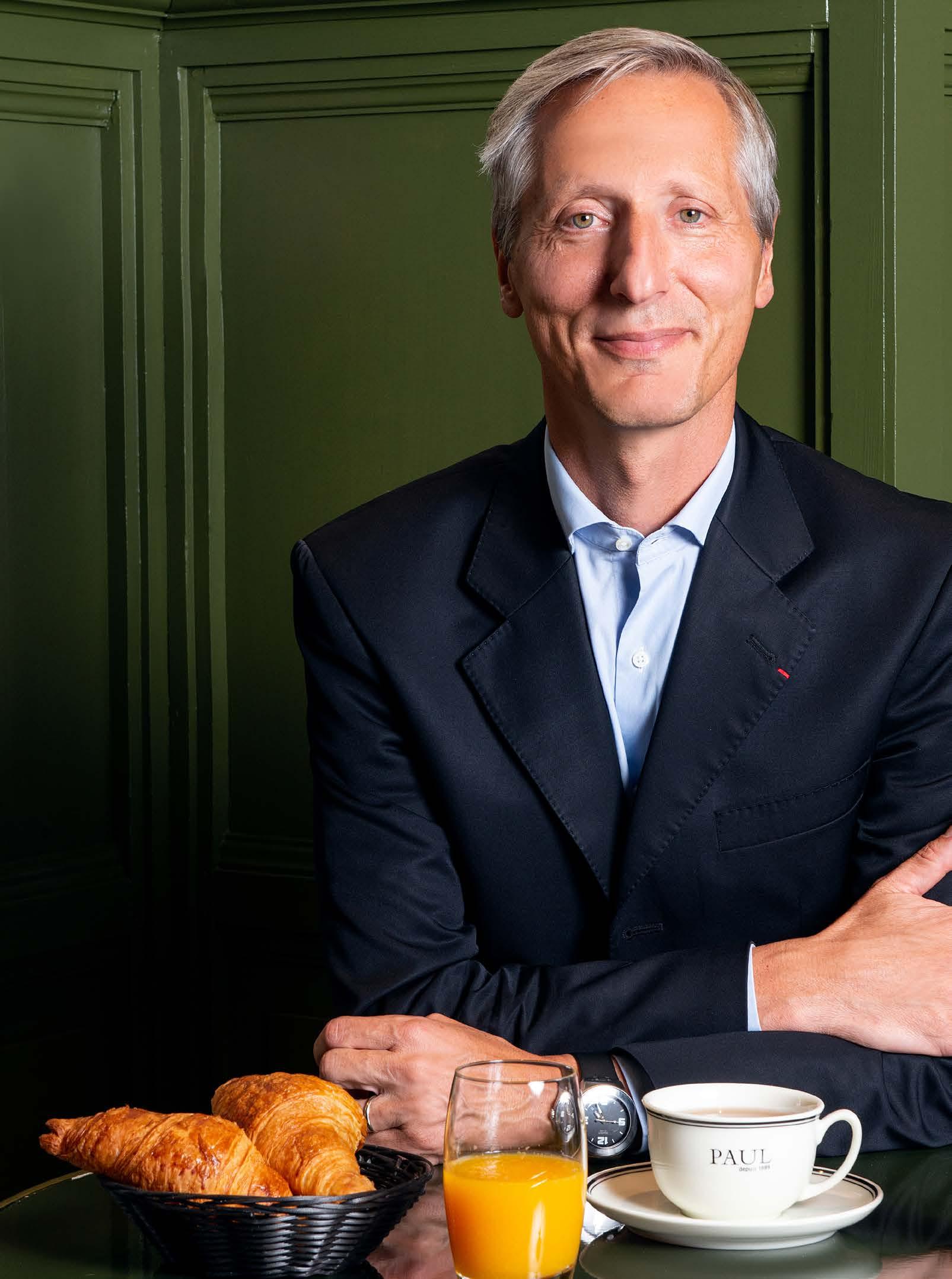

Maxime Holder, Chairman and CEO of PAUL International, on how five generations of his family built the globally renowned French chain of bakery-café restaurants.
by TAMARA PUPIC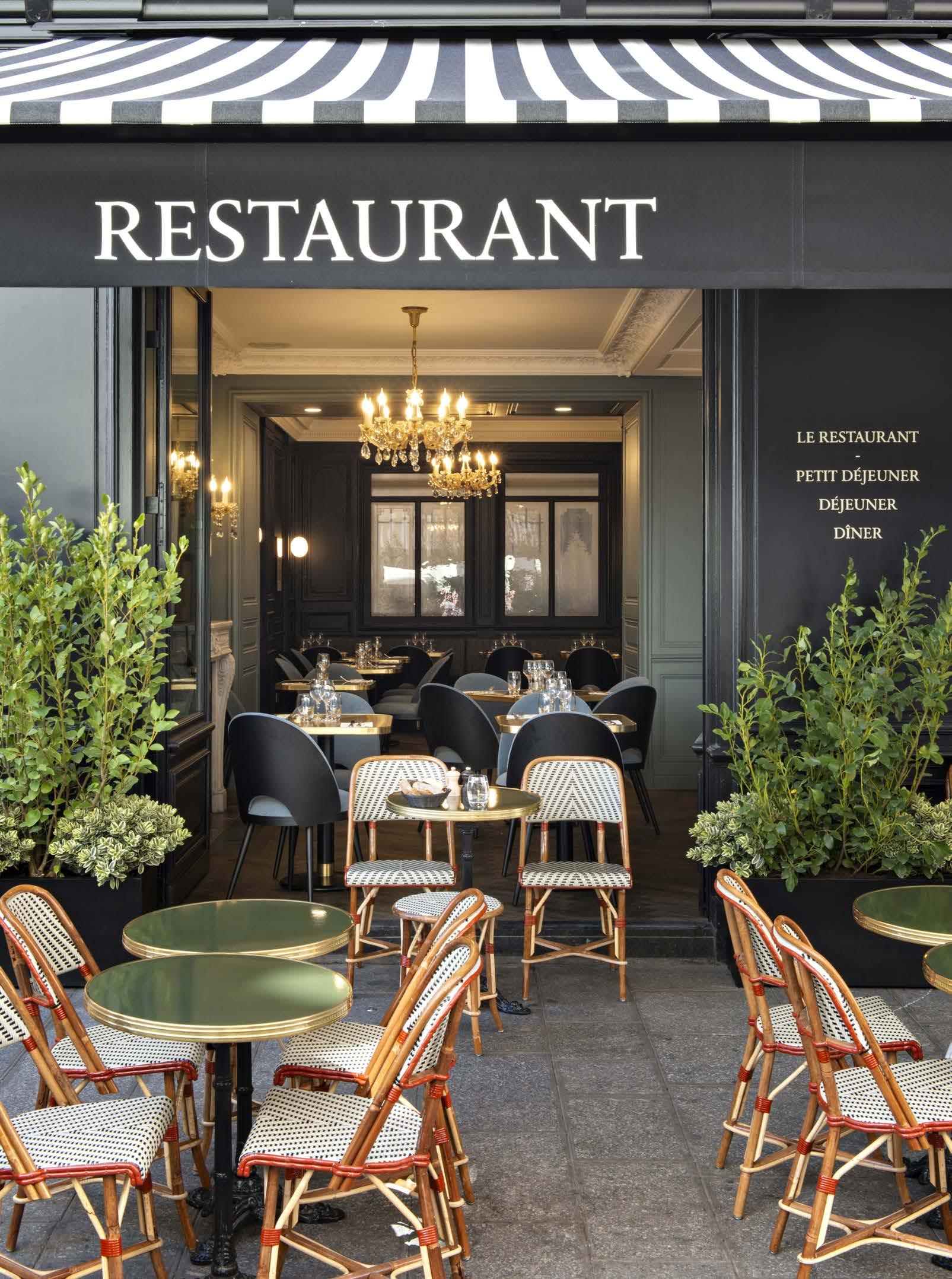
For those in the Middle East who haven’t yet had a chance to acquaint themselves with the famous French chain of bakerycafé restaurants, it would be a good idea to visit one of its venues this year- after all, the brand is celebrating its 20th anniversary of its debut in the GCC in 2003, under the banner of the UAE-headquartered lifestyle retail company, AZADEA Group.

Looking back at the brand’s 134-year-long history globally, Maxime Holder, Chairman and
} The story of PAUL has its origins in a bakery that was started by Holder’s great-great grandfather, Charlemagne Mayot, in 1889, the same year the Eiffel Tower opened to the public. This enterprise was, at the time, just a small bakery located in Rue de la Mackellerie in Croix, a town in northern France. Then, Holder’s great-grandfather, Edmond-Charlemagne Mayot, took over the business in 1908, and he did so alongside his wife, Victorine, who later gave birth to a daughter, Suzanne- Holder’s grandmother. It was then Suzanne and her husband, Julien Holder, who set up a bakery in Rue des Sarrazins in Lillie, a town just next to Croix, in 1935, and went on to take over a patisserie called PAUL, which was operating in the same locality. “They decided to keep the PAUL name,” Holder recalls. “And
when their son Francis Holder -my dad- took control in 1958, he modernized the whole operations.” Holder credits his father for playing an important role in developing the brand as we know it today- besides introducing innovations like installing a wood-fired oven that operated in full view of the customers, he was also insistent on relaunching traditional bread recipes that relied on long fermentation at a time when the quicker-to-make white bread variety was the popular choice. “This return to tradition immediately appealed to customers, and it was a key part in our success,” Holder adds.
} And it’s been a triumph all right- since the launch of its first bakery 134 years ago, PAUL now has 797 of its storefronts spread across 52 countries around the world, with Holder
CEO of PAUL International, says that one particular trait connects all the family members who have led the brand over the years. “I think, looking at the story and knowing the backgrounds of each of my family members, one of the common features that run through us all is probably our willingness to adapt,” he says. “Whether it was my grandfather taking over the first PAUL, but deciding to retain the name, or my father opening subsidiaries in the first mall in France, or expanding into Japan in the late 80s, they all appreciated growth opportunities. And, in that regard, I am no different.”
now sitting at the helm of it all. While one could say that he has been involved in this business practically since birth, Holder cut his teeth in the enterprise by
opening the first PAUL in London in 2000, and he went on to be appointed the CEO of PAUL International in 2007. When asked about how he goes about
I THINK, LOOKING AT THE STORY AND KNOWING THE BACKGROUNDS OF EACH OF MY FAMILY MEMBERS, ONE OF THE COMMON FEATURES THAT RUN THROUGH US ALL IS PROBABLY OUR WILLINGNESS TO ADAPT.
managing this mammoth enterprise, Holder replies, “I have a team of 10 people, and each member plays an important role to ensure the smooth operations of the business as a whole. As you can imagine, my schedule is busy, as I’m regularly in meetings to determine growth strategy, and where we can take the brand next. I think as a CEO, it’s really important to understand each facet of the company, and it’s something I really pride myself in– the fact that I’m aware of what’s going on in each division of the business. One of the most challenging parts of my role I think is keeping up to date with the ever-changing consumer landscape. Trends are consistently changing, and markets are developing rapidly, so keeping at the forefront of these changes is imperative. But again, that familial ability and willingness to adapt keeps me in good stead.”
} Holder also pays significant attention to the unique challenges that PAUL might encounter owing to it being a familyrun business. “Family businesses serve as the backbone of the hospitality industry, and to ensure their success, there’s several factors at play,” Holder says. “Obviously, family dynamics are a key feature in the day-to-day operations of running the business, and
that can be a blessing, but it can also raise issues. As a way of combating such potential problems, it’s vital to be able to separate relationships between work and family. Also, communication- it’s a significant facet of any working environment; however, in a family-run business, it’s even more so.” Another
potentially risky area, Holder adds, is navigating the brand’s exponential growth. “Expansion is, of course, exciting, but it can be difficult to steer at certain times, due to the complexity of development,” he says. “Then, when you throw the idea of a family business into the mix, I’d say the pressure of succeed-
ing is heightened. A personal challenge of mine is also to ensure the next generation is powered to succeed by continuing to elevate the brand to new heights.”
} Having overseen the launch of the latest of PAUL’s outlets in Italy in July this year, Holder is now getting set for the opening of new venues in 10 more countries. As for the Middle East, Holder notes that besides celebrating its 20th anniversary in the region this year, PAUL will also be concentrating on expanding its stores across the region,
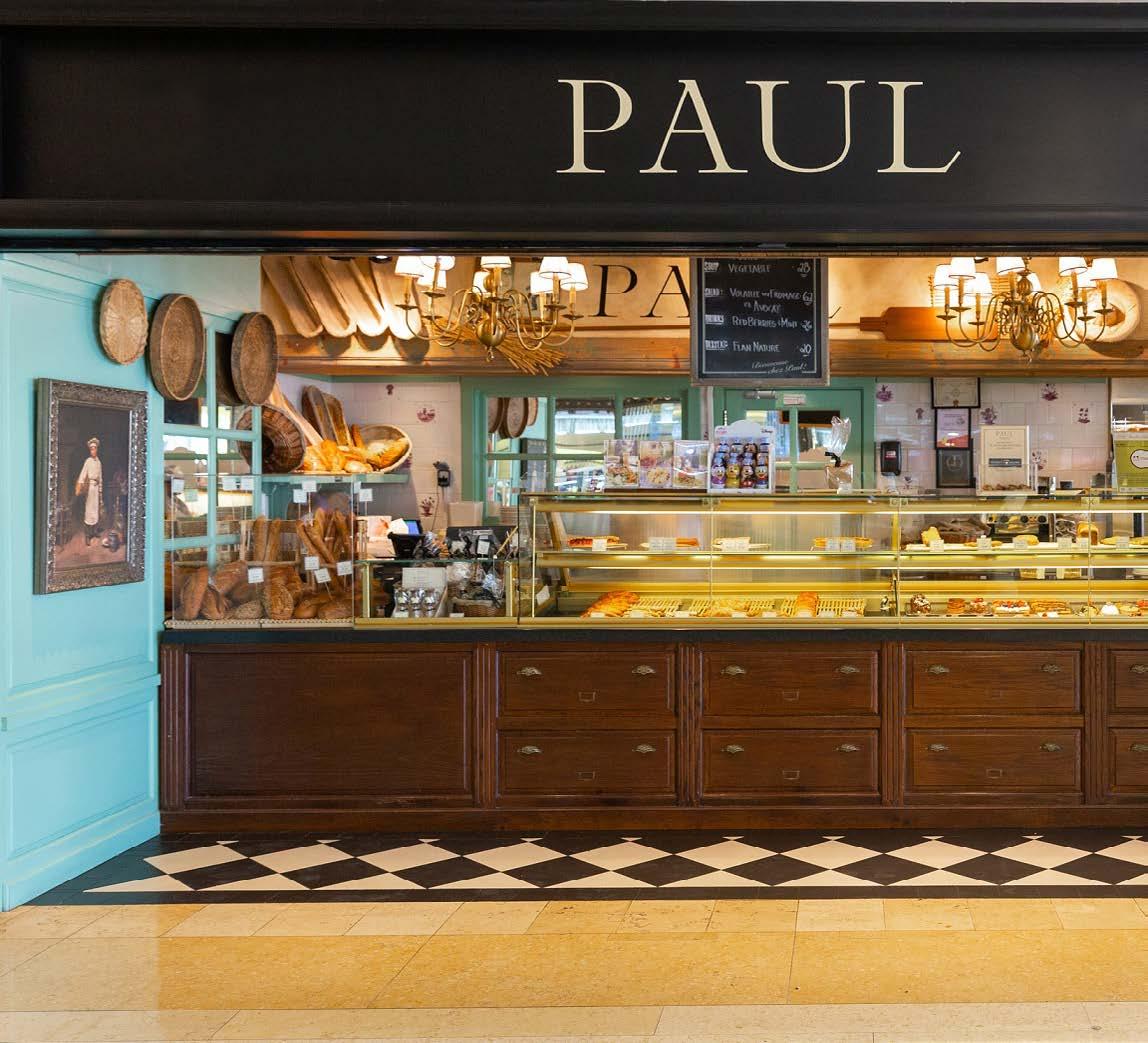
TRENDS ARE CONSISTENTLY CHANGING, AND MARKETS ARE DEVELOPING RAPIDLY, SO KEEPING AT THE FOREFRONT OF THESE CHANGES IS IMPERATIVE. BUT AGAIN, THAT FAMILIAL ABILITY AND WILLINGNESS TO ADAPT KEEPS ME IN GOOD STEAD.
→ Holder cut his teeth in the enterprise by opening the first PAUL in London in 2000, and he went on to be appointed the CEO of PAUL International in 2007.
which, by the way, has been one of the brand’s key markets. “PAUL’s success in the region is predominantly down to knowing the environment inside and out,” Holder says. “When we first launched in the region 20 years ago, our existing business model was reviewed entirely, and adjusted to meet the region’s customer requirements. That expansion was dependent on establishing the brand based on a reputation we had gained internationally– PAUL is a renowned brand not only for its inclusive menu offerings, but also because of the warm hospitality provided.” And according to Holder, it’s this adherence to the brand’s history and heritage that will stand PAUL in good stead as it looks to pursue further growth in the long term.
“You often see some multi-national chains losing that traditional, family feel once expansion takes place, but at PAUL, I think that’s one of the things we truly pride ourselves inour ability to retain that,” Holder concludes.
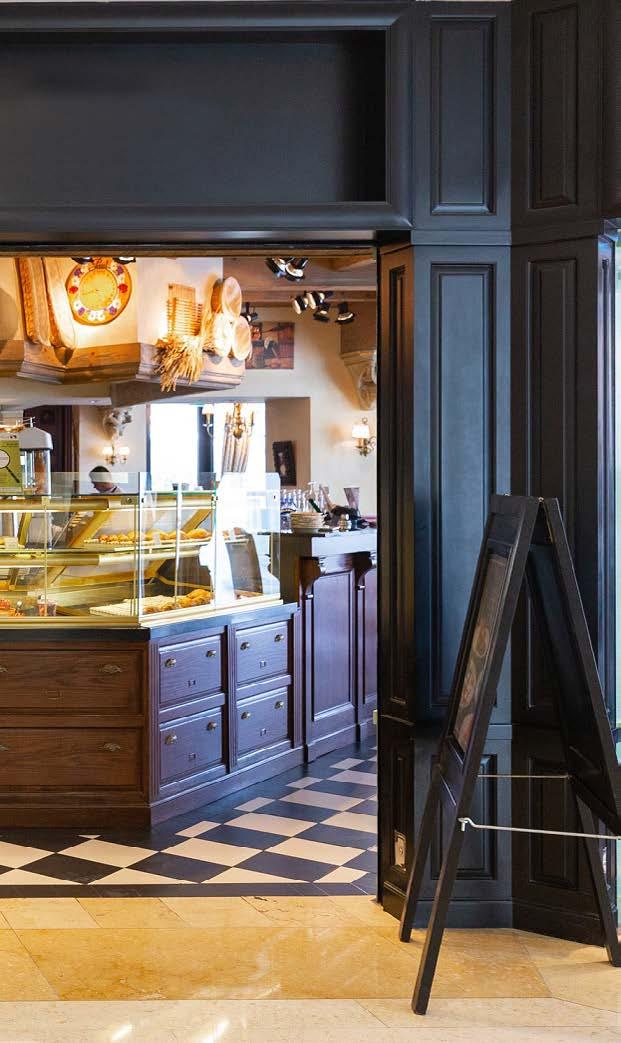

PAUL International Chairman and CEO Maxime Holder on what it takes for a brand to become a global success story

}Communication “Communication needs to be the focal point at any company, in particular those that are expanding. Great communication is a vital asset between all parties, both internally and externally to continue the development of a brand.”
}Building a strong team “With many moving parts of a global business, including different time zones, it’s critical that the depth of the team is strong and staff are able to confidently delegate, manage others effectively, and are efficient in getting things done.
}Knowing your customer and market, “Without doing strategic research and building your company around this, it really will prove near impossible to succeed in a global market.”
Wellfit CEO Dr. Dimitri Koutsoubakis is leading his startup to become the region’s biggest fitness brand with a valuation of US$300 million
by ABY SAM THOMAS
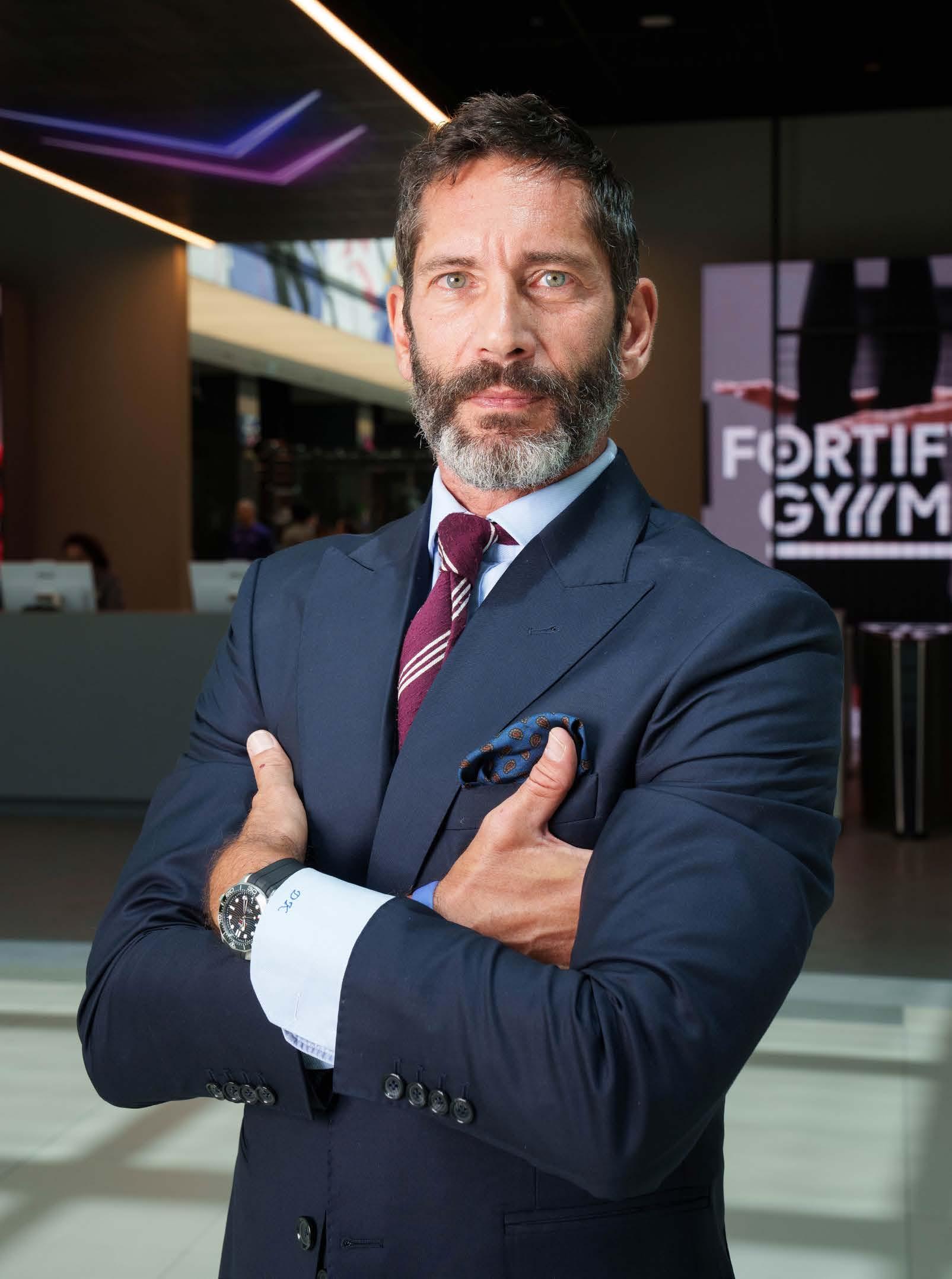
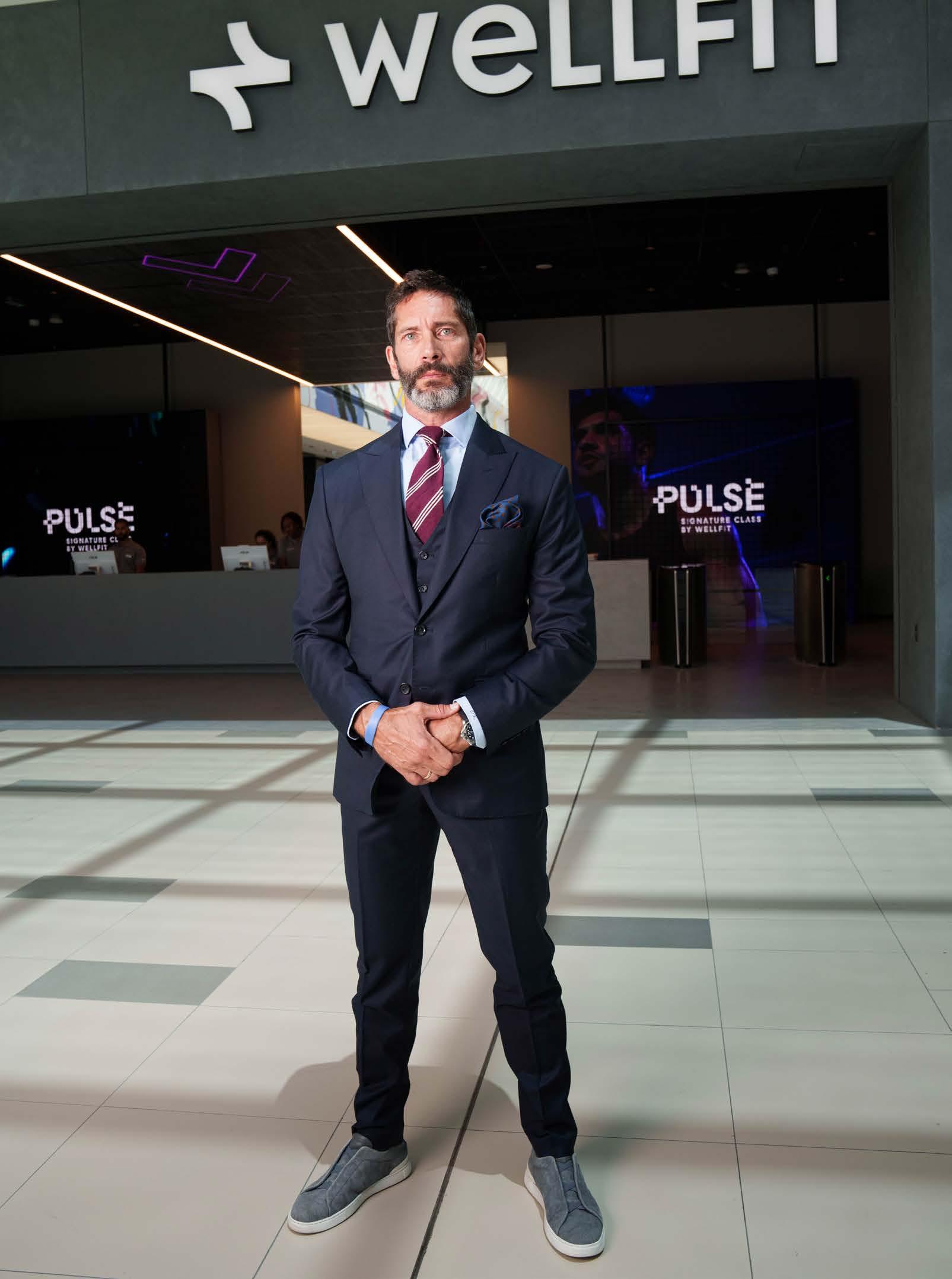
It’s easy to say it conceptually- you could say that at the end of the day, it’s just a bunch of sports. But why don’t you see competitors doing what we’re doing?”
→ Wellfit’s membership numbers have already reached 10,000, a number that is set to grow significantly as new locations come online.
Dubai’s Jumeirah Village Circle (JVC) district might seem like an unlikely venue for a startup revolution, but it was here in November 2021 that the UAE’s newest fitness brand, Wellfit, opened its first club. At over 75,000 sq. ft. in size, Wellfit’s JVC branch could be described as a statement of intent in itself. Billed as Dubai’s largest indoor multi-sports venue, it covers the entire top floor of the local shopping centre, Circle Mall.
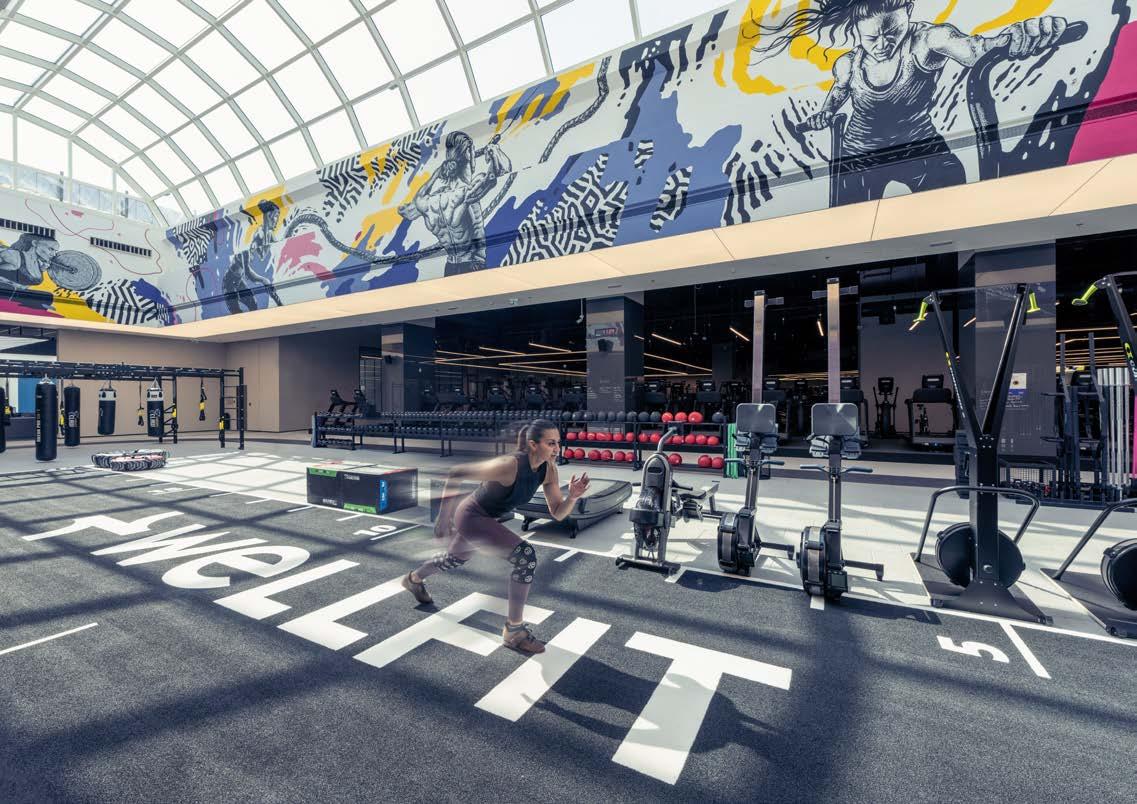
However, for Dr. Dimitri Koutsoubakis, CEO of Wellfit, the JVC branch is just the start of the story. Part of UAE-based master developer Arada’s growing portfolio of brands, Wellfit seems to be proof that an immaculately run fitness business is not just good for its members’ well-being, it’s also healthy for the bottom line as well. With membership numbers growing rapidly and per-club revenues reaching record
levels for the local industry, Wellfit is aiming for an impressively high valuation in just a few years’ time.
“It’s easy to say it conceptually- you could say that at the end of the day, it’s just a bunch of sports,” smiles Koutsoubakis. “But why don’t you see competitors doing what we’re doing? You have to have a rare ability to bring together a United Nations of sports and activities, and it’s not easy to bring together the disparate assets and expertise. There are operators that do this worldwide, like David Lloyd, Virgin Active, and so on, but why aren’t there more and
why aren’t they proliferating? Well, I guess because it’s difficult.”
Atour around Wellfit JVC in the company of Koutsoubakis -who has a stellar record in both the fitness industry and as a professor at local business schools- quickly reveals that this is much more than just a gym. As well as all the usual spaces set aside for weightlifting and cardio machines, there are specific areas allocated for mixed martial arts (MMA), parkour, and boxing, as well as a series of hi-tech studios and padel
tennis courts. To round the experience off, there’s also a 16,000 sq. ft. gymnastics facility, a fitness shop, and a branded healthy-eating concept, Hungry Wolves. At the same time, the tail-end of the COVID-19 pandemic hardly seems like the most auspicious time to launch a fitness brand. However, Koutsoubakis argues that this timing, amongst a series of other factors, has been instrumental in the company’s results so far. “You need a perfect storm, you need a series of variables to go in your favor,” the CEO says. “It’s post-pandemic, and people want to
YOU HAVE TO HAVE A RARE ABILITY TO BRING TOGETHER A UNITED NATIONS OF SPORTS AND ACTIVITIES, AND IT’S NOT EASY TO BRING TOGETHER THE DISPARATE ASSETS AND EXPERTISE.
get out of the house. They’re tired of their home exercise bikes, and they want to get into a gym and start training- that’s phenomenon number one. Phenomenon number two is that the competition has been taking some punches due to the shutdown, so it’s an opportune time to launch a new brand. And phenomenon number three– by reinventing your offering, you can put yourself in a place where you don’t have any competition.”
Backing up that “perfect storm” has been the UAE’s impressive economic performance, which has seen nationalities from around the world tread a path to the country thanks to favorable new business and social regulations. The way Koutsoubakis sees it, there is colossal potential for operators like Wellfit to capture market share in what is still a relatively nascent industry.
“If we look at the UAE as a whole, penetration figures -i.e. a share of the adult population that has a gym membership– is low, at about 5-6%,” he explains. “Compare that to developed markets such as Western Europe and the US, the figure is as much as 10%. So, the opportunity is there to double that penetration, especially given the high prevalence of educated expats here in the UAE.”
A further factor driving Wellfit’s results has been what Koutsoubakis refers to as a relentless focus on member experience, aided by technology. In fact, the company has achieved a number of regional firsts in the type of technology offered, including the use of artificial intelligence (AI) and machine-learning platform Keepme to boost its sales, a move that is now being copied by other major players locally. Wellfit will shortly be rolling out usage of the Shoshabi onboarding system to its members, and extensive work is currently away on the Wellfit app, which will provide a comprehensive suite of services on a par with any other fitness brand anywhere in the world by the end of the year.

Less than two years since the JVC flagship’s launch, Koutsoubakis is excited not just about the operator’s
performance so far, but also its incredible potential for the future. The numbers so far look promisingas well as Wellfit JVC, a second megaclub in Meydan is open and undergoing refurbishment, while a third at Arada’s Aljada master development in Sharjah is set to open in the last quarter of this year. Meanwhile, membership numbers have already reached 10,000, a number that is set to grow significantly as new locations come online. “This time next year, you and I will be sitting here drinking coffee, and Wellfit will be operating five megaclubs,” Koutsoubakis declares. “I feel up to 10 megaclubs in the UAE is achievable, and then, what comes next? Will it be Saudi Arabia or somewhere else in the region? I

definitely see Wellfit as an international, global brand, and Europe is in my target sights.” This is a startling level of growth for a company that is still just 19 months old, but Koutsoubakis is happy to cite some figures from Wellfit’s most recent performance, including Wellfit JVC’s revenue for 2022, which came to AED25 million. “To the best of my knowledge, the largest clubs in the UAE pre-pan-
demic never achieved annual turnover of even AED20 million,” he states. “Why? Because they are gyms, and Wellfit is not just a gym. Wellfit offers a comprehensive country club experience with a wide range of sports and leisure activities that you would more normally find in the US or European markets. We sell junior memberships, family memberships, couples’ memberships. We do martial arts, we do swimming, we do athletics. So, the gym is just the tip of the iceberg, but the real action is the families and juniors. I’ll tell you right now– the secret sauce is in the junior business.”
Proof of that approach comes from the success of Wellfit’s gymnastics academy at JVC, which, despite only launching earlier this year, is already close to capacity with over 1,000 children registered for classes. New academies focused on athletics, football, CrossFit, and swimming are shortly to open at Wellfit Meydan, a sprawling indoor-outdoor complex spread over a 368,000 sq. ft. site in

It’s early days, and you can’t get arrogant, but we’re delivering something that no-one else is delivering in this part of the world, and it’s working.”
“}
the center of one of Dubai’s fastest-growing residential communities. Koutsoubakis goes on to say that he expects Wellfit JVC’s revenue to hit AED35 million during 2023, a

figure that he expects every large-scale Wellfit club to reach and exceed once they have ramped up to full capacity, which generally takes three years to achieve. In fact, he says
that every flagship club –i.e. those with over 50,000 square feet of floor space– will generate between AED35-45 million in turnover annually.
All of this leads inevitably to a question about valuation. Perhaps unsurprisingly given the growth numbers achieved so far, the Wellfit CEO is bullish on the company’s prospects.
“If we look at our five-year plan, our goal is to be operating five megaclubs, with 30,000 members overall. Over a 10-year period, we’ll look to
open as many as 15 megaclubs, both in the UAE and elsewhere. If we then project our revenue based on those numbers, together with the profit margins we are currently seeing and a conservative earnings before interest, taxes, depreciation and amortization (EBITDA) multiple, I’m here to say that Wellfit is on track to become a $300 million company- that’s been my ambition from the get-go.” However, before that kind of valuation can be achieved, plenty of hard work is required. Right now, extensive refurbishment is ongoing at Wellfit
We’re not a franchise– we’re not copying anyone else’s recipe, this is not the Unilever or the McDonald’s recipe– this is our recipe.”
}“
IF WE LOOK AT OUR FIVE-YEAR PLAN, OUR GOAL IS TO BE OPERATING FIVE MEGACLUBS, WITH 30,000 MEMBERS OVERALL. OVER A 10-YEAR PERIOD, WE’LL LOOK TO OPEN AS MANY AS 15 MEGACLUBS, BOTH IN THE UAE AND ELSEWHERE.
Meydan, with the addition of a 200m athletics track, five-aside pitch, renovated CrossFit and martial arts spaces, and a complete revamp of all existing studios, changing facilities, and technology. That refit is scheduled to be completed in January next year. By that time, Wellfit’s third megaclub will already be open in the Madar family entertainment district in Aljada, Sharjah. Based in a 65,000 sq. ft. building designed by Zaha Hadid Architects, Wellfit Madar boasts a number of eye-popping features, including a 200-metre running track suspended halfway up the inside of the club’s elliptically shaped walls, and an interactive sports and gaming platform for children and adults called Multiball, which is coming to the region for the first time.
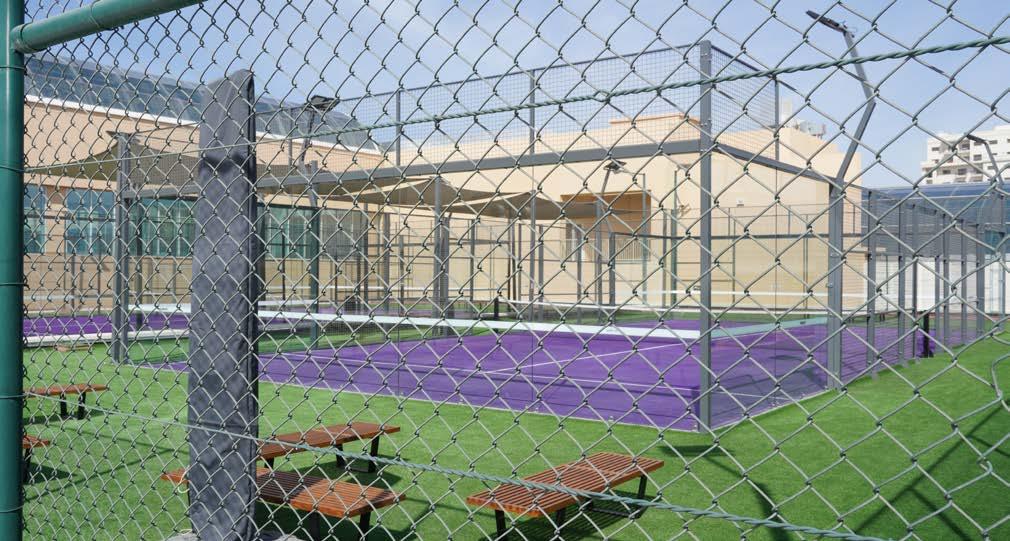

Koutsoubakis is tightlipped on the locations of the brand’s next two super clubs, but he hints that Wellfit number four is now
close to confirmation in Dubai, with Abu Dhabi a likely base for Wellfit number five. The CEO is also quick to credit Arada for Wellfit’s success, revealing that the parent company has so far invested AED150 million in the startup, with further investment on the way. Smaller Wellfit gyms are already open in two of Arada’s Sharjah communities, with a third penciled in for the developer’s first project in Dubai, Jouri Hills at Jumeirah Golf Estates. Arada has also assisted in other ways (for example, by providing a premium location in its Aljada master community), and Koutsoubakis says the relationship is working well for both parties.
“We’re not a franchise– we’re not copying anyone else’s recipe,” he says. “This is not the Unilever or the McDonald’s
recipe– this is our recipe. And Arada has afforded us the opportunity for complete carte blanche, and it’s very rare you get that. Arada insists on beautiful design and beautifully executed branding, and that’s the only area where they have had input. The Group CEO [Ahmed Alkhoshaibi] told us that the business model was ours to define, and he has been true to his word. We’ve taken the best of what worked at other places– for example, our chief operating officer Gareth Jones had worked at competing brands, and back in the day, he was a David Lloyd guy. So, you’ve got all these different elements in the DNA coming together. It’s early days, and you can’t get arrogant, but we’re delivering something that no-one else is delivering in this part of the world, and it’s working.”
}51 Different types of gym equipment at Wellfit clubs
}1,050
Number of monthly classes at Wellfit clubs (when the first three flagships are fully operational)
}700 Pieces of gym equipment at Wellfit clubs
}10
Number of sports on offer at Wellfit clubs
}10,000
Current number of members at Wellfit clubs
YOU DECIDE WHEN THE PARTY STOPS WITH 24HR FOOD & DRINK. NOW OPEN AT DUBAI D IGI TAL P ARK.

Gadgets and doodads that you might’ve missed out on, sourced by a tech aficionado. by
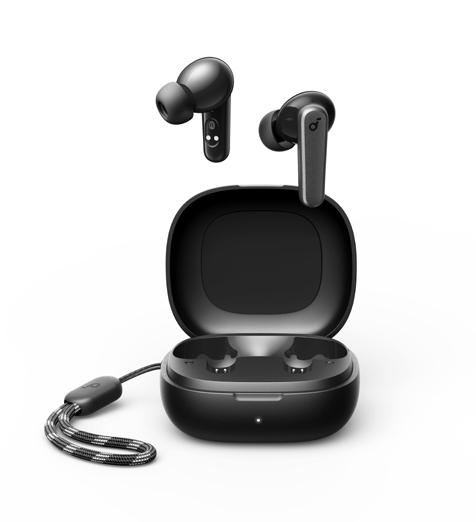 TAMARA CLARKE
TAMARA CLARKE
Oppo Pad 2 boasts a 7:5 aspect ratio display, sharing a similar aspect ratio to PCs, A4 paper, and books, and thereby offering you a familiar reading experience. The 11.61-inch high resolution screen has a resolution of 2800x2000 for ultra-clarity and enhanced image details. It supports a 144Hz ultra-high refresh rate and five levels of adaptive refresh rate adjustment for smoother visuals as well as more efficient power consumption. Oppo Pad 2 is also equipped with four symmetrical speakers with support for Dolby Vision HDR and Dolby Atmos to deliver a theater-like audiovisual experience. With Multi-Screen Connect 2.0, the tablet seamlessly connects to any smartphone using the same Oppo

account via Bluetooth, while also allowing full access to communication features such as calls, texts, and internet using the phone’s data, directly from the tablet. Multi-device interaction is thus made more convenient and efficient, supporting real-time viewing, editing, and saving of videos, photos, and files on either device. Oppo Pad 2 also features an extended battery life of up to 12.4 hours of continuous video playback on a full charge, thanks to its large 9510mAh battery, making it ideal for a long work day. Moreover, the tablet boasts the incredible 67W SUPERVOOC flash charge, which can recharge the battery back to 100% in just 81 minutes. All of these features are packed into a thin lightweight, unibody with a thickness of just 6.54mm, weighing in at just 552g.
Soundcore R50i adapts to the rhythm of your life with Bluetooth 5.3 seamless connection, allowing effortless transitions between calls, music, and podcasts. Calls get enhanced by artificial intelligence, and they are powered by dual microphones that give you crystal-clear conversations, while 30-hours of playtime ensures uninterrupted audio. In the event you need a boost, fast charging gives you two hours of playtime with just a 10-minute charge. R50i is also IPX5 water-resistant; plus, it supports Instant Pairing and Single Earbud Mode for a more convenient and flexible user experience. Meanwhile, the anti-loss lanyard keeps the earbuds safe and secure while you’re on the move. Additionally, the Soundcore app includes a "Find My Buds" feature, enabling you to locate your misplaced earbuds easily. Whether it's the soothing notes of your favorite podcast, the calming embrace of the earbud’s White Noise feature, or your carefully curated playlist, R50i lets you immerse yourself in your own personal soundtrack.
Motiv Ring is a sleek wearable that brings all of the function of a smartwatch into a small, fashionable accessory. Motiv Ring features a patented flexible circuit board, curved battery, and a tiny ring-sized heart rate sensor that literally wraps around your finger. It works with the Motiv app to give you basic fitness tracking information, and note that the Motiv Ring has three days of onboard memory without syncing, which keeps it functioning even if your

phone isn’t nearby. Wrapped in a titanium shell, it’s less than 0.1 inches thick, making it both stylish and durable. It gives you three days of battery life, and it comes with an ultra-slim charging dock that plugs into any USB port, and it only takes 90 minutes to fully charge. Also, regardless of whether you’re washing your hands, showering, or relaxing in a hot tub, you don’t have to worry about your Motiv Ring- it’s fully waterproof up to 165 feet.
TAMARA CLARKE, a former software development professional, is the tech and lifestyle enthusiast behind The Global Gazette, one of the most active blogs in the Middle East. The Global Gazette has been welcomed and lauded by some of the most influential tech brands in the region. Clarke’s goal is to inform about technology and how it supports our lifestyles.
Talk to her on Twitter @TAMARACLARKE theglobalgazette.com

From better goods to better wardrobe bests, every issue, we choose a few items that make the approved executive selection list. In this edition, our picks include a one-of-akind collaboration between two iconic Swiss brands, a fascinating formula from Penhaligon’s, and more.
A Hublot watch made with recycled Nespresso aluminium capsules and used coffee grounds? As far-fetched as that description may seem, that’s exactly what you are getting with Hublot’s Big Bang Unico Nespresso Origin- and that’s all thanks to the pioneering spirit showcased by these two iconic Swiss brands. Used coffee grounds are used to craft the strap of the timepiece, while the aluminium capsules -fused with recycled aluminium- become its case, bezel, crown, and pusher. Meanwhile, the watch’s vibrant green color is a nod to Nespresso’s Master Origins Peru Organic capsule, and the brand’s signature “N” is also engraved on its crown. Also, note the Hublot Greenbox case that will be housing this timepiece- it’s a brand-new case developed by the watchmaking manufacturer that will now be used for all its watch collections in the future. Created entirely from oak, it is carved from mostly massive, traceable wood, whose sourcing and manufacture both promote short supply chains, and it has also been designed to be a reusable item, with 98% of its removable interior made from ecofriendly and recycled components. hublot.com

Oh, the audacity of British perfume house Penhaligon’s to release a fragrance called Eau The Audacity!


Billed as a “concoction of courage,” this creation from Penhaligon’s new Potions & Remedies collection hopes to direct us on “a one-way path to the discovery of new sensations, to intense delights,
to new horizons of unimagined pleasure.” With black pepper and orange blossom ruling its head notes, incense and saffron at its heart, and vanilla and leather at its base, a spritz of Eau The Audacity may be just what you need the next time you’re daring greatly. penhaligons.com
Looking for a way to jazz up your suit? Then consider investing in this Praying Mantis brooch from the Turkey-based jewelry label, Begüm Khan. The Praying Mantis is the newest addition to Begüm Khan’s Icons collection, which is known for introducing a variety of animals with distinct characteristics to the high fashion scene, and this particular design is an ode to the creature that’s a symbol for strength and independence in different cultures around the world. Pinning this brooch to your suit will thus certainly up your style quotient- and it’s probably one of the easiest ways to spruce up your look as well. begumkhan.com



Inspired by the duffle bag, this backpack from the Autumn-Winter 2023 Objets collection of French luxury design house Hermès has caught our eye. Designed for comfort, its wide-sheathed strap can be adjusted using the two rings, allowing

How mothers juggle parenthood and entrepreneurship is a timeless question. Yet, it seems more pertinent after the COVID-19 crisis, because the pandemic brought about two inter-connected phenomena. Firstly, it caused numerous challenges to women’s careers, urging them to seek more flexibility through entrepreneurship, and secondly, it encouraged a rapid digital transformation that unleashed a plethora of new business opportunities for aspiring entrepreneurs.
Therefore, it is little wonder why, for example in the UAE, LinkedIn’s data published in the World Economic Forum’s 2022 Global Gender Gap Report stated that female entrepreneurship in the UAE grew 68% after the pandemic struck. Arising from this is the question of whether -and if so, how- entrepreneurship enables women in the UAE to have a healthier work-life and work-motherhood balance.
Ludmila Yamalova, founder and Managing Partner of Dubai-based law practice, HPL Yamalova & Plewka, and a mother of two, considers herself “extremely fortunate in
being an entrepreneur and a mother in the UAE.”

According to Yamalova, “UAE maternity polices may appear insufficient for many, but in relative terms, they are more generous than in the US, for example, where there is no national statutory paid maternity, paternity, or parental leave in the private sector. In other words, no guaranteed maternity leave. Employers can provide it, but are not obligated. In the UAE, depending on the circumstances, there is 90 days of paid leave, plus unpaid leave and other benefits.”
Maternity leave policies in the UAE are determined by the country’s Labor Law No. 33 of 2021, which came into effect in February 2022. It increased maternity leave to 60 days, 45 of which are at full-pay, and 15 days at half-pay. The law also envisages maternity leave to be available after the first six months of pregnancy in cases of miscarriages or death of newborns. In addition, maternity leave can be further extended by 30 days at full pay, and an additional 30 days at no pay, in the cases of mothers needing to care for children who are sick, or children of determination. Besides that, for a period of six months
after returning from maternity leave, a woman is entitled to up to one hour per day to feed her child.
} Here, Yamalova points out that the law expressly prohibits companies from terminating or discriminating women on the grounds of either pregnancy or maternity. However, as a practicing lawyer in the UAE, she admits to having witnessed employer behaviors that don’t fall within these norms. “One particular issue, which we have seen come up a few times in the recent years is with regards to single moms,” she notes. “Until recently, it was more difficult for single mothers to sponsor their children, for immigration purposes. The immigration laws have changed recently, making it easier for single mothers to sponsor their children… Another issue we’ve seen is employers often claiming that without a marriage certificate, employees are not entitled to maternity benefits under the UAE laws. This is simply not true. The UAE laws do not, in any way, make any type of maternity or parental benefits be conditional on a marriage. Mothers, married or unmarried, are treated
the same, in terms of employment benefits. Similarly, health insurance providers often claim that, without a marriage certificate, there is no maternity or baby insurance coverage. In doing so, they rely on some alleged law and/or policy. This too is incorrect. There is no law preventing insurance companies from offering maternity or baby coverage for unmarried mothers. And I have yet to see an insurance policy, which expressly includes such a condition.”
} In Saudi Arabia, female workers are entitled to full-term maternity leave of 10 weeks, which can be
extended for one unpaid month. Bahrain allows 60 fully paid days of maternal leave, which is applicable from the first day of the birth of a child; once the mother returns back to work, she is also allowed a daily two-hour breastfeeding leave. In Qatar, female employees are entitled to receive a 100% paid maternity leave for 50 days, while Kuwait envisages 30 fully paid leave days before, and 40 fully paid leave days after giving birth. All GCC countries envision extensions of paid maternity leave to care for a sick child, and also forbid employers from terminating or nullifying the working contract of a
UAE MATERNITY POLICES MAY APPEAR INSUFFICIENT FOR MANY, BUT IN RELATIVE TERMS, THEY ARE MORE GENEROUS THAN IN THE US, FOR EXAMPLE, WHERE THERE IS NO NATIONAL STATUTORY PAID MATERNITY, PATERNITY, OR PARENTAL LEAVE IN THE PRIVATE SECTOR.”
female worker for using the complete period of maternity leave, or in other cases, during the time period of the maternity leave. Not to overlook paternity leave policies in the GCC countries, in the UAE, Article 32 of the UAE Labor Law allows fathers a right to paternity leave of five days, within the six months of child’s birth. New fathers get three fully paid days of paternity leave in Saudi Arabia, only one fully paid day in Bahrain, while there is no statutory paternity leave in Qatar and Kuwait.
} Since maternity leave rules are envisaged for female employees and not for female entrepreneurs, it seems interesting to check whether female employers allow themselves the same freedom as they would to their female employees. A mother of three, Erika Doyle, founder of the Dubai-based non-alcohol and halal-compliant drinks shop, Drink Dry, believes that there should be no blanket approach to all women and their pregnancy or
maternity leave requests. “Every pregnancy and every maternity leave feels different to a mum-to-be, and every woman should have a choice to decide what feels right for them, should they choose to take one month, six months, or 12 months off,” Doyle says. “I say this from a personal experience–I took six months off with my first born in the UK, and I took two days off only with my third one here in Dubai, and the most significant part here is that both choices were good choices, and they represented how I felt, and what I needed, at that time. We should allow and empower expectant mothers to create their own ideal maternity leave scenarios.”
With Houda Naji, we have an example of a woman who got back to work almost immediately after giving birth– indeed, she founded her Dubai-based digital marketing agency, Younoh, after giving birth to her second daughter. “Before my second
daughter was born, I decided to leave my job,” Naji recalls. “I wanted to spend more time with both of my daughters. It was all about making our days count, and being a close-knit family. And that is when i decided to start my business, and start learning about it via courses online and in person, as well as attending events, whenever I could, to start building a network.” Today, Naji proudly states that Younoh is a seven-figure business that employs nine people. And for her female employees, Naji ensures a three-month paid maternity leave, as well as remote working for another three months. “Working from home for an extra three months allows women the breathing room they need to deal with issues they might have in that period, without losing their sense of professional identity or purpose,” Naji explains. “This is a nice transitional period between full-time parenting and the workforce.”
Doyle also calls for adequate psychological support before and after childbirth. “The physiological support for the challenges that women face should also take into account the various cultural nuances– do certain cultures openly share about their mental struggles? Is it acceptable to discuss your mental health with strangers?” Tania Kaddoura, a Dubai-based sports physiotherapist, fitness influencer, and an ambassador of the FrontRunner community by Japanese sportwear brand Asics, and a mother of one, agrees with Doyle, adding, “The cons of being a working mother in Dubai include cultural expectations, as there may be certain expectations placed on mothers to prioritize their role as a mother over their professional aspirations. Also, the cost of living in Dubai is high, which can be a challenge for working mothers, who are trying to balance their expenses, and save money for their families.”
} Another aspect of being a working mother in the UAE is having to juggle between one’s personal and professional lives- and this seems to be a
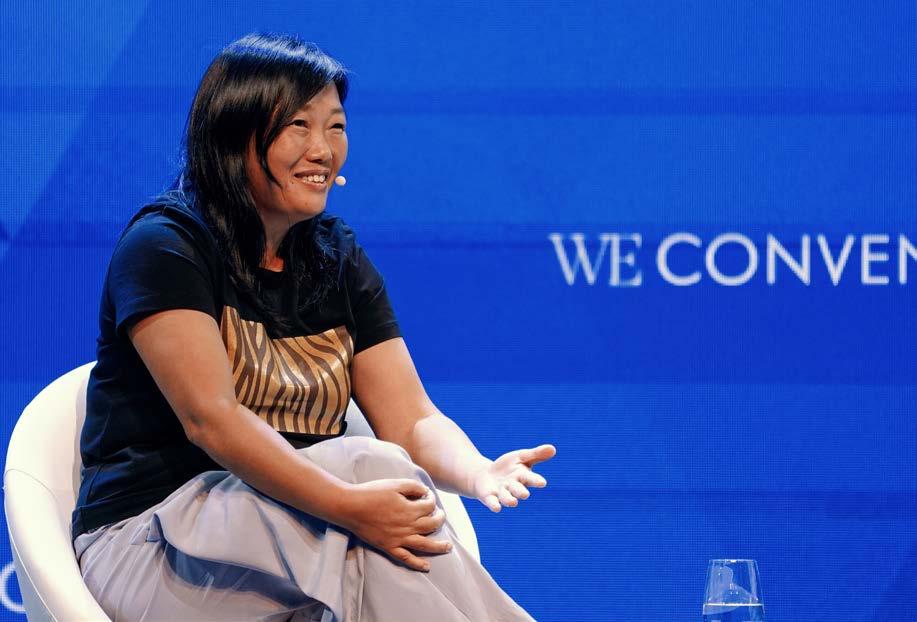
EVERY PREGNANCY AND EVERY MATERNITY LEAVE FEELS DIFFERENT TO A MUM-TO-BE, AND EVERY WOMAN SHOULD HAVE A CHOICE TO DECIDE WHAT FEELS RIGHT FOR THEM, SHOULD THEY CHOOSE TO TAKE ONE MONTH, SIX MONTHS, OR 12 MONTHS OFF.← TATYANA BAKALCHUK, founder and CEO of Wildberries, at the WE Convention in Dubai
given regardless of whether you are an employee or an entrepreneur. “The common misconception is that if you work for yourself you get to choose when and how you work, but the reality is that you simply work all the time,” Doyle says. “The lines get very blurred between your personal and professional life, and, inevitably, some parts of your life do get affected. I try to make a
} Doyle also remembers having a first interview with a potential new employee just three days before giving birth to her third child. “When we met a week later, I had already had my baby, and I was trying to be very professional so not to put him off working for a small startup run by a woman with three kids under the age of four, one of which was less than a week old, with zero
difference whenever I can to encourage and ease the life of any working mum– such as sending a quick encouraging email to a fellow mum following a corporate call where her baby was uncontrollably sobbing during her pitch!”
experience in business,” she says. “But within the first 10 minutes, we had to address the elephant in the room, as I was visibly no longer pregnant. It was quite comical though, because it was a highly unexpected situation for my colleague,
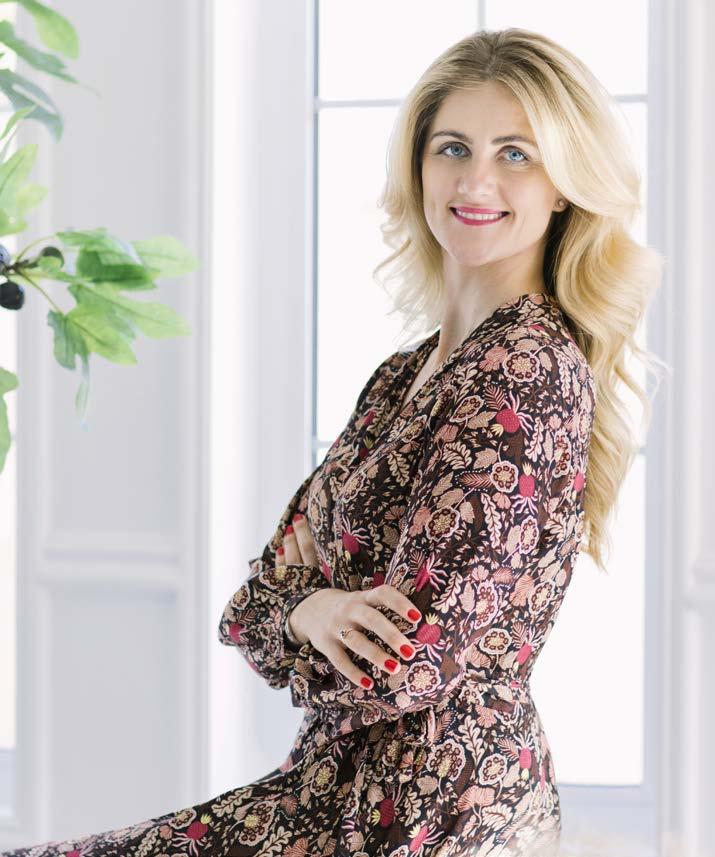
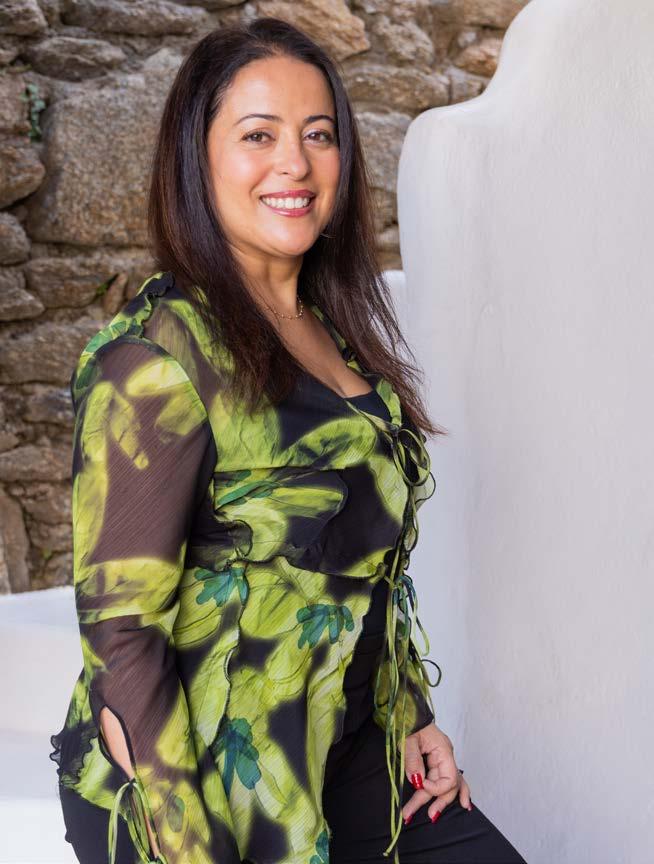
and I don’t think many men have been placed in that position.” Here, Yamalova also shares an anecdote from the time when her son was only a few months old. “I had a court appointment in the Dubai International Financial Centre (DIFC), and my son and his nanny were in the courts waiting with me, but things dragged on longer than expected, plus there were documents which I needed to update and finalize,” she says. “My son got hungry, and so, there
I was sitting in the Dubai Courts, working away, drafting, and nursing at the same time. The court personnel did not even blink. It was like business as usual.”
} Naji has a similar story to share. “When I first launched my business, I had set up a playroom specifically for my daughters and employees’ kids within my office space,” she says. “On one occasion, a client wanted to drop by for a meeting, while my kids happened to
THE CONS OF BEING A WORKING MOTHER IN DUBAI INCLUDE CULTURAL EXPECTATIONS, AS THERE MAY BE CERTAIN EXPECTATIONS PLACED ON MOTHERS TO PRIORITIZE THEIR ROLE AS A MOTHER OVER THEIR PROFESSIONAL ASPIRATIONS.”
be with me. As he walked in and noticed the playroom, he was both taken aback and genuinely impressed by the dedicated space for children. His reaction was so strong that he found it challenging to concentrate fully on our meeting agenda. He mentioned how unique and considerate the setup was, reflecting my commitment not just to my business, but also to ensuring my children’s comfort and happiness during work hours.”
} But as pleasant as this particular memory may be, Naji points out that it is not always easy to balance her role as a mother with the demands of her business. “One of my most significant challenges was maintaining connections with potential clients,” she explains. “The rhythm of business often beckoned me to attend networking events in the evenings, or required me to embark on business trips. With my young daughters at home, these tasks became incredibly challenging, if not heart-wrenching at times. I often found myself torn between the prospects of expanding my business, and the longing to be present for every bedtime story, every milestone, every tear, and every laugh. This emotional
tug-of-war often meant I had to decline opportunities, leading to missed business potentials.”
There’s a lot to learn about juggling motherhood and entrepreneurship from Tatyana Bakalchuk, the founder and CEO of Russian e-commerce retailer Wildberries, which she started up in 2004 while on maternity leave. Today, Bakalchuk is a mother of seven who is also known for being Russia’s first selfmade woman billionaire. According to Bakalchuk, there is no one-size-fits-all advice for mothers who are entrepreneurs. “The main challenge has always been the urge to do everything all the time, to combine the roles of both mother and leader,” she says. “Like any working mother, I periodically reproach myself for not spending enough time with my family. This is much easier now because of instant messaging, video conferencing, and remote work that has taken root everywhere. Now, you can work almost 24/7, and still manage to be a good mom.” That said, Bakalchuk insists that more education is needed for new parents. “I wouldn’t want to share my personal experiences, as,

basically, most new mums face the same difficulties and challenges, but I would rather draw attention to the need for educational work with future mothers and young families, because 90% of all mistakes and difficulties can be avoided if you are aware of them,” she says. “And I would like to say this to both new and future mums: do not be scared to seek help if you feel you need it, do not try to do everything at once, and trust your gut. These tips might be banal and expected, but this is exactly the case, when even simple truths must be repeated daily.”
} Yamalova also points out the need for working mothers to manage their expectations. “Accept that
we are merely human,” she says. “We take one day at a time. Try to do and be the best we can be for that one day. And be ready for storms and turbulence for the next day, but know that, that too will pass. One foot in front of the other. And then repeat. That’s life.” Meanwhile, Naji’s advice is to focus on being present rather than flawless. “Accept the messiness and uncertainty that comes with juggling parenthood and business,” she concludes. “Treasure the moments that pull you out of your routine, whether it’s a child’s giggle, a hug, or a painting made on the fly during a business call. They are gentle nudges toward remembering the bigger picture of why we put in the effort.”
TREASURE THE MOMENTS THAT PULL YOU OUT OF YOUR ROUTINE, WHETHER IT’S A CHILD’S GIGGLE, A HUG, OR A PAINTING MADE ON THE FLY DURING A BUSINESS CALL. THEY ARE GENTLE NUDGES TOWARD REMEMBERING THE BIGGER PICTURE OF WHY WE PUT IN THE EFFORT.”
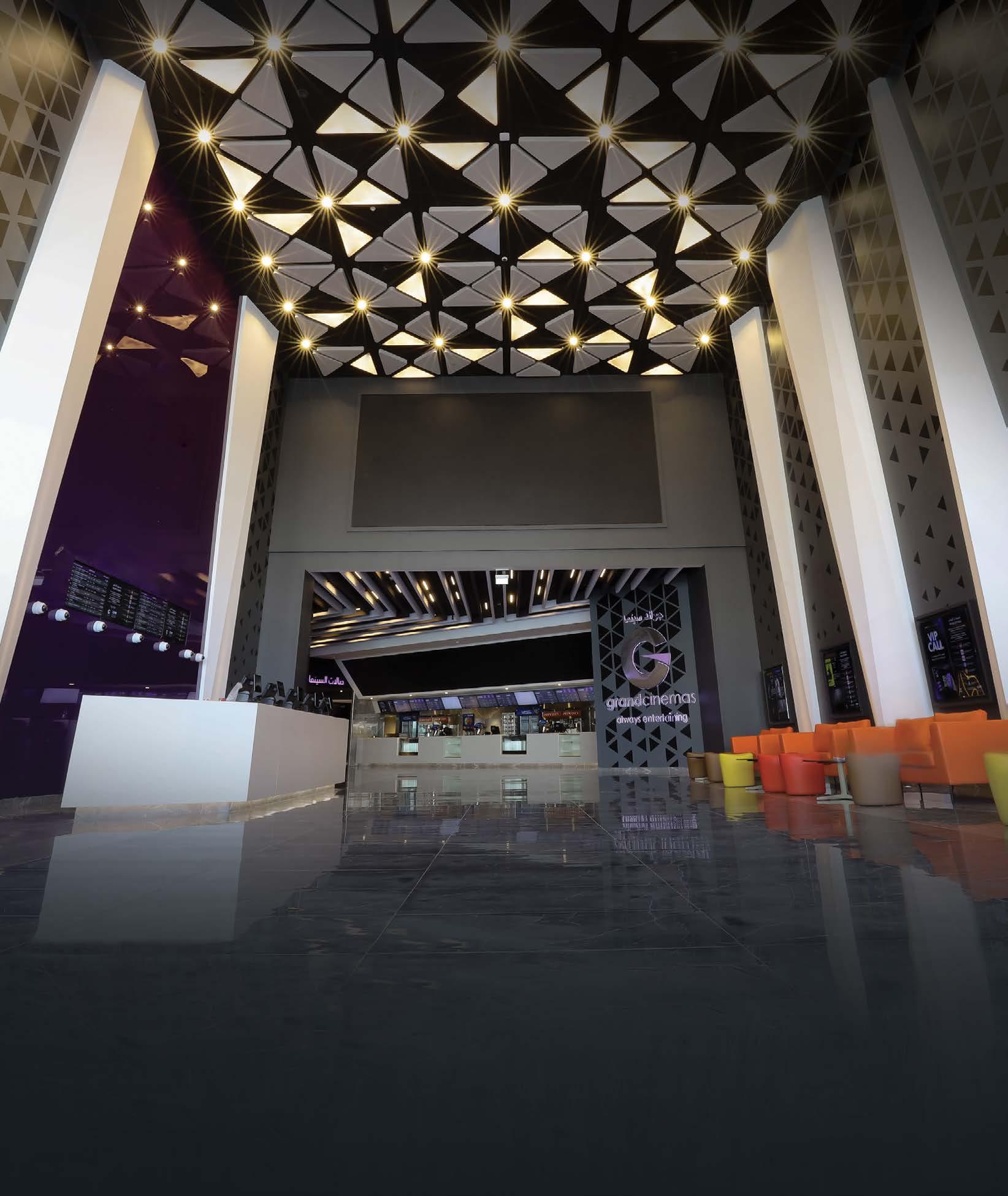





[THE HOW-TO]
Making your personality type work for you by NAHEED MAALIK

In 2018, after two solid decades of being an employee, I decided to start my own business, The Loop, a UAE-based enterprise that provides tailored solutions for communications, marketing, and public relations.
In those two decades of working for someone else, I had done everything from changing jobs and job descriptions, developing and implementing business strategies, delivering on targets, and leading and managing teams.
However, what I had not done was work alone.
What I also had not done was business development.
That said, the first few months of going out on my own were fine– there was so much to do though! From finding the correct license and visa (the visa part is a shock to the system if you’ve always been on an employment visa in the UAE) to
finetuning my business strategy, to finalizing a name, logo, and website, I wasn’t ever short of things to do through this period.
But once that was done, it was time to get to the actual work: find a paying client. Fortunately, I had the goodwill and a reputation for producing quality work with my former employers, and they were the first port of call for business development.
Getting two interesting, challenging, and financially worthy projects was a head start, but as I started the work, I realized a few things.
Working in a quiet house on my dining table wasn’t what I thought it would be. I had cut my teeth and grown professionally working in busy offices, surrounded by people, with my days interspersed with meetings (something I thought I hated), coffee breaks, and small talk.
I also had people to whom I could delegate work. For
instance, I did not have to worry about patchy internet, or the printer that wouldn’t work, or putting together countless documents that my girl or guy Friday had done until then.
I also knew that I could not continue to rely on the two former employer-turnedclients forever. I needed to “develop” business.
But the biggest challenge was the fact that I knew I was an introvert- and all those psychometric tests over the years had confirmed that. However, I also needed occasional people and conversations to get my brain working optimally. But now, with no access to preferred colleagues/work friends that I could rock on to for a quick natter, I had to find those people.
If you’ve been that quiet kid in the classroom (aka the one who avoids sitting in the front, does not raise their hand even when they know
the answer, and never knows how to respond to a compliment), getting to be an adult who’s a functional introvert is an achievement.
Indeed, I was a functional introvert. For instance, I would speak at meetings, though only after much deliberation about the quality and utility of my input. I developed and maintained cordial working relationships -and even made some friends- over my 20 years of work.
All this, however, was not good enough when you weren’t just a part of the business, but the face and the soul of one.
I was The Loop, and I couldn’t hide in my workplace sticking to the claim that developing strategies for building and enhancing brands is a back-office job.
I had to create an elevator pitch for my business, meet many new people, and work and develop meaningful engagements with some that would eventually lead to business. In short, I had to strategically develop The Loop’s brand, and I was the principal, very visible, and non-negotiable part of that strategy.
“Hell is other people”- this Sartre quote had been my mantra whenever I wanted out of a professional and personal situation that involved meeting lots of people, and making lots of small talk. Now, I had to do both: meet people in set-ups where small talk was the fuel that kept it going.
My first professional networking event was one modelled on speed dating. At the end of it, I had a parched throat, a hoarse voice, and a throbbing head after talking about my business and
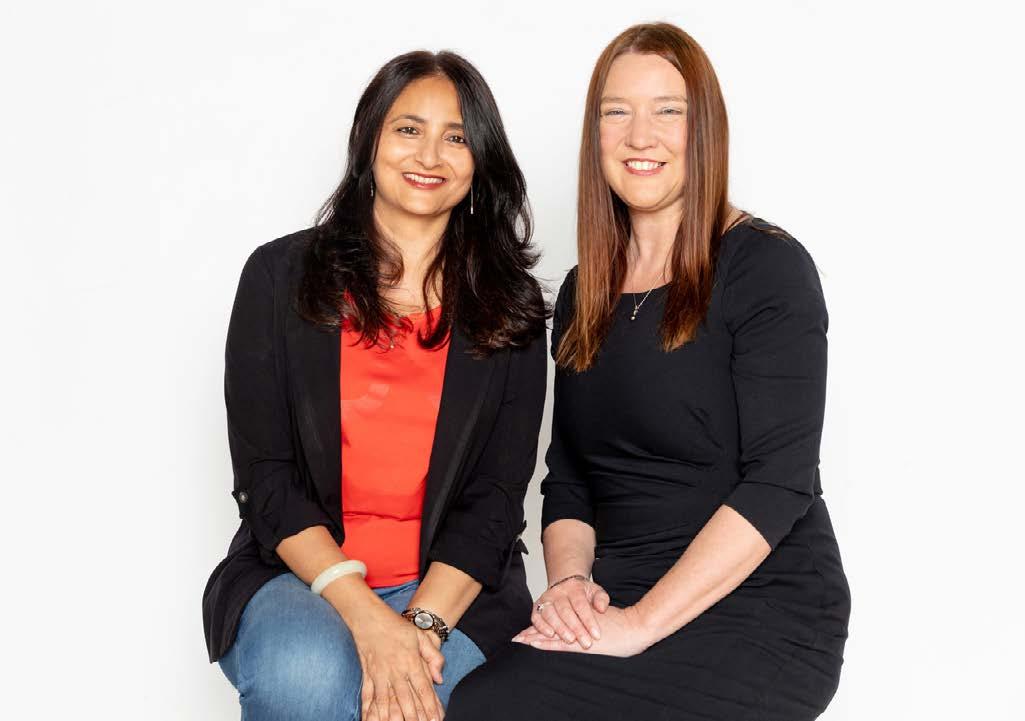
myself, while also listening to the 20+ pitches from the persons sitting across.
But this experience did introduce me to two individuals, whom I met again several times, and one later became a client, and then a friend, in that order.
It also turned out that Dubai was (and is now even more so) a hotbed of networking events- you just had to find the right fit. Several months and a dozen events later, I found a handful that I am still associated with.

Five years after its launch, The Loop has also found its niche and consolidated its vision. We know where we are headed, and how we will get there.
In these five years, only a few of our clients have directly come to us via the networks I’ve been part of. It’s been mostly word of mouth, referrals by existing happy clients that do the job.
But -and it’s a vehement but- networking has been a mainstay in both professional and personal senses. Professionally, it’s helped us build our brand, analyze what’s out in the market, find partners who complement our services, make connections that add value to our work, find stories and commentators for the media and journalists we work with, and continuously finetune what we offer.
Personally, I’ve found a tribe. Some are small business owners like myself, and we’ve shared the angst of feeling rudderless at times
and the thrill of feeling buoyant at others. A handful are now friends– the type I speak and hang out with regularly.
Looking back, though, the most crucial thing that networking did for me was that it brought me out of the self-imposed “introvert” shell. It gave me a level of sanity on days when everything seemed bleak and unworkable. And it made me an ambivert entrepreneur.
So, if you think of yourself as an introverted entrepreneur, here are my top tips -based off my own experiences- to help you navigate the landscape of business:
1/ Focus on your strengths, and use them to grow your business Introverts are focused beings prone to digging deep into any task. Thorough and meaningful research comes naturally to them. And all of these are useful strengths when you’re an entrepreneur. My research skills have helped me understand clients and their businesses, and make connections that may not be immediately visible, leading to creative content and campaigns that have served our clients well.
2/ Recharge often, and manage your energy Introverts need to balance their time with people, and their time alone. A fellow introvert entrepreneur once admitted to disappearing to go sit alone in the toilet for a
few minutes when she needed time alone at a busy event! As such, plan your week so that you keep specific days for meetings and networking events, and the rest for completing your work alone. It doesn’t necessarily mean that you have to be stuck at home- I am more productive working in cafes and co-working spaces, surrounded by a human soundtrack, but with no compulsion to join in.
3/ Work with an extroverted partner and have them supplement your weak areas Having a good business partner is a true blessing; if you are an introvert, having an extroverted business partner is the best you can hope for. This is easier said than done, as finding the right person to partner with isn’t easy. But if you do, share responsibilities, and play to your strengths. At The Loop though, we are two introverts running the show; so, we share tasks based on our strengths and our state of mind on any given day.
4/ Follow up larger networking events with one-on-one catchups If you meet 50 people at an event, you will likely want to meet less than five of them again. Meet them one-on-one; that’s what introverts are best at forming individual connections, taking deep dives into conversations, and getting to a level of understanding that’s almost impossible in larger groups. A new business is a
slow-growing tree, and meaningful engagements are like the fertilizer that helps it grow.
5/ Deal with your inner critic
The dreaded impostor syndrome sometimes hits most of us, but an introvert’s inner critic is a notch above. Introverts aspire to perfection and are self-critical. The constant self-questioning and self-doubt can pull anyone down, and with introverts, the effect is more intense, as they don’t share their angst with others. It’s a journey, but make an effort to deal with the demon, and quieten your inner critic.
To conclude, introversion and extroversion are both personality traits, and they can either be your superpowers or stumbling blocks in the world of business– after all, it’s about striking a balance between being a silent observer and a non-stop commentator. That said, soft skills including the ability to hold conversations and forming connections are vital as an employee- but they are non-negotiable when you’re an entrepreneur.
Naheed Maalik is a marketing and communications professional who moved on from an initial start in magazine journalism to a career managing communications for non-profits and then marcomms for the higher education sector. Naheed co-founded The Loop, a communications and PR agency in Dubai in 2018, and specializes in working with service providers in education, art and design, tech, publishing, and corporate training. the-loop.me
“HELL IS OTHER PEOPLE”- THIS SARTRE QUOTE HAD BEEN MY MANTRA WHENEVER I WANTED OUT OF A PROFESSIONAL AND PERSONAL SITUATION THAT INVOLVED MEETING LOTS OF PEOPLE, AND MAKING LOTS OF SMALL TALK.
It’s important growing startup ecosystems like that of the KSA foster an open narrative around mental wellbeing for entrepreneurs
by MOHAMMED ABDUL GHAFFARFrom the start of their journey, entrepreneurs are empowered -and, ultimately, expected- to achieve stratospheric success. The prevailing narrative perpetuates that by seizing the opportunity, and doing what they love, entrepreneurs can overcome all obstacles to achieve great things, while maintaining picture-perfect balance.
The Kingdom of Saudi Arabia is proving itself a fertile ground for entrepreneurs, recording a 65% increase in business ownership over the past three years. The Global Entrepreneurship Monitor reported that 90% of adults see entrepreneurship as a favorable career choice, and a third of Saudis are keen on launching a business within the next three years.
With the Kingdom providing ample opportunity and offering a promising future, navigating the rocky road to success demands more than monetary and advisory support. The entrepreneurial journey is over-idealized and simplified. The truth is that building great companies and developing visionary innovations is hard.
} Entrepreneurial success takes commitment and hard work. When fully in the throes of the ups and down of managing a startup, it easy for entrepreneurs to forget that prioritizing mental health is a priority. Mental health prevails as one of the overlooked and underrated contributors to entrepreneurial success.
It is important that when defining success, entrepreneurs take into consideration the balance between achievement, health, and well-being. There is no glamor in overworking oneself to breaking point.
Entrepreneurship has unique setbacks, but not prioritizing one’s mental well-being inhibits the right mindset to make critical decisions that spearhead the business to tremendous success.
The thrill of starting a business has a multitude of stressors, such as financial concerns and operational challenges. Couple this with uncertainty about the future, and compromised mental health becomes evident. Plus, in the GCC, public attitudes and stigma toward mental health illness prevent people from seeking psychological help, negatively impacting an individual’s life. With an increase in conversations around the topic, a safe place is evolving to discuss mental health.
Entrepreneurs are visionaries and pioneers, but they are as vulnerable as everyone else, if not more so. According to a study out of UC Berkeley, 72% of entrepreneurs have a mental health issue. Stepping back, and taking time to assess how they feel, provides a moment of solace to explore the need for seeking support.
} The concept of being highly celebrated and working hard may look motivational, but in reality, it is toxic and delusional. It is easily believable that working hard equates to high productivity, but that is not the case. The only outcome is poor mental health. Plus, the entrepreneurial universe spans not only the entrepreneurs, but also their friends, families,
colleagues, and partners. There is a pertinent need for open conversations that inspire action and change.
We live in an era where entrepreneurship has evolved as an accessible career path for people from all age groups and walks of life. For its part, the Kingdom of Saudi Arabia continues to provide opportunities for entrepreneurs such as incubators, accelerators, co-working spaces, and funding; there is a space for socially conscious entrepreneurs.
With Saudi Arabia and the world experiencing an upward curve on the entrepreneurship scale as it has the potential to bolster the economy, entrepreneurs must be provided opportunities that support their mental well-being. In 2022, the World Economic Forum ranked the Kingdom the fourth best country for entrepreneurs. With the foundations being laid and the necessary support to venture into the world of entrepreneurship provided, it is critical that identifying the daily struggles associated with entrepreneurs and uncovering ways to ensure a stable state of mind will minimize losses, both financial and health-wise, without hindering business growth.
Let us start the conversation by acknowledging that entrepreneurs need a support system, not only when they are experiencing struggles, but also success. Building a strong support network, and fostering an open narrative will only catalyze a positive dialogue, one that recognizes the importance of mental wellbeing, and actively promotes it. This will reap dividends in nurturing a generation of entrepreneurs who positively contribute to the Kingdom’s growth, without cost to their mental welfare.
Mohammed Abdul Ghaffar is the General Manager of Entrepreneurship and Social Initiatives at Community Jameel Saudi. Abdul Ghaffar is responsible for innovating and propelling new initiatives that are not only aligned with Community Jameel Saudi’s strategy, but also supporting the objectives of Saudi Vision 2030.
With over 10 years of experience in entrepreneurship, program development, and education, Abdul Ghaffar is a leader who works diligently towards objectives he feels passionately about. Abdul Ghaffar leads Community Jameel Saudi in organizing and managing entrepreneurial and social programs supporting the development of the Saudi entrepreneurship landscape. He plays a key role in driving projects and leading the way in program advisory and development. With his supervision and direction, Abdul Ghaffar ensures the project milestones are met, and that the results and impact of the initiatives are measured and evaluated. His leadership and mentoring skills are instrumental in contributing to landmark projects including the MIT Enterprise Forum startup competition, and the Tanweer Orphan Program.
Previously, Abdul Ghaffar served as MBA Program Manager at Prince Mohammed Bin Salman College of Business and Entrepreneurship, and as a Lecturer at the Royal Commission for Jubail and Yanbu. He is also a member of the Board of Directors for Balqees Saudi Construction Est. He holds a master’s degree in the science of entrepreneurship from the University of Florida. communityjameelsaudi.org
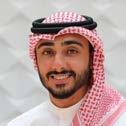
MENTAL HEALTH PREVAILS AS ONE OF THE OVERLOOKED AND UNDERRATED CONTRIBUTORS TO ENTREPRENEURIAL SUCCESS.
 by JAMES REYNOLDS
by JAMES REYNOLDS
As a go-getter running your own online business, you know that getting traffic to your website is super important. One of the key ways to do this is through something called internal linking, which is just a fancy way of saying, linking one page of your website to another.
When you do this in a smart way, it can really help boost your website’s visibility, and get people more engaged with your content. In this guide, we’ll go over all the basics of internal linking. We’ll also look at how it can give your website’s search engine optimization (SEO) a boost, helping search engines find and understand your content more effectively.
So, what exactly are internal links?
Think of them as virtual bridges that seamlessly transport users from one page to another within your website. These links are the secret sauce that ties your content together, allowing visitors to effortlessly navigate through your site’s pages, and discover more of what you have to offer.
But it doesn’t stop there- internal links have a dual role. They not only enhance user experience, but also communicate valuable information to search engines. When search engine crawlers encounter internal links, they follow them to explore and understand the structure of your website. By analyzing the anchor text -the clickable text within the link- they gain insights into the context and relevance of the linked page.
By carefully choosing descriptive and keywordrich anchor texts, you not only enhance the user experience, but also signal to search engines the topic and relevance of the linked page.
Let’s now explore the various types of internal links that can enhance your website’s structure and improve its SEO performance. Each type offers unique benefits, which can contribute to boosting your website’s visibility and user experience.
1/Body content links These are the links you find within the body of an article or webpage. They give Google
more context about the topics you’re discussing, and they are usually manually placed to provide additional information or cite sources.
2/Breadcrumb links Ever seen those handy little trails of links at the top of a website that show you where you are? Those are breadcrumb links. They not only help users navigate your site easily, but also give search engines a clear picture of how your content is organized.
3/Main navigation links
These are the links you see in the primary menu of a website. They help users find important sections like products, services, or “about” pages. While they
don’t provide as much context as body content links, they play a vital role in showing your website’s hierarchy and structure.
4/Sidebar links You’ll often find these links on blog websites, neatly tucked away in the sidebar. When used strategically, they can enhance the user experience by providing easy access to related articles or important pages. It’s like creating a curated list of must-reads for your visitors.
5/Footer links Take a look at the bottom of any webpage, and you’ll likely find footer links. They serve as a navigation aid, allowing users to discover important pages like contact information, privacy policy, disclaimers, and the ever-popular “about us” page.
6/Bookmark links These nifty links, also known as anchor links, help users jump to specific sections within the same webpage. They’re commonly used in long-form blog posts to make navigation easier, and improve the overall reading experience. Plus, they can even influence search engines to display site links in search results.
7/Next/prev links If you’ve ever come across a series of blog posts or pages with a “Next” or “Prev” button at the end, those are next/prev links. They guide readers through the series, and help search engines discover the content in a structured manner. It’s a great way to make sure your deeper content gets the attention it deserves.
Now that we’ve defined these terms, let’s explore why internal links hold such incredible power for your website.
Internal links are pretty important for your website’s SEO, and here’s why:
1/Making navigation easy Internal links are like breadcrumbs that lead your visitors from one page to another on your site. This makes it easier for them to find their way around, and encourages them to stay longer and explore more of your content.
2/Enhancing user experience If your visitors can effortlessly move around your site, and find what they’re looking for, they’re more likely to enjoy their visit. Internal links help guide visitors to relevant information and topics they might be interested in, making their experience better and boosting their engagement with your site.
3/Climbing up search rankings Search engines really appreciate websites that
are well organized and easy to navigate. By smartly using internal links, you’re telling search engines that your website is a reliable, comprehensive resource. This can help you score higher in search engine results and make your site more visible to potential visitors.
4/Creating a content hierarchy Internal links help you show which pages on your website are the most important. By linking to key pages from various parts of your site, you’re signaling their importance to both your visitors and search engines. This helps search engines figure out which pages on your site should get more attention and higher rankings.
5/Helping search engines find your content Search engines use internal links like a map to find and index new pages on your website. By linking to a page, you’re inviting search engines to come check it out. Without these links, some pages might not be found by search engines if they aren’t directly accessible from your homepage or sitemap.
Now, let’s dive into some powerful strategies and best practices for implementing internal links that will take your website to new heights. These approaches will help you maximize the benefits of internal linking and achieve remarkable results for your entrepreneurial endeavors.
1/Link with purpose First off, think of your website visitors. Whenever you’re adding links within your site, make sure they lead to something that adds value to your visitor’s experience. This could be related products, a deeper dive into a topic on your blog, or more information on what you’ve just mentioned. It’s all about making their journey through your site as enriching as possible.
2/Use keyword-rich anchor text Your links also need to tell a story. Use words that give a clear idea of what the linked page is about. This helps both your visitors and search engines understand the content. And it’s even better if those words, or “anchor text” as we call them, are rich in keywords relevant to the linked page.
3/Place links strategically Where you put your links matters. People and search engines pay more attention to links higher up on the page, so try to include them in the most prominent sections.
4/Use do-follow links Now, let’s talk about the type of links to use. You want to stick with “do-follow” links. These are the ones that share SEO value from one page to another. They’re like votes of confidence, giving your linked pages a better chance of ranking well in search results.
5/Link from your homepage Your homepage usually gets lots of attention and backlinks. Why not use this to your advantage? Share some of that popularity by linking from your homepage to other important pages on your site.
BY SMARTLY USING INTERNAL LINKS, YOU’RE TELLING SEARCH ENGINES THAT YOUR WEBSITE IS A RELIABLE, COMPREHENSIVE RESOURCE. THIS CAN HELP YOU SCORE HIGHER IN SEARCH ENGINE RESULTS AND MAKE YOUR SITE MORE VISIBLE TO POTENTIAL VISITORS.
6/Find link opportunities You don’t always have to create new content for linking. Take a look at what you’ve already got and see where you can add internal links. There’s a nifty trick for this- type “site:yourdomain. com” in search engines, and you’ll find all your pages. Go through them to find suitable places for adding links.
7/Create a well-organized site A neatly arranged site helps visitors and search engines understand your content better. Make sure to categorize your pages well.
8/Link from high traffic pages You’ve got some pages that attract a lot of visitors, and others that make the sale or get the sign-up. Linking from your hightraffic pages to your conversion pages can help turn those visits into actions.
9/Avoid overloading with links Don’t go overboard with links. Too many can be overwhelming, and that could dilute their impact. Aim for a balanced approach.
10/Use topic clusters and pillar pages Have you heard about topic clusters and pillar pages? It’s a great way to group related content and interlink them. This forms a hub of relevant info which is easier for search engines to understand, boosting visibility and ranking.
11/Prioritize your first link
Pay attention to the first link you have on a page, especially when you have several links going to the same page. Search engines place more
importance on the first link, so make sure it’s optimized with relevant keywords.
12/Don’t automate internal linking Automating your internal linking might sound convenient, but it’s better to take the time to manually place your links. This way, you can make sure they’re relevant and strategically placed. Automated tools might get a bit spammy and harm your rankings.
and interlinking pages within each silo. This makes it easier for search engines to understand how your pages relate to each other.
15/Keep checking and updating your links Keep your links up-to-date. Audit your internal links regularly and remove or update any broken or outdated ones.
really make your website shine and help your online business grow.
Don’t forget that it’s important to keep an eye on how well your internal links are doing. This lets you tweak things as needed and get the best results. So, if you’re running a business, don’t miss out on the opportunity to use internal links to get more traffic, make your website more visible, and boost your success. Jump into the amazing world of internal linking, and see where it takes your entrepreneurial journey!
SEARCH ENGINES USE INTERNAL LINKS LIKE A MAP TO FIND AND INDEX NEW PAGES ON YOUR WEBSITE. BY LINKING TO A PAGE, YOU’RE INVITING SEARCH ENGINES TO COME CHECK IT OUT.
13/Make use of user-generated content Don’t forget about user-generated content. Comments, reviews, testimonials- they can all serve as platforms for internal linking. Find those that mention other pages or products on your site, and add links there.
14/Use a silo structure A “silo structure” can also be a powerful SEO tool. It’s about grouping your content into specific categories, or silos,
16/Track and adapt Lastly, keep track of how your internal links are performing. Use analytics tools to check click-through.
To wrap things up, internal links can make a world of difference if you’re trying to get more people to visit your website. By being smart about how you use internal links and following the above strategies, you can
James Reynolds is fanatical about all things search, social, and content on the web. James is the founder of SEO Sherpa, an organic search engine marketing agency servicing enterprise clients like Pretty Little Thing, Farfetch, HSBC, Standard Chartered, Nissan, Guinness World Records, and Bulletproof.
SEO Sherpa is the 2023 Global Search Awards Best Large SEO agency, and a three-time winner of the Best Large SEO Agency winner at the MENA Search Awards. In 2019, James was awarded the title of MENA Search Personality of the Year for his outstanding contribution to the search engine marketing industry.
James regularly shares content via his SEO blog, Twitter, and LinkedIn and is a contributor to several leading publications, including Entrepreneur. James hosts the Click Jam inbound marketing event, and mentors startup companies in his free time. seosherpa.com
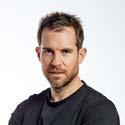


stablished in Abu Dhabi in July 2022, Ovasave is a femtech startup that is on a mission to empower women to understand and take control of their fertility. “We are driven by a strong vision to support women throughout their entire egg freezing journey, starting from testing their ovarian reserve, to the egg freezing treatment itself,” says Torkia Mahloul, the French-Arab co-founder of Ovasave.
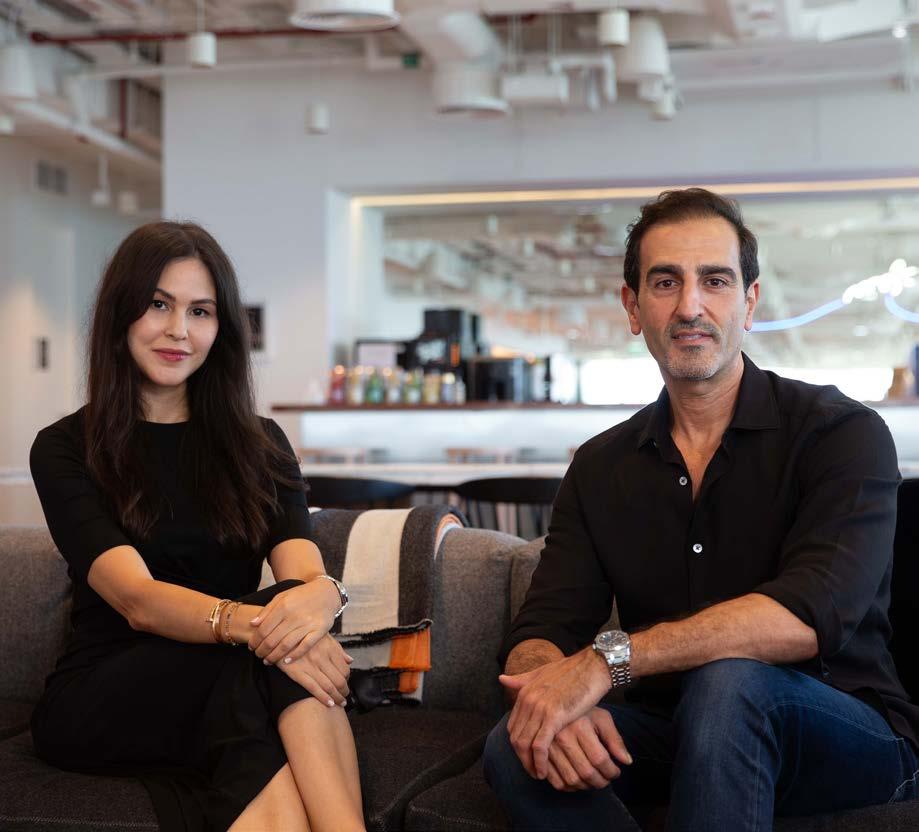
}In line with its tagline, “freeze your eggs, not your ambitions,” Ovasave is a tech platform that offers a variety of solutions for women to access seamless, integrated, and digitallyenabled fertility and egg freezing consultation services. These services
range from a home anti-müllerian hormone (AMH) test that assesses how a woman’s levels of AMH correspond to her egg count, to fertility services and egg freezing packages offered at Ovasave’s vetted network of more than 50 partner clinics in 10
countries and 20 cities. In addition to making informed decisions about their reproductive health, women also get a choice to spread the costs with Ovasave’s instalment plans.
}Before starting up Ovasave, the Insead-educated Mahloul worked in investment banking as well as in the tech startup world, which included a role at Dubai-headquartered Careem. But Mahloul admits to having always had an entrepreneurial bent of mind. “From an early stage, I knew I wanted to make a positive impact on women’s lives and solve real problems,” Mahloul says. “However, I didn’t have a clear vision of the specific problem I wanted to tackle.” It was thus through her own egg freezing journey that Mahloul understood how tedious the process can be, and thus decided to work on a better way for women like herself to gain access to fertility preservation. “My decision to establish Ovasave was heavily influenced by my own fertility experience,” she says. “I had just started a new role and moved to Dubai when a friend mentioned something that really hit me- our fertility declines quite rapidly in our mid-thirties. I was just about to turn 34, and, honestly, it [the process I had to undergo] was not only stressful, but also quite shocking. I realized that nothing in my education or personal life had ever prepared me for this reality.”
}While educating herself on this process by testing her ovarian reserve and exploring fertility options, Mahloul met Majd Abu Zan, who eventually became the co-founder of Ovasave. Abu Zan -who had 20 years of experience and knowledge of clinic operations relating to the fertility sector- joined hands with Mahloul to encourage more knowledge and a better understanding of this space across the UAE and the wider GCC region. Globally, there has been a dramatic rise in the number of women opting to freeze their eggs. In the UK, for instance, more than 4,000 patients froze their eggs in 2021, compared to 2,500 in 2019, according to the UK
IN THE UK, FOR INSTANCE, MORE THAN 4,000 PATIENTS FROZE THEIR EGGS IN 2021, COMPARED TO 2,500 IN 2019, ACCORDING TO THE UK HUMAN FERTILIZATION AND EMBRYOLOGY AUTHORITY↑ Torkia Mahloul and Majd Abu Zan, co-founders of Abu Dhabi-based femtech startup Ovasave
Human Fertilization and Embryology Authority. In the US, the Society for Assisted Reproductive Technology states that the number of healthy women freezing eggs rose to 12,438 in 2020, from 7,193 in 2016. Given that this process -and the in vitro fertilization procedure that follows- can be quite costly, women looking to start a family often opt to travel to other countries for more affordable options to do the same. This would indicate why, as per a study by Grand View Research, the global fertility tourism market is expected to grow at a rate of 30% over the next seven years. At the same time, the high costs associated with this process also explain why several companies globally -including Facebook, Apple, Uber, Google- are starting to offer sponsored fertility benefits for their employees. Here in the UAE, the country adopted a new IVF Law in 2020 that allows freezing human embryos for a period of five years for
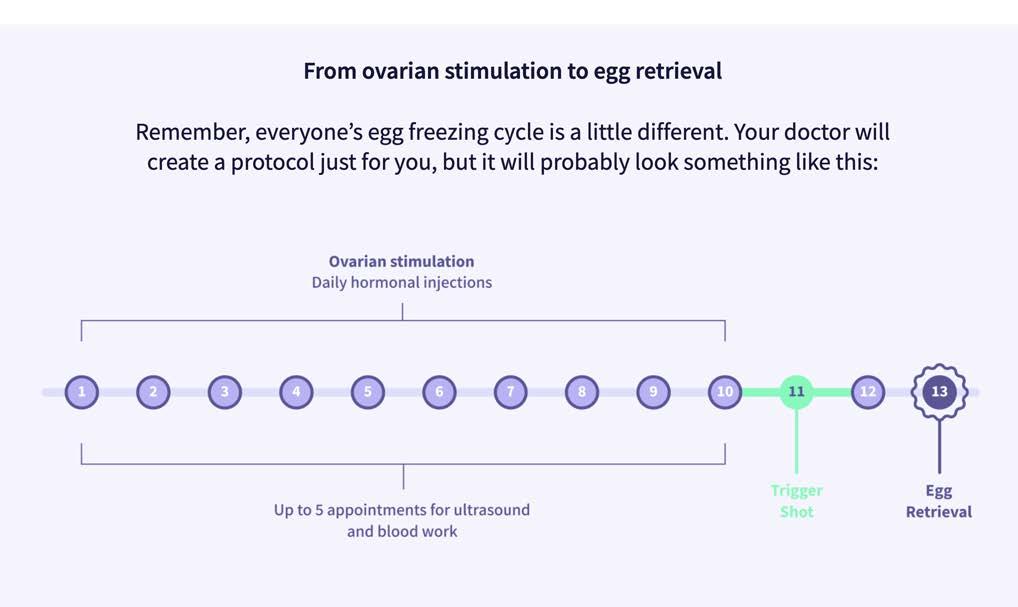
married couples, while unmarried individuals can freeze their eggs or sperm for the same period of time. Although sperm and egg donations and surrogacy are still illegal in the UAE, the more favorable fertility preservation rules have nevertheless resulted in an upward trend towards fertility preservation, including a very sharp increase in women freezing their eggs,
as noted in an Al Arabiya report in June.
}“As a French-Arab woman who has personally experienced egg freezing in both the UAE and France, I find the fertility sector in the MENA region, particularly in the UAE, to be more advanced,” Mahloul says. “While social egg freezing [i.e. the storage of the eggs of a healthy, fertile woman
in order that she has the option to have a pregnancy later in her life] has only been permitted in France since last year, it has been successfully performed for several years in the UAE. It’s also worth noting that fertility clinics in the UAE offer additional experimental treatments to enhance the egg freezing process. For instance, the platelet-rich plasma (PRP) treatment,

known as ovarian rejuvenation, helps improve the levels of the AMH hormone, which is the indicator of ovarian reserve. This procedure aims to yield more and higher-quality eggs during the egg freezing process.”
Given the availability of procedures like the aforementioned PRP treatment, Mahloul believes that the UAE (and the wider region, to a certain extent) are in tune with global trends when it comes to fertility- however, there is another pressing issue that requires attention. “In my opinion, the main concern is not the egg freezing procedure itself, as it is well-established and recognized by medical authorities as an effective way to preserve fertility, especially when performed at a younger age,” Mahloul says. “Rather, what worries me is the lack of awareness among many women about their declining fertility during their reproductive years, leading them to neglect screening their ovarian reserve in their early thirties. It’s time for this to change, and for women to take charge of their reproductive health.”
}And that’s something that Ovasave can support women with, Mahloul adds. Ovasave’s offerings start with an AMH self-test, and it can be then continued with general teleconsultations, or specific ones related to egg freezing. Then, if a woman chooses to freeze her eggs, she can opt between a package with or without medications, and the costs range from AED20,000 to AED 23,000, with the procedures done at its partner clinics in the UAE. “With our at-home fertility test, women can conveniently assess their ovarian reserve, and even have a teleconsultation with a fertility doctor, from the comfort of their own homes, all at a fraction of the usual clinic cost,” Mahloul notes. “For those who have decided to preserve their fertility, we offer egg freezing packages through our pre-vetted network of clinic partners, and women have the option to spread the cost with our flexible installment plans. By simplifying fertility testing and egg freezing, making it convenient and affordable, we are also making
OUR GOAL IS TO ENSURE THAT EVERY WOMAN HAS THE OPPORTUNITY TO MAKE INFORMED DECISIONS ABOUT HER REPRODUCTIVE HEALTH, AND ACHIEVE HER REPRODUCTIVE FREEDOM.
these essential fertility services more accessible to a broader range of women. Our goal is to ensure that every woman has the opportunity to make informed decisions about her reproductive health, and achieve her reproductive freedom.”

In less than a year since its founding, Ovasave has invested US$400,000 to cover establishment and tech development costs. “We are also fortunate to have been accepted into a number of incubators and benefited from various incentive programs,” Mahloul adds, “Most recently, we were onboarded to Abu Dhabi-based Hub71 as part of its latest cohort. By joining this vibrant ecosystem, we will be able to tap into extensive network of partners and investors. The business-friendly environment and access to a strong talent pool will play a crucial role in supporting us, as we advance our mission to empower women in their fertility journey.” Mahloul also reveals that the startup is now hoping to raise an early-stage funding amount of up to $2 million to invest in its technology and regional expansion, and it is also actively seeking developers to join its four-member team.
}As for the road ahead, Mahloul is determined for her and her team to
keep innovation at the center of all that Ovasave offers its customers. “Innovation is paramount in addressing the challenges of the fertility journey,” Mahloul declares. “As the fertility sector is characterized by manual, fragmented, and complex processes, women may face difficulties due to a lack of education, time constraints, and financial resources. By embracing digitization, we aim to bridge this gap and enhance access to fertility services, making the process simpler, more convenient, and affordable for all women.” And as she reflects on her entrepreneurial journey with Ovasave to date, Mahloul reiterates the importance of entrepreneurs truly understanding the pain points of their future customers. “To my fellow Arab female entrepreneurs, I would say there are immense opportunities in the healthcare sector; so, focus on a real problem that you know exists, or have experienced yourself,” she says. “Stay bold and stand strong behind your idea, despite any naysayers. Networking is crucial, so seek support and advice from different people, which can help shape your idea and business. Who knows, you might even find an incredible co-founder who can help turn your idea into a successful venture.”
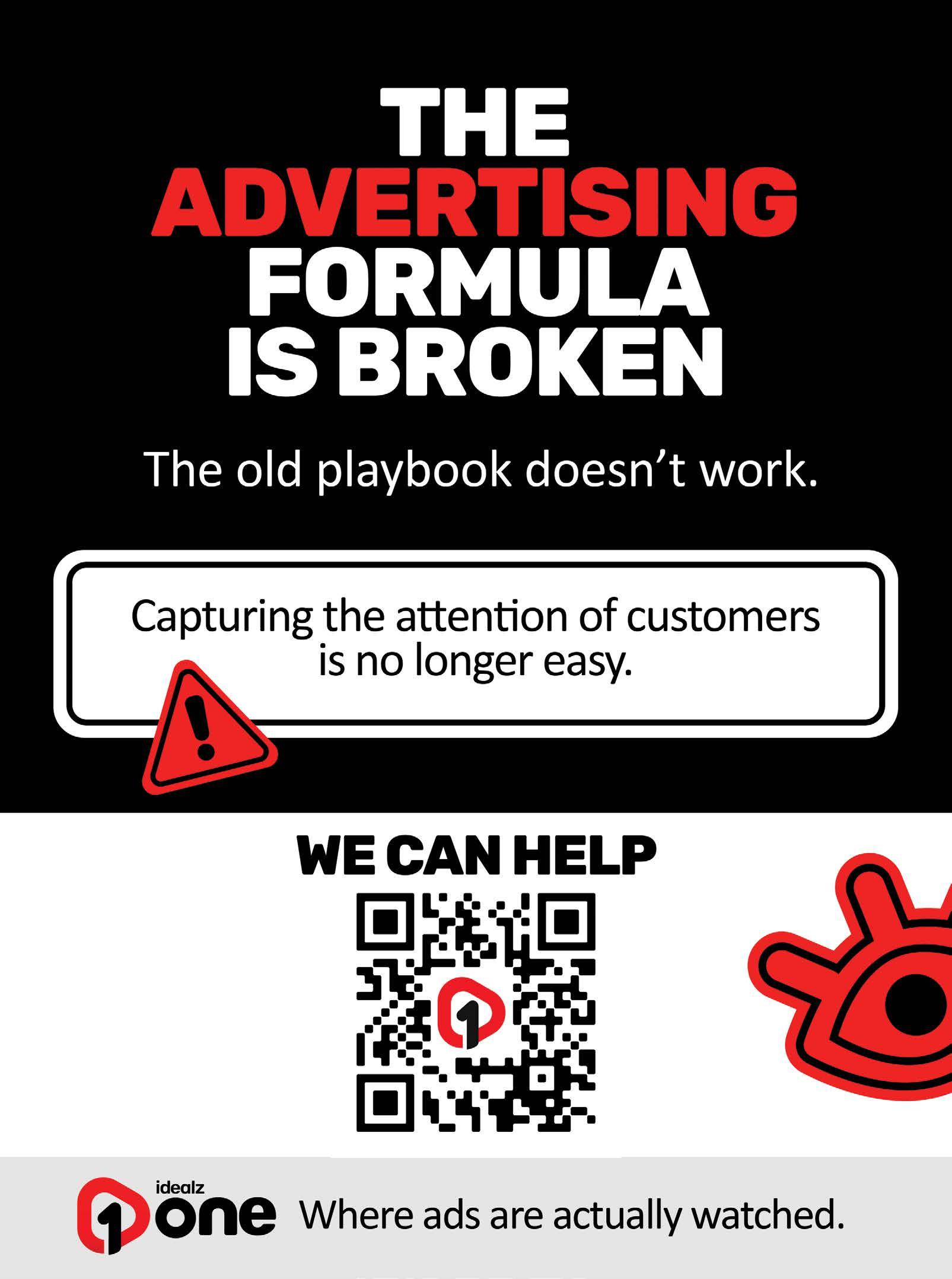
A look into how Germany-headquartered Henkel pursues its mission to be “pioneers at heart, for the good of generations” by ABY SAM THOMAS
Germany-headquartered Henkel has certainly come a long way since the business was founded in 1876 thanks to the entrepreneurial fervor of its eponymous founder, Fritz Henkel. After all, while it may have come into being as a company that sold laundry detergent, Henkel is today a multinational enterprise that holds leading positions in both consumer and industrial businesses. Its portfolio thus includes everything from, yes, laundry detergents and haircare products (aka the Henkel Consumer Brands business), to adhesives and functional coatings (aka the Henkel Adhesive Technologies business). These two business units have allowed Henkel to see sales of EUR22 billion in 2022 (with an operating profit of EUR2.3 billon), with the company -whose Düsseldorfbased headquarters I visited this summer- proudly declaring that it is “leading the way to reimagine and improve life every day.”
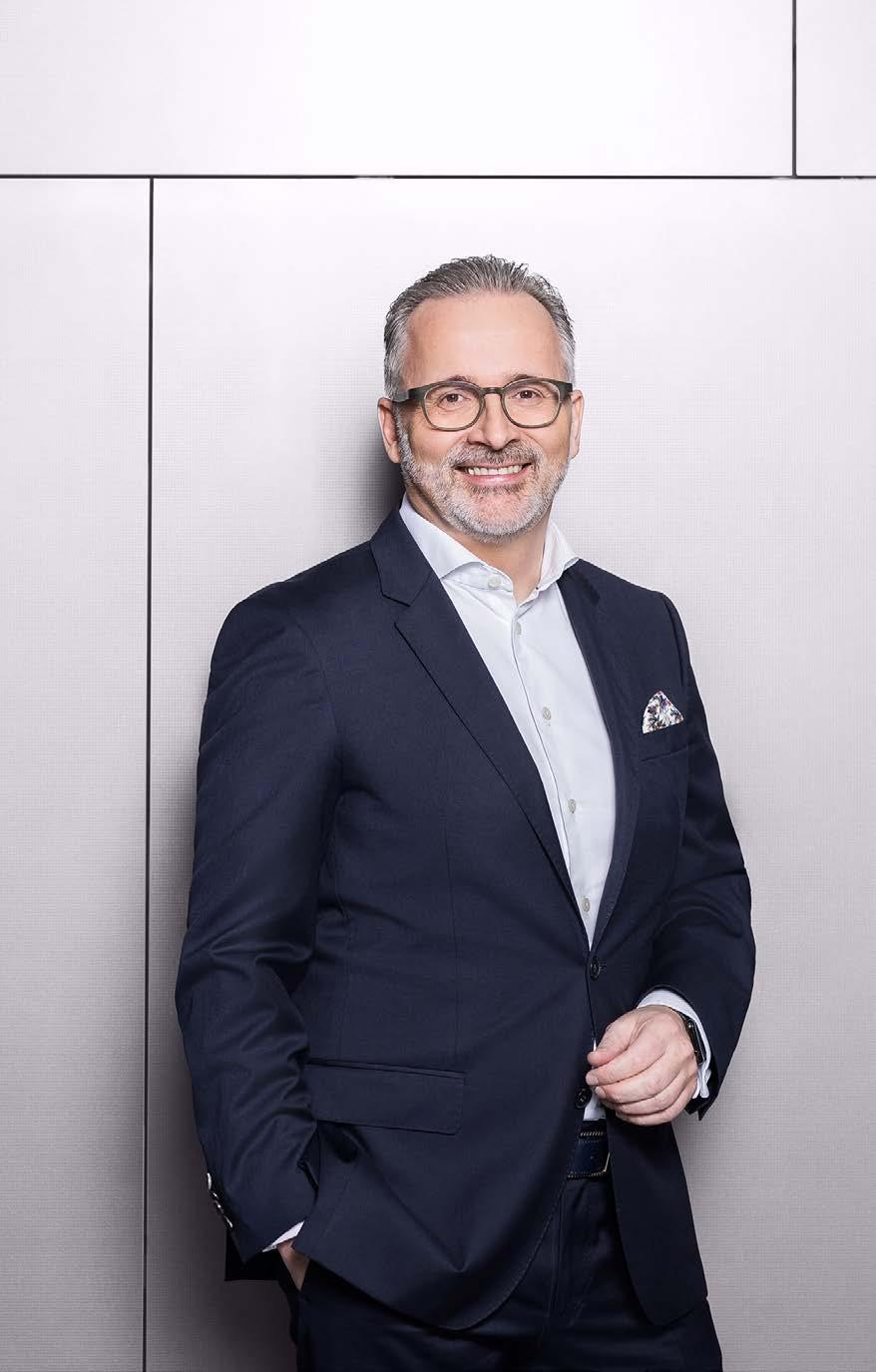
Now, it’s one thing to make a statement that underlines the importance of innovation; it’s another thing altogether to have it actually engrained within a company that’s of Henkel’s scale. Indeed, Henkel CEO Carsten Knobel confirmed this to be a challenge when I asked him during an interaction in Düsseldorf about how he goes about ensuring that his company’s culture stays true to the entrepreneurial principles with which it was founded. Knobel, who started in his current role in 2020, replied that much like other corporates, Henkel too has been on a mission to ensure its agility even as it continues to grow.
“We are on a journey,” Knobel said. “We are not there, where we want to be, but what I’ve seen is that we are changing, and that, step by step, our people are believing that they are being empowered
to showcase a more entrepreneurial spirit.”
But it’s not just an internal exercise either, Knobel added- he pointed toward Henkel’s corporate venture capital arms as a showcase of its forthright approach towards innovation, which runs under the slogan of “collaborate to innovate.” There’s Henkel dx Ventures, which is the corporate venture capital arm of Henkel Consumer Goods, while Henkel Tech Ventures represents the same for the Henkel Adhesive Technologies side of the business. Both funds were launched with a volume of EUR150 million each, with their aim declared as being to explore “new technologies, applications, and business models in areas of strategic interest to Henkel.” But then again, one doesn’t have to look too far to see examples of Henkel’s efforts at enabling

innovation- for starters, check out the Inspiration Center Düsseldorf (ICD), which the company inaugurated in 2022. Built with an investment of over EUR130 million, the ICD, which falls under the umbrella of Henkel Adhesive Technologies, is a state-of-the-art innovation and customer center spread over a floor area of 47,000 sq. m. that provides space for 30 laboratories, four technology centers, and more than 650 members of staff. In a statement released at the launch of the ICD, Knobel noted
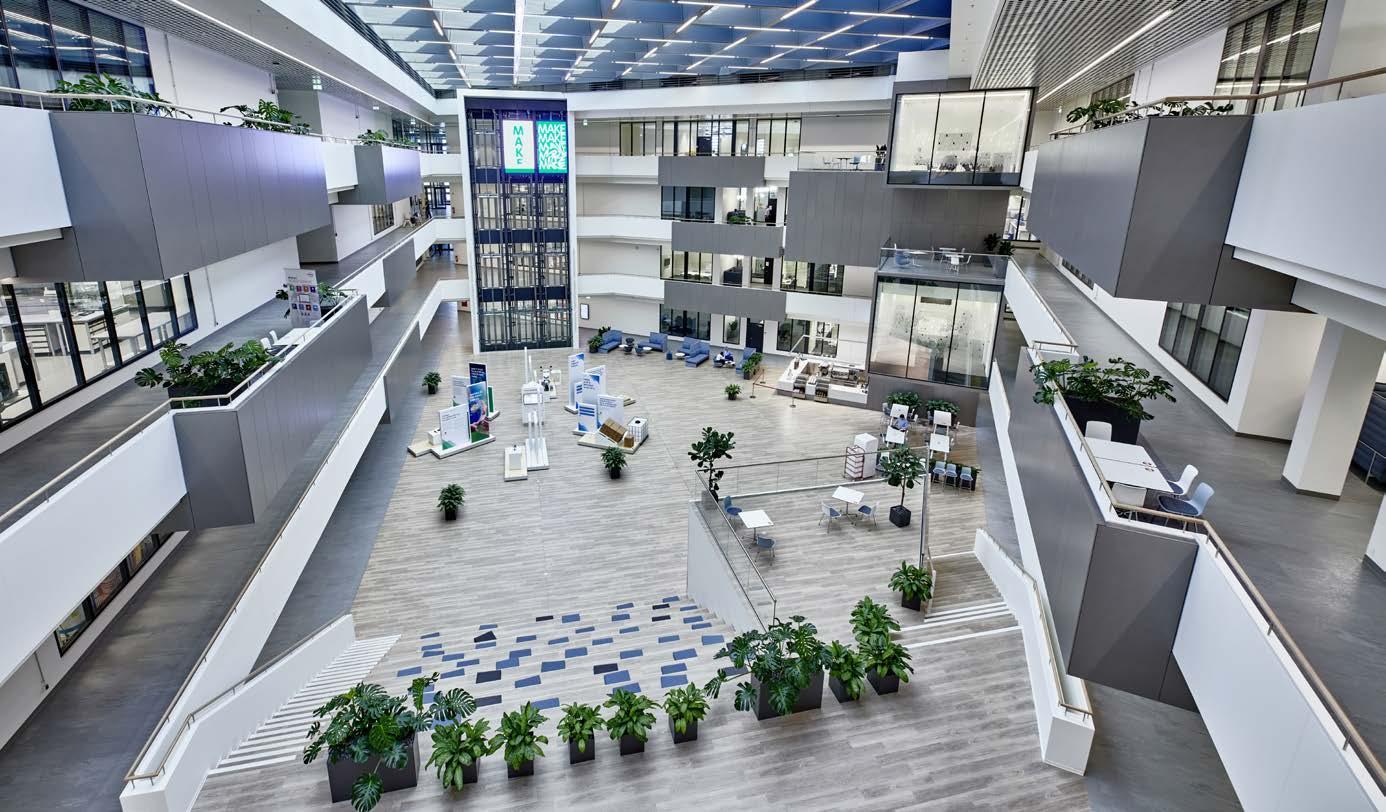
HAVING BEEN IN BUSINESS FOR OVER 100 YEARS NOW, HENKEL ADHESIVE TECHNOLOGIES IS TODAY THE MARKET LEADER FOR ADHESIVES, SEALANTS, AND FUNCTIONAL COATINGS↓ Built with an investment of over EUR130 million, the HENKEL Inspiration Center Düsseldorf is a state-of-the-art innovation and customer center.
that the ICD was “the largest single investment” in Henkel’s history, with him also highlighting that it was an embodiment of the company’s “long-term entrepreneurial thinking.” Today, besides being used as a space to bring people together and co-create new solutions, the ICD also allows Henkel to create amazing experiences and share know-how and expertise with its customers and suppliers, as well as its many partners from industry, academia, and beyond.
At this point, given that the ICD falls under the purview of Henkel Adhesive Technologies, one might be curious to know more about the business unit driving this unique innovation building. For starters, know that the solutions that come out of Henkel Adhesive Technologies are literally in a multitude of objects that we make use of on
HENKEL REMAINS FOCUSED ON TAILORING ITS OFFERINGS TO MEET THE REGION’S SPECIFIC NEEDS, CONSISTENTLY INTRODUCING LEADING PRODUCTS THAT ALIGN WITH THE PREFERENCES AND REQUIREMENTS OF THE LOCAL CONSUMER BASE.”
a daily basis- think everything from cars and mobile phones, to furniture and textiles, and even sneakers! “Having been in business for over 100 years now, Henkel Adhesive Technologies is today the market leader for adhesives, sealants, and functional coatings,” Azmi Shams, Head of Henkel Corporate Communications in the GCC, pointed out. “Through innovative thinking and entrepreneurial spirit, Henkel Adhesive Technologies shares the visions of its customers, and enables
the development of groundbreaking innovations in areas such as sustainability, mobility, and digitalization.”
In 2022, Henkel Adhesive Technologies generated over EUR11.2 billion in revenue, with its organic sales increasing by 13.2% in the same period. Here, Shams highlighted the GCC as being an important market for the business. “Our Adhesive Technologies business unit has been a pivotal player in several prestigious infrastructure and building projects in the GCC,”

Shams revealed. “Our contributions to constructing iconic landmarks, including the Burj Khalifa, Palm Jumeirah, and Expo 2020 Dubai, have solidified our reputation in the GCC region. Additionally, Henkel has been involved in other notable projects, such as the Abrahamic Family House, the Green Riyadh initiative, and the Hatta Pumped Storage Hydropower Plant. Our expertise in adhesive solutions has played a crucial role in making these projects
successful, and has reinforced our commitment to excellence in the construction industry.”
Henkel is also the name behind several well-known brands in the GCC. “Notably, brands like Loctite, Pattex, and Henkel Polybit from the Adhesive Technologies division, along with Schwarzkopf, Dac, Persil, Palette, and Got2b from the consumer brands business, have become top choices among GCC consumers and customers,” Shams said. “Henkel remains focused on tailoring its offerings to meet the region’s specific needs, consistently introducing leading products that align with the preferences and requirements of the local consumer base.” Henkel’s commitment to positioning sustainability at the center of
everything it does hasn’t gone unnoticed either. “The development of sustainable and innovative solutions, while continuing to shape our Adhesive Technologies business and increase our economic success, is what allows us to remain at the forefront of the industry,” Shams noted.

Having made its entry into the GCC in 1998, Henkel now has its regional headquarters (which caters to its business in the Middle East, India, and Africa) in the UAE, with Henkel GCC boasting of a workforce of over 1,600 employees. The enterprise operates three plants in the region- two are situated in Saudi Arabia, and there’s one in the UAE specific to Henkel Adhesive Technologies. In addition, Henkel also runs two innovation centers for the region in the UAE. “The GCC region remains a crucial and promising market for Henkel, as it has already made significant investments across the area,
recognizing the region’s immense potential. Henkel’s success is evident, as it devotes equal attention to both its business units, Henkel Consumer Brands, and Henkel Adhesive Technologies. By thriving in various market segments, the company showcases its strength and adaptability,” Shams concluded
↓ With a floor area of 47,000 square meters, the HENKEL INSPIRATION CENTER DÜSSELDORF provides space for 30 laboratories, 4 technology centers and more than 650 Henkel experts.
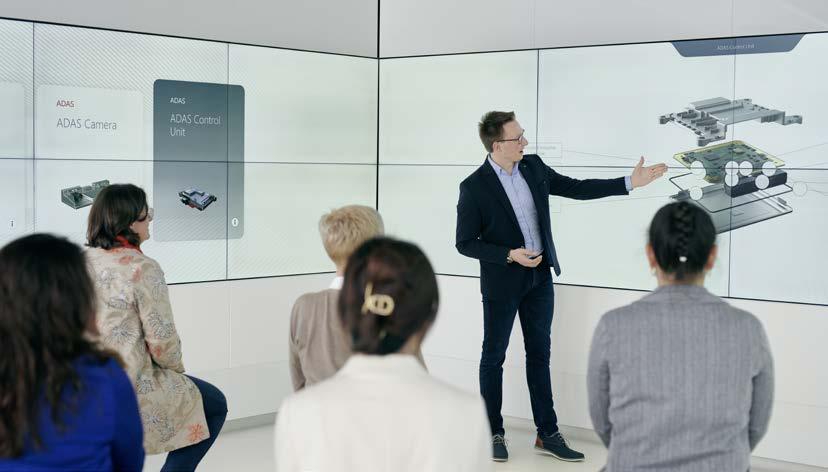
Azmi Shams, Head of Henkel Corporate Communications GCC, sounds off on the company’s focus on innovation

}“Fritz Henkel, the pioneering founder of Henkel, has laid the foundation for the company’s success through the development of innovative products and technologies from the very beginning. Till now, Henkel continues to foster a culture of innovation by empowering employees to push boundaries, and transform innovations into true competitive differentiators. Our commitment to pioneering new technologies and solutions for the future, as well as catering to the ever-changing needs of our consumers is at the core of our corporate purpose, which is to be ‘pioneers at heart, for the good of generations.’
}Together with customers across 800 industries, we continuously develop new technologies that improve products and business models, delivering more targeted, customized solutions. The Inspiration Center in Dusseldorf (ICD) is Henkel’s first global innovation center that represents the entire technology portfolio of Adhesive Technologies, and the company’s biggest research and development (R&D) facility around the globe. With headquarters in Düsseldorf, the state-of the art building, built with an investment of EUR130 million, brings Henkel experts together with customers and partners to develop novel solutions for megatrends such as sustainability, mobility, and connectivity, with these running the gamut from safer e-mobility, to sustainable food packaging.
}Reflecting our corporate purpose, our Innovation Impact program aims to cultivate an innovative culture among future generations, empowering them to push boundaries and shape them into pioneers. Based in our Inspiration Center Düsseldorf, the program is designed to offer hands-on experience with state-of-the-art projects, top-notch mentorship, personalized career planning, and international work opportunities. The Innovation Impact program plays a crucial role in fostering a culture of innovation, attracting top talent, strengthening collaborations, and driving sustainable business practices. By doing so, it contributes to Henkel’s continued growth, reinforces its position as a pioneer in the industry, and ensures the company’s ability to meet the evolving needs of customers and society.”
[THE HOW-TO] Behind the scenes of Re:Set’s first-of-its-kind employee well-being program at New York University Abu Dhabi by
AAKANKSHA TANGRIEver since Bashiru Mugyeni, a Campus Safety Officer at New York University Abu Dhabi (NYUAD), participated in Re:Set’s first-of-its-kind employee well-being program, he has been sleeping better, feeling calmer, and is more confident in his ability to resolve conflicts both at home and in the workplace. “It has helped improve my self-esteem,” he said, about his experience.
At Re:Set, we provide scientifically-developed and personalized end-to-end employee well-being programs and services for employers to build happier and productive teams. The biggest problem we solve
through our workplace wellness programs is to reduce employee burnout and stress, and help people build resilience and develop positive micro habits which leads to lower attrition rates, increase in productivity

and as a result an increase in the revenue for the organization.
The UAE workforce -unfortunately- continues to be among the most stressed in the world. The Cigna Well-Being Study
from last year found that 90% of the country’s population has reported unmanageable stress, with 98% of the workforce reporting at least one symptom of burnout leading them to feel disconnected from work. This is in line with the larger trend of a growing mental health crisis in the GCC, with one in three respondents of a recent McKinsey survey reporting burnout symptoms, and a higher number reporting symptoms of depression, anxiety, and distress than the global average.
} These numbers are a reminder that companies in the GCC countries, including the UAE, need to ramp up efforts to ensure they prioritize employee well-being, and ensure access to mental health resources and tools. As UAE quickly becomes one of the world’s top digital economies, and transforms into a global testbed for futuristic technologies and entrepreneurship, the success of these initiatives -and its growing number of startups- will depend on how these organizations are able to attract and retain world-class talent. This is a direct reflection on how companies prioritize and value the mental well-being of their people, from the boardlevel executives to the backbone of every organization, the gig workers.
To put things into perspective, besides the obvious social benefits of investing in employee well-being, instituting a workplace wellness
program that empowers employees to take better care of their mental and overall health is known to increase revenue per employee, and reduce employee turnover by 11% each, reduce employee burnout by 90%, cull absenteeism by 45%, all of which results in better productivity and morale, as well as save millions of dollars on healthcare costs. Turns out putting your money where your mouth is can bring you even more money.
} When we partnered with NYUAD’s Office of Social Responsibility at the beginning of the COVID-19 pandemic in 2020, our goal was to help the university’s support staff and domestic workers employed by members of the NYUAD community take charge of their well-being. We focused on laying the foundations to make them aware of the different facets of mental health challenges, and give them the necessary tools to combat any obstacles they may experience at the workplace and beyond. Our scientifically developed end-to-end wellness program, which has seen success with other marquee clients as well, stood out because it’s culturally sensitive, tangible, and customized to the needs of individual employees.
“Our Institution’s foundation was built on the shared belief in the importance of accessibility to education for all,” said Liria Gjidija, Director of Global Outreach and Programs for NYU Abu Dhabi. “While the pandemic brought on significant challenges, it also brought an opportunity to reimagine our
programming. It was essential for us to take a proactive approach to provide mental health and well-being resources to help our contracted colleagues and domestic workers, employed by members of our community to navigate the many facets of their lives. Partnering with Re:Set on this endeavor has been a natural fit, as their company’s ethos aligns with our vision to foster an environment that empowers communities through education.”
More than 50% of UAE’s labor workforce consists of blue-collar workers, with the majority from India, Pakistan, Bangladesh, and the Philippines. Organizations must acknowledge the immense social and financial
pressure that migrant workers, and even their families, face. Their precarious position in the workplace, along with language and cultural barriers, means that migrant workers often do not receive the mental health support they actually require, and they often don’t have the language or understanding to express what they’re going through. With migrant workers forming the backbone of many industries in UAE’s private sector, it emphasizes the need for companies to invest in resources and policies that will help them retain these workers and be fiscally smart by ensuring their holistic well-being and employee engagement. Yet, Re:Set and NYUAD’s Office of Social Responsibility
Program, which specifically targeting its contracted workforce, remains an anomaly in the region.
} What began as tailored mental health and wellbeing multimedia resources and videos in the top eight languages spoken by the university’s staff soon transitioned into in-person certified well-being courses once the pandemic restrictions eased. With a focus on user engagement and utilization, the well-being resources are embedded into NYUAD’s internal app (which all employees have access to), and in addition to this, easily made accessible through physical copies placed in the workers’ lounge. Given the lack of awareness and availability
THE CIGNA WELL-BEING STUDY FROM LAST YEAR FOUND THAT 90% OF THE COUNTRY’S POPULATION HAS REPORTED UNMANAGEABLE STRESS, WITH 98% OF THE WORKFORCE REPORTING AT LEAST ONE SYMPTOM OF BURNOUT LEADING THEM TO FEEL DISCONNECTED FROM WORK.

of mental health support in many emerging economies, the resources were created to be also shared with families of the NYUAD contracted staff back in their home countries. Our work has impacted thousands of community members and their families across the world, underscoring the importance of mental health, and the gap that exists in the market.
} We designed our programs based on employee insights that were gathered through qualitative surveys in their native languages. This allowed us to develop targeted, culturally relevant and scientifically backed resources for the staff. By incorporating worker suggestions on topics such as fostering emotional proximity in personal relationships, combating social isolation, managing uncomfortable negative emotions, understanding and overcoming burnout, effective stress resolution and management, building financial literacy for improved mental health, among many others, Re:Set was able to improve employee engagement and motivation, as well as psychological literacy.
To meet the evolving needs and growing demands of the staff, in the last two months alone, we have piloted eight well-being courses comprising 18 workshops and experiential activities on topics ranging from the art of self-love and effective communication, to psychoeducating the audience on
anxiety and depressive disorders, and psychological ways to elevate one’s mental well-being using mindfulness, somatic art therapy, and sound healing techniques. This is the first initiative of its kind in the region focusing on frontline workers, and its success lies in the visible improvements to the mental well-being of our participants.
} Consider the example of Richard Makuriwa, a campus security officer at NYUAD. Makuriwa says that there has been a marked improvement in how he responds to stress following what he has learned through the aforementioned courses. “Knowing that there is good and bad stress was a big lesson, and knowing that all stress needs to be dealt with before it spirals to the worst, made a big difference for me,” Makuriwa noted.
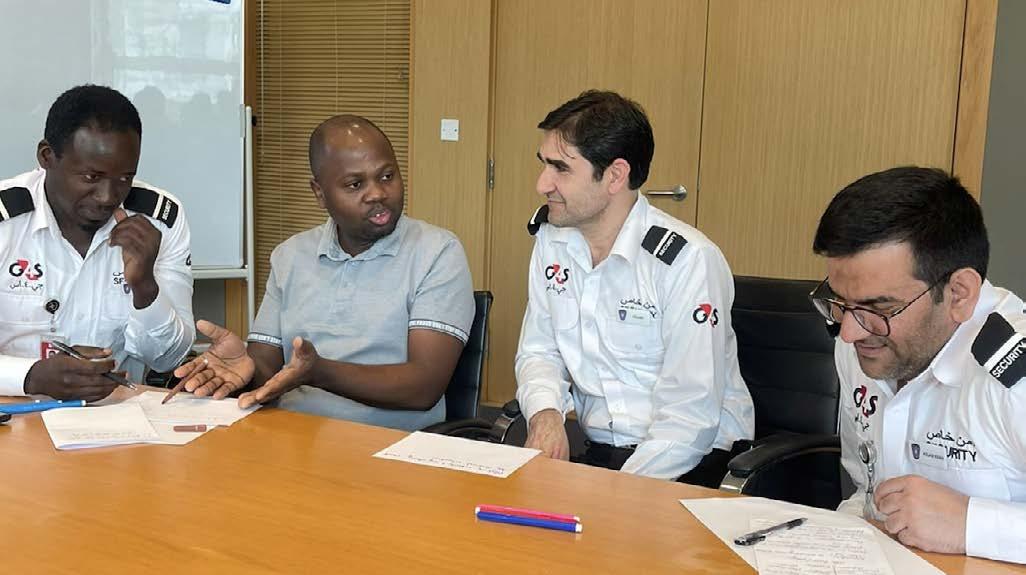
Research shows frontline workers are 1.5 times more likely to be stressed than their white-collar counterparts. Our program was specifically designed to benefit themthose who are present “on the ground,” engaging directly with people, and providing services that are essential to an organization or wider society, who remain burdened by stress due to systemic and socio-economic factors, and are often expected to survive in a new country and perform exceptionally at their workplaces, without the necessary skills to navigate these mental health challenges.
} Collaborating with NYUAD’s Office of Social Responsibility has only reinforced the fact that for any wellness program to succeed, it must take into account the unique and specific needs of each
target audience and then provide tailored resources that fit those needs. A one-size-fits-all solution will simply not be enough. Most organizations tend to think that employee wellness is a “nice to have,” but, really, it’s a strategic investment into a company’s future. Specifically, ignoring the well-being of frontline workers is, to put it bluntly, a poor business decision. Frontline workers are the backbone of every organization, bearing the physical and emotional brunt, and ensuring its smooth running at all times. If their mental health challenges remain unaddressed, and they aren’t performing at their best, the whole system is likely to collapse, and employee attrition impacts your company’s balance sheet and business continuity. With Re:Set’s support, NYUAD was able to drastically
OUR INSTITUTION’S FOUNDATION WAS BUILT ON THE SHARED BELIEF IN THE IMPORTANCE OF ACCESSIBILITY TO EDUCATION FOR ALL.→ A scene from Re:Set’s sessions at New York University Abu Dhabi.
improve employee engagement and motivation.
} At Re:Set, we’re on a mission to help make the UAE the most proactive country in the world when it comes to looking after the holistic well-being of its people, and to take forward the vision of the country’s leadership. In fact, much of the work we do is aligned with the UAE’s National WellBeing Strategy, which seeks to improve the holistic wellbeing of the nation, communities, and individuals through targeted efforts at improving the livability and sustainability of cities and regions, embracing wellness in places of work and study, creating
connected and purposeful digital communities. This dream of an engaged, healthier, and happier workforce will only come true when corporations choose to invest in their people sustainably, and for the long term. A 45-minute meditation session sandwiched


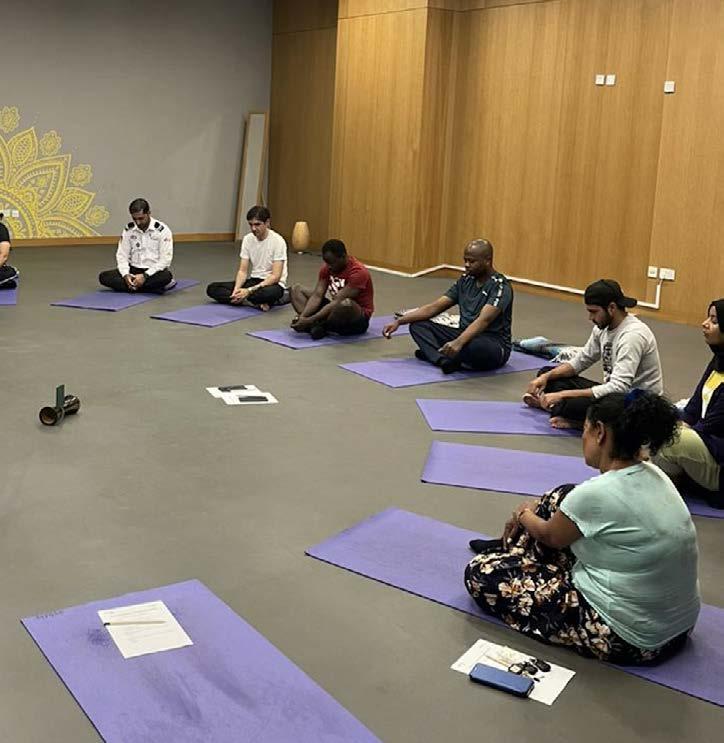
between back-to-back meetings and toxic workplace dynamics will not really solve the problem- instituting meaningful workplace wellness programs that take into consideration the unique needs of employees across various hierarchies and diversity metrics will. The
KNOWING THAT THERE IS GOOD AND BAD STRESS WAS A BIG LESSON, AND KNOWING THAT ALL STRESS NEEDS TO BE DEALT WITH BEFORE IT SPIRALS TO THE WORST, MADE A BIG DIFFERENCE FOR ME.
good thing is that this doesn’t have to be daunting. At Re:Set, we have firsthand witnessed the success when proven, actionable, and flexible workplace wellness programs are designed to help create workplaces that are nurturing, safe, and inclusive for all. You’ll only have to do one thing to see your employees thrive- care about them.
Aakanksha Tangri is founder of Re:Set, which helps organizations boost employee retention, productivity and motivation with end-to-end employee well-being programs. Re:Set offers workplace wellness programs that cater to individuals across all professional levels, from executives to gig-economy workers in your organization.
yourdailyreset.com

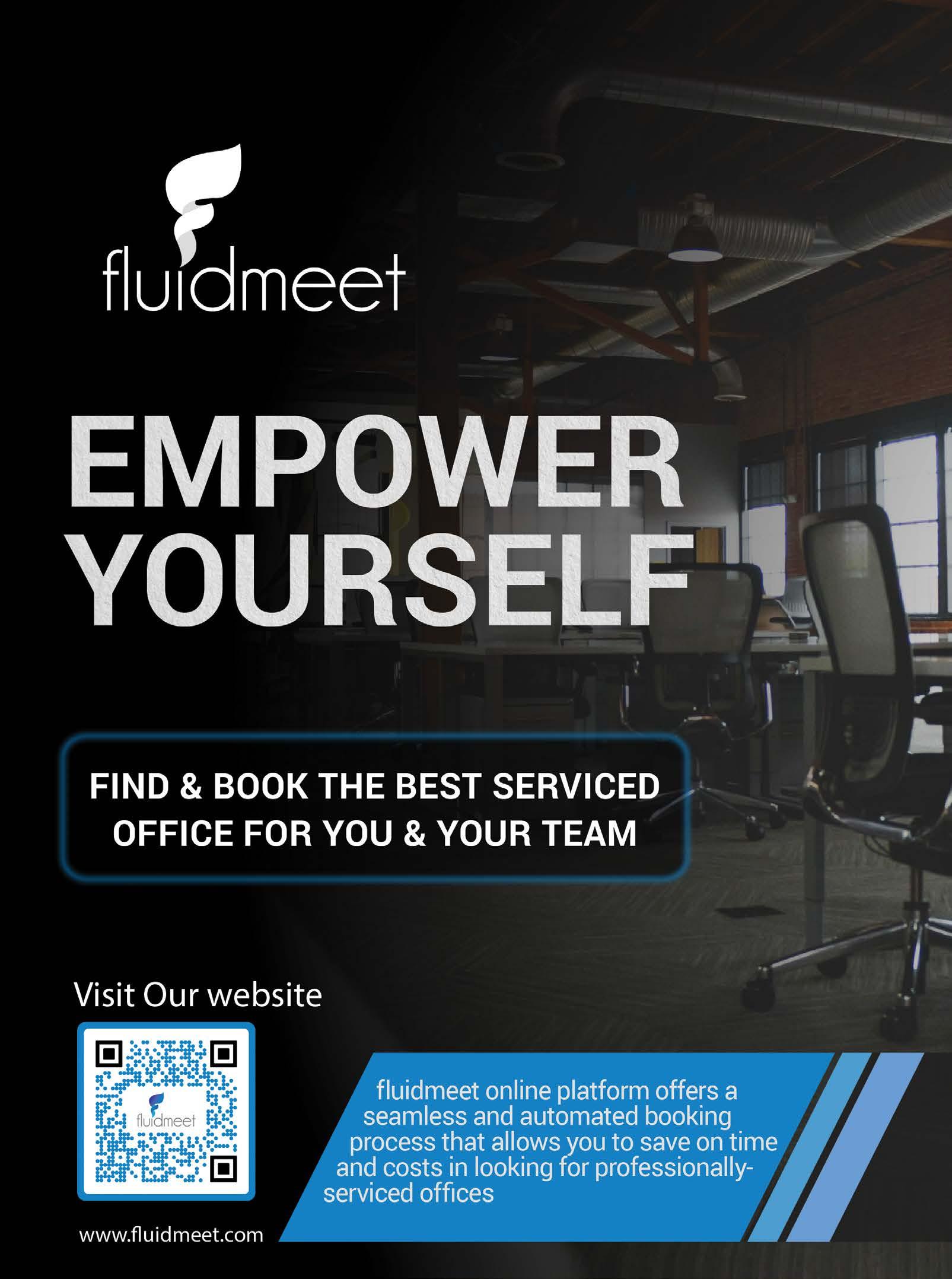

Meet the six startups that have been chosen to be in the second edition of PepsiCo’s Greenhouse Accelerator Program: MENA Sustainability Edition
by AALIA MEHREEN AHMEDIf I were to ask you what are the first three words that come to mind when I mention PepsiCo, it is highly unlikely that “agriculture” would be an immediate choice. But the 125-year-old global food and beverage company -which was born in the United States in 1898, and today has a formidable presence across the globe- is way more acquainted with the agriculture sector than you may be led to think.
}“At PepsiCo, we’re often thought of as just a soft drinks company- however, we see ourselves as an agricultural company at our core,” Aamer Sheikh, CEO of PepsiCo Middle East, says. “Already, we have sourced crops across 60 countries, and supported over 100,000 agricultural jobs worldwide. This scale and experience has allowed us to understand that sustainable agriculture is at the heart of meeting the increasing demand for food as the global population grows, while preserving our natural resources. Sustainable agriculture takes on special meaning in the Middle East and North Africa (MENA) with several parts of the region grappling with scarce arable land and limited water supply. This raises concerns around food security and creates uncertainty in a region that thrives on long-term planning and predictability.”
Sheikh’s words make it clear why the second edition of PepsiCo’s Greenhouse Accelerator Program: MENA Sustainability Edition -a global mentor-led initiative by the company to help entrepreneurs in the sustainability space grow through collaboration and knowledge sharing- is primarily focused on sustainable agriculture. In fact, this year’s edition continues PepsiCo’s initial partnership with the UAE Ministry of Climate Change and Environment (MOCCAE) as well as Food Tech Valley, an initiative launched by H.H. Sheikh Mohammed bin Rashid Al Maktoum, Vice President and Prime Minister of the UAE and Ruler of Dubai, which aims to foster innovation in food production. “For our part, we are holding ourselves to ambitious goals on this front, and we believe that innovation is the key to making progress within sustainable agricul-

ture,” Sheikh adds. “Startups have a lot to offer– their agility and innovation mindset can drive long-term positive impact with access to the right resources, capital, and network. That’s why we’ve chosen to spotlight sustainable agriculture through this year’s cohort. We have thus identified six startups from Egypt, Jordan, Lebanon, and Tunisia with disruptive agricultural solutions to address common challenges, such as water stress, limited arable land, and food security.”

} Having gone through a rigorous multistage selection process, the six companies chosen to be a part of this program were selected from over 180 applications from 18 countries based on five key criteria: alignment with PepsiCo’s sustainability strategy, i.e. pep+ (PepsiCo Positive), strategic synergy with PepsiCo, scalability, relevance to the MENA, and breakthrough potential. “Each of the shortlisted companies bring a unique level of expertise and innovative solutions to the table, from all aspects of the agriculture value chain, from water preservation, to soil cultivation,” Sheikh notes. “With these pioneering solutions, we aim to help strengthen the resilience of our food system. The program is also intricately tied to our own goals. At PepsiCo, we have committed to achieve net-zero emissions by 2040 and become net water positive by 2030. Part of this is fostering innovation through the Greenhouse Accelerator Program to drive tangible change at scale. The program also goes beyond funding support. One of the main tenets of the program is the one-onone mentorship that each of the startups receive, as well as access to a wide network.”
Having already received an initial grant of US$20,000 to support their respective businesses, thesix companies in this year’s Greenhouse Accelerator Program: MENA Sustainability Editionm are now all set to benefit further from the mentorship they will be provided by regional industry professionals, as well as PepsiCo and Food Tech Valley experts. At the end of the six-month program, one winning startup will be granted a funding of $100,000 to scale and grow. Here, in no particular order, are the six startups vying for this prize.
Made by Africans to Africans.” That is the tagline that defines Egypt-based renewable energy startup NoorNation, which offers decentralized energy and water infrastructure solutions to underserved areas within Egypt, as well as the wider sub-Saharan Africa. “From the remote and isolated rural and desert areas in Egypt, to rural villages and farming communities in the heart of the Moroccan oasis, we have witnessed how the lack of basic life essentials, such as energy and water, have hindered communities and individuals -particularly those involved in farming activities- from achieving self sufficiency over the past decade,” Ragy Ramadan, founder of NoorNation, says. “We decided to create NoorNation to bridge those life essentials across Egypt and the MENA, by routing solar energy towards innovative, but uncommon, applications. Our renewable energy solutions thus provide necessary energy for agriculture such as water pumping for irrigation, and supplying safe water for domestic, potable, or livestock and poultry irrigation, using only solar power.”
} NoorNation’s flagship product is LifeBox- a solar-powered mobile solution that offers clean electricity and safe water simultaneously for farming businesses. Entirely designed and manufactured within Egypt itself, it is a self-contained unit that can be quickly deployed to any given location. But that isn’t all there is to LifeBox’s appeal, Ramadan emphasizes. “LifeBox has up to 14 unique selling points (USPs), compared to other regular solar systems,” he says. “The most distinguishing features include dual-supply of electricity and water from one unit, internet of things (IoT)-enabled tech that offers fully remote monitoring and control, as well as a plug-and-play functionality (i.e. it works with a computer system as soon as it is connected). Additionally, it acts as an all-in-one relief hub against climatic disasters and pandemics, serving those vulnerable to climate change.” Note here the last USP that Ramadan states- it is perhaps the one that fully encapsulates the very reason for LifeBox’s creation in the first place. “Climate change is already threatening the MENA’s agricultural sector, smallholder farmers’ livelihoods, and increasingly affecting food security,” Ramadan explains. “In semi-arid areas across the continent, water stored underground can be less prone to climate change impacts and evaporation losses. Providing access to groundwater thus allows farmers to both overcome the vulnerabilities associated with the variability of rainfall, and enhance preparedness for drought.

EMBRACING PEPSICO’S PEP+ STRATEGY -WHICH PLACES SUSTAINABILITY AND HUMAN CAPITAL AT THE HEART OF WHAT THEY DO- IS INSPIRING AND RESONATES DEEPLY WITH OUR OWN STARTUP’S VISION.
Access to supplemental groundwater is, in fact, a multisectoral investment in climate adaptation. Therefore, our promise is to build a more resilient agricultural sector, and our vision is to empower one million people in the MENA through providing them with their daily life essentials of clean energy and safe water for agriculture by 2028.”
}Now, although NoorNation became an officially registered company only in March 2022, the startup -which Ramadan launched with his co-founder Mohamed M. Khaled- has been operational since 2020. Bootstrapped since 2021, it is currently attempting to raise a US$1 million seed fund round, whilst simultaneously negotiating to raise $200,000 in equity funds. But being accepted into PepsiCo’s Greenhouse Accelerator Program: MENA Sustainability Edition has been the startup’s most encouraging push towards realizing its regional goals as yet. “We see incredible value in being a part of PepsiCo’s extensive network of subject matter experts and gaining access to 400,000 farmers, with almost half of them being smallholders,” Ramadan says. “Embracing PepsiCo’s pep+ strategy -which places sustainability and human capital at the heart of what they do- is inspiring and resonates deeply with our own
startup’s vision. With PepsiCo’s support and expertise, we aim to expand our reach to serve more farmers, penetrate new markets, and develop a successfully recurring revenue model. We thus hope to create meaningful differences in the lives of farmers, and contribute to a more resilient and sustainable agricultural sector.”
}And while access to mentorship and industry insights is expected to play a direct role in finetuning NoorNation’s business model, and, in turn, growing its sales, Ramadan’s major focus is now on two things: product development and regional expansion. “Over the next six months, we want to further enhance our products both vertically and horizontally, including the possibility of integrating dripping irrigation [a type of
irrigation that disperses water slowly, evenly, and directly near the roots of plants with the aim to conserve water] into our solutions,” he reveals. “One of the key milestones we hope to achieve in the coming months is delivering our first LifeBox for water pumping and purification to Tanzania. This will have a positive impact on hundreds of farmers and communities, providing them with access to clean water and sustainable energy, driving our goal to contribute to a better livelihood for those we serve. We are also eager to collaborate closely with experts at PepsiCo to develop tailored and effective models for potato growers in Egypt. By working together, we can create technically and commercially sound solutions that address the unique needs of this specific agricultural sector.”
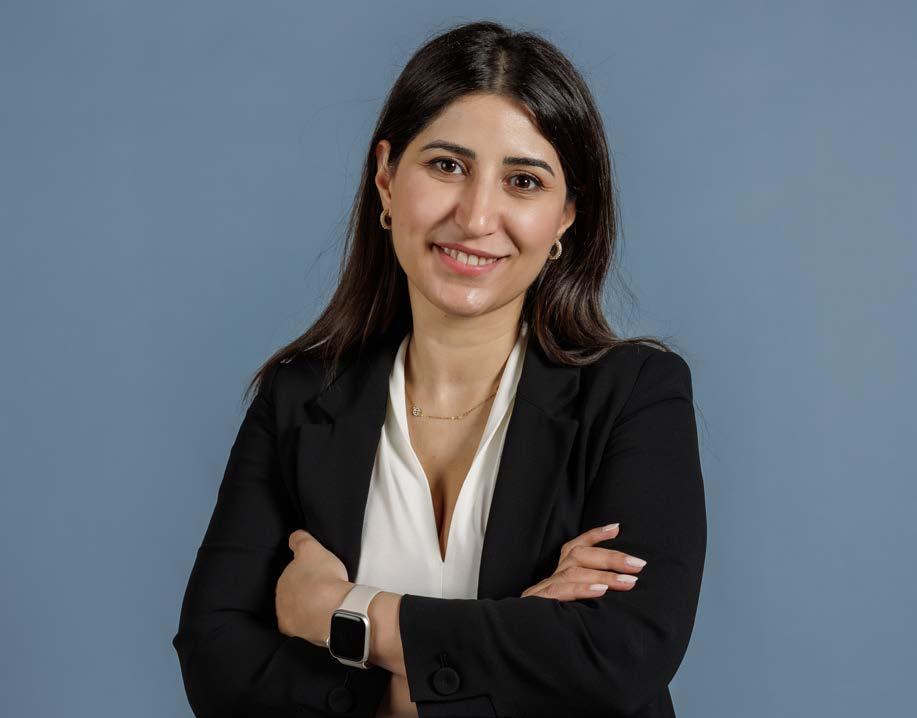
/doodasolutions.com/
Stunted plant growth, depletion of essential soil nutrients, polluted groundwater, increased number of pests, the release elease of harmful greenhouse gasses into the air- these are just a few of the side-effects of continued use of chemical fertilizers in farming. Now, jog your memory back to your high school science classes, and you’ll realize that this isn’t particularly new information. Yet, it is an issue that has long plagued those working within agriculture- and helping farmers with eco-friendly alternatives is Lebanon-based startup Dooda Solutions.
Launched in 2018, Dooda Solutions essentially operates an earthworm farm and leverages advanced technologies to produce high-quality solid and liquid vermicompost. Now, if you’re unfamiliar with what vermicompost is, it is simply the final product of a fully organic process wherein certain species of earthworms are used to decompose plant materials. “By utilizing innovative techniques and scientific methods, we raise earthworms in a controlled environment to produce
premium grade vermicompost,” Nada Ghanem, founder and Managing Director, says. “Our vermicompost products are carefully crafted to enhance soil health, as well as to provide sustainable solutions for farmers. With our headquarters nestled amidst the natural beauty of the Lebanese Shouf mountains, we draw inspiration from the rich ecosystem surrounding us. From this base, we are driven to make a positive impact on agriculture, the environment,
and the socio-economic wellbeing of farmers in Lebanon and beyond.”
} Having realized the significant value in introducing organic fertilizers to the region, Ghanem and her team realized that a big part of their scaling strategy would require spreading awareness about the benefits of vermicompost. “The MENA region is one of the most water-scarce areas globally, facing limited freshwater resources, and high levels of water stress, and so, one of the main challenges we address is soil degradation,” Ghanem says. “Many farmers struggle with declining soil quality, leading to decreased crop productivity, and increased reliance on chemical fertilizers. Our vermicompost products -derived from organic waste processed by earthworms- restore soil health by improving its structure, increasing nutrient availability, and enhancing microbial activity. This not only helps farmers achieve higher crop yields, but also reduces the need for synthetic fertilizers, minimizing environmental pollution, and promoting long-term soil sustainability.”
} But Dooda’s environment-friendly impact doesn’t end with just negating the repercussions of using chemical compost. For one, the startup is directly addressing the MENA region’s mismanagement of organic waste disposal. As per a 2021 research paper released by International Center for Biosaline Agriculture (ICBA), an international, not-for-profit applied agricultural research center, nations in the MENA have been threatened by acute air pollution, contamination of water bodies, and climate change due to increasing amounts of organic waste over the last two decades.
“Because Dooda Solutions innovatively utilizes organic waste as a valuable input for our earthworms, converting it into nutrient-rich vermicompost, we contribute to the circular economy, and thus reduce the carbon footprint associated
→ DOODA is a women-led earthworm farm that raises earthworms using advanced technologies to produce premium grade solid and liquid vermicompost.
↑ This100% organic and all-natural premium vermicompost improves the quality of soil and enriches plants with beneficial minerals, nutrients, and microorganisms.
BECAUSE DOODA SOLUTIONS INNOVATIVELY UTILIZES ORGANIC WASTE AS A VALUABLE INPUT FOR OUR EARTHWORMS, CONVERTING IT INTO NUTRIENT-RICH VERMICOMPOST, WE CONTRIBUTE TO THE CIRCULAR ECONOMY, AND THUS REDUCE THE CARBON FOOTPRINT ASSOCIATED WITH WASTE DISPOSAL
with waste disposal,” Ghanem explains. “Furthermore, our vermicompost products promote water conservation. By enhancing soil structure and water retention capacity, they help reduce the amount of irrigation water required, addressing water scarcity concerns, and promoting efficient resource utilization.”
} In a bid to cater to a wide range of farming requirements, Dooda Solutions produces different kinds of vermicompost. “Our products include Ecosoil (solid vermicompost), as well as Foliar and Soil Drench (liquid vermicompost),” Ghanem explains. “All of these cater to the needs of farmers, distributors, and potential export markets. But in addition, we also offer specialized liquid vermicompost options with different nitrogen, phosphorus, and potassium (NPK) ratios to meet specific nutrient requirements. Our vermicompost has been proven to increase crop yields by up to 50%, and improve seed germination rates by 30%. They also reduce water requirements for irrigation by 30%, and minimize pest attacks by 75%. Additionally, our vermicompost helps restore soil health, and promotes the growth of beneficial bacteria and enzymes.” Now, according to Ghanem, the effectiveness of her startup’s products alone is its sole differentiating factor. But the co-founder mentions that an intentional aspect of Dooda Solutions’ strategy is to not limit its services to just supplying an organic, eco-friendly alternative to conventional fertilizers. “Backing our operations is a team of experts with extensive knowledge in earthworm farming and vermicompost production,” she says. “And so, we provide comprehensive support to our customers, including soil analysis, tailored fertilizing solutions, and advice on crop selection. This expertise ensures
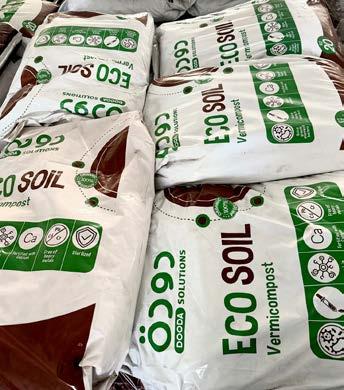
that farmers can maximize the benefits of our vermicompost, and optimize their agricultural practices.”
} Besides finding favor with its target market, Dooda Solutions has also secured non-equity grants worth US$150,000 to further its growth, and its application for PepsiCo’s Greenhouse Accelerator program was thus just another step in this direction. “It was about connecting with like-minded entrepreneurs, potential partners, and investors who share our vision for sustainable agriculture,” Ghanem explains. “These connections can open doors to new markets, funding opportunities, and strategic partnerships that will accelerate the growth of our venture. Like any startup, we face challenges that we hope the program can help us overcome. Scaling our operations effectively and expanding into new markets is a key challenge. Through the program’s resources and support, we aim to develop robust expansion strategies, and access the necessary resources to reach our target markets efficiently.” And while the next six months will certainly be crucial for Dooda Solutions, Ghanem has already set goals that go beyond that timeline. “Our ultimate aim is to create a strong foothold in the market, and position ourselves as a leading provider of premium vermicompost solutions,” Ghanem reveals. “Looking beyond the program, our vision and end-goal for Dooda Solutions is to become a leading international player in vermicompost production, and to promote sustainable agricultural practices. We envision expanding our operations across the MENA region, and eventually entering European markets. By establishing Dooda farms in various countries, we aim to unlock new markets, and provide sustainable solutions for farmers worldwide.”
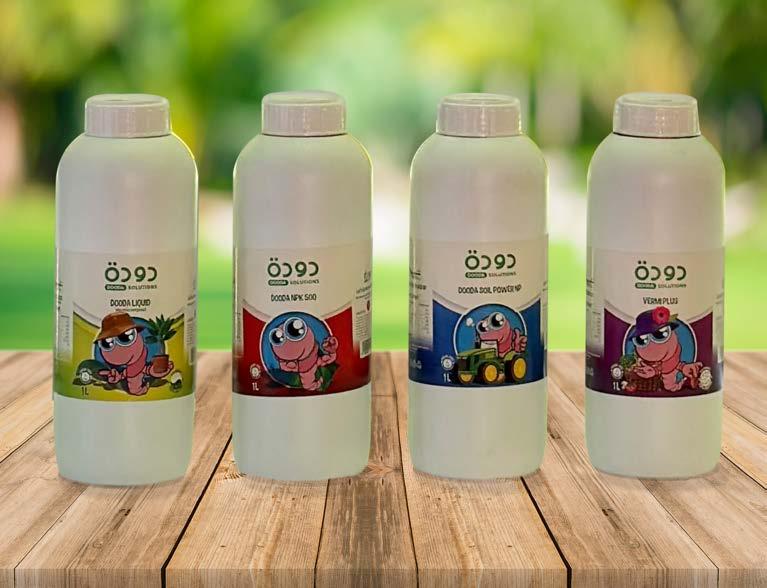
The economic downturn that shook Lebanon in 2020 exacerbated an energy crisis that had already been a major cause of the concern for the nation, and in the midst of such a state of affairs, it’s no surprise that the country’s farming businesses have been hit hard. “The onset of the Lebanese economic crisis, coupled with the escalating fuel prices worldwide due to geopolitical instabilities, worsened the energy security situation, which led to a significant unmet demand in Lebanon for access to energy,” Hasan Jaafar, co-founder and COO of Beirut-based agritech and renewable energy startup YY Regen, says.. “This underserved need prompted us, a team of passionate engineers, to introduce an alternative solution to the market. Our goal was to specifically address the issue of high capital costs associated with fixed solar systems, and the reliance on polluting and expensive diesel generators.”
YY Regen was thus launched in May 2021 by Jaafar along with Amer Khayyat and Dr. Munira Khayyat. The startup’s vision was to transform the way agricultural ventures are powered, watered, and grown through the use of affordable and less pollutive solutions. Its services, therefore, are spread across three verticals: renewable energy solutions, sustainable agriculture, and reliable and sustainable water solutions. When it comes to
long-term success, while minimizing environmental impact. As for the technologies we adopt, the products come with internet of things (IoT) functionalities that allow for remote system monitoring and control, resulting in enhanced system performance and uptime. We are also developing the first generative pre-trained transformer-powered chatbot trained in addressing troubleshooting and technical difficulties faced by our customers. This feature
renewable energy, YY Regen offers services such as solar photovoltaic systems as well as biogas systems. Meanwhile, its sustainable agriculture solutions include vertical farming and beekeeping, whereas its sustainable water solutions see it offering improved irrigation systems and solar water pumping. “YY ReGen thus offers a holistic approach that addresses multiple challenges in the agriculture sector,” Jaafar says. “Our solutions provides efficiency, sustainability, and resilience, and empowers our customers to achieve
will give us a great advantage in our scaleup phase, as we anticipate it would decrease maintenance costs.”
}But if there is one particular aspect of YY Regen’s services that its team takes immense pride in, it is in their claim that the startup is “the first and only company in the MENA region to provide on-demand renewableenergy-as-a-service.”
According to Jaafar, it is an approach that enables customers to benefit from clean energy, without having to worry about the initial capital investment.
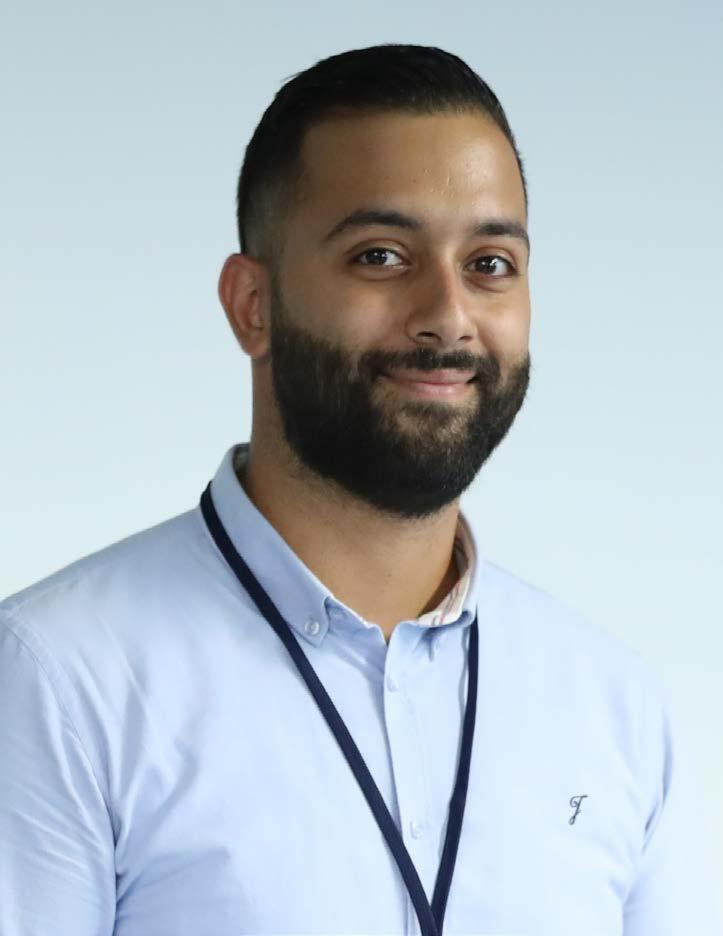
YYREGEN THUS OFFERS A HOLISTIC APPROACH THAT ADDRESSES MULTIPLE CHALLENGES IN THE AGRICULTURE SECTOR.
One such offering is the ReGen-R8, an on-demand solar energy system based on the energy-as-a-service (EaaS) model. “Our focus was primarily on farmers and rural businesses who lacked the means to afford traditional solar systems,” Jaafar says. “With ReGenR8, we aimed to provide a cheaper, cleaner, and capital-free option for accessing clean power. Our approach involved removing the complexities and uncertainties typically associated with electricity provision by adopting a customer-centric mindset. We prioritized understanding the challenges faced by our customers, and delivering tailored solutions to meet their specific needs. Our EaaS model enables easy and seamless access to clean power, empowering farmers, and rural businesses to meet their energy requirements, without the burden of upfront capital investments, or the environmental drawbacks of traditional energy sources.” In a bid to add further financial flexibility for its clients, all of YY Regen’s services are also offered on a rental commercial business model. “We charge customers only for the electricity consumed, and offer two payment options available: a fixed monthly subscription fee, or pay-as-you-use,” Jaafar explains.
}With over $175,000 from various startup programs as well as $70,000 from personal funds already under its belt, Jaafar hopes. that being chosen to be a part of the second edition of
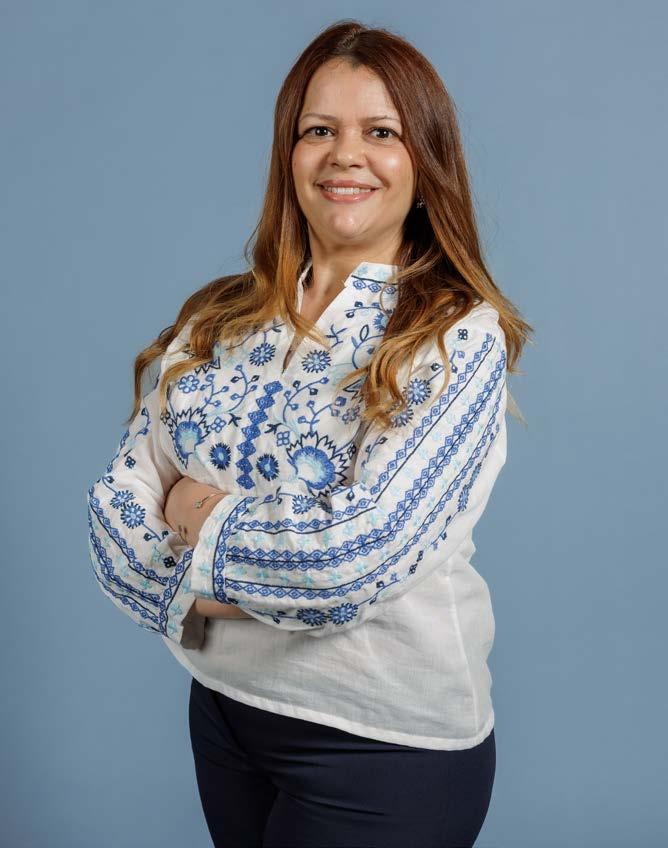
PepsiCo’s Greenhouse Accelerator Program will allow YY Gen to further prove its credibility, as well as to validate its innovative approach. “The program’s objectives and benefits perfectly matched our business needs and goals, and we realized it would be a win-win if we were to participate,” he says. “One of the most important business targets we hope to accomplish is sustainable scaleup and market expansion. From the product side, we hope to implement product refinements particularly the artificial intelligencepowered chatbot and other remote-control features. On the business side, we seek to strengthen our industry partnerships within the PepsiCo ecosystem, and we hope to increase our revenues by at least 30% by developing effective marketing strategies and consumer engagement initiatives to raise awareness about the benefits of our solution.”
} And while scaling and improving will remain a key element of YY Gen’s plans for the next few months, the startup’s end goal is crystal clear for Jaafar and his team. “We aspire to expand both nationally and internationally, while maintaining our commitment to sustainability and customer satisfaction,” Jaafar declares. “Ultimately, our goal is to contribute to a more sustainable food system, positively impacting the health and well-being of consumers and the environment in the MENA region.”
As the global discourse on how artificial intelligence (AI) can be used for good continues, one Tunisia-based agritech startup has decided to use the technology to attain sustainable farming practices. Meet RoboCare, an entity that specializes in using spectral imaging technology (an imaging technique that analyzes a wide spectrum of light across the electromagnetic spectrum) and AI within agriculture. Using these technologies, the startup offers agronomic (i.e. relating to the science of soil management and crop production) solutions that can monitor crops, prevent stress, control plant requirements, improve land efficiency, and optimize pesticide needs.
WITH OUR ESTABLISHED SUCCESS IN TUNISIA FORMING THE FOUNDATION, OUR GOAL IS NOW TO EXPAND ACROSS THE MENA REGION. THE PROGRAM’S SUPPORTIVE FRAMEWORK AND INITIAL GRANT WILL DEFINITELY PLAY AN INSTRUMENTAL ROLE IN PUSHING US TOWARD OUR NEXT MILESTONE.”
}“At RoboCare, our love for technology and agriculture drives us to innovate sustainable solutions to tackle climate change challenges,” says Dr. Imen Hbiri, co-founder and CTO of RoboCare. “By democratizing access to our spectral technology and AI expertise, we empower farmers to make informed decisions and promote sustainable practices. Our cutting-edge sensors and AI algorithms provide real-time insights into crop health, soil conditions, and environmental factors, leading to improved yields and resource management. We thus hope to create a greener future for all farmers and communities, and overcome climate change’s obstacles to drive towards a brighter tomorrow.”
Launched in 2020 in the Tunisian town of Sfax, RoboCare offers precision farming services that use data from satellites, drones, and internet of things (IoT). Using a software-as-a-service (SaaS) business model, the startup offers its tech-enabled farming tools at a pricing of just US$1 per month per hectare of land, which enables easy
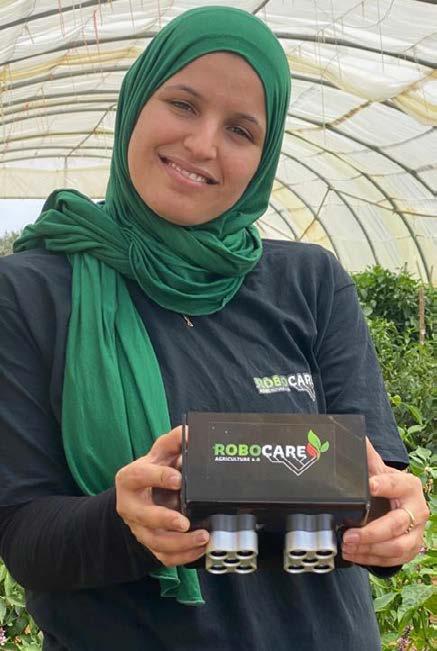

access to farmers. “We prioritize agronomic expertise to deliver tailored recommendations to farmers,” Dr. Hbiri explains. “By seamlessly integrating satellite, drone, and IoT sensors onto our platform, we provide optimal technical solutions for individual farming needs. Our cutting-edge technology utilizes hyperspectral imaging to capture invisible plant signals beyond human eyesight. By generating plant signatures that differentiate between healthy and stressed plants, we empower farmers to take proactive measures against infections before they escalate. This approach maximizes resource efficiency, targeting timely crop treatments and optimizing crop inputs, resulting in 30% reduction in costs, 20% increase in yields, and minimization of losses.”
} RoboCare currently offers two key solutions: Crop-Care, and Toma-Care. “Through our Crop-Care solution, we offer a comprehensive turnkey out-of-thebox package that includes an unmanned aerial vehicle, spectral camera, and thermal camera,” Dr. Hbiri explains. “On the other hand, Toma-Care is a digital monitoring system for early-stage disease detection in greenhouse crop production based on proximal sensing [technology that captures high-resolution data from a close range, and then provides insights into crop health, soil conditions, and other ecosystem dynamics] and AI technology.”
}Now, for a startup that has so far adopted a combination of bootstrapping and financial grants to fund itself, Dr. Hbiri says being chosen into PepsiCo’s Greenhouse Accelerator Program is a “significant milestone” for RoboCare. “The six-month program will provide us with invaluable access to mentorship, a pivotal asset for our future growth trajectory,” Dr. Hbiri says. “With the guidance of PepsiCo and their partners, our objective is to enhance the scalability of our comprehensive dashboard, which
we hope they will consider integrating into their own business operations. The program will also be a launchpad for our pursuit of international expansion. With our established success in Tunisia forming the foundation, our goal is now to expand across the MENA region. The program’s supportive framework and initial grant will definitely play an instrumental role in pushing us toward our next milestone.”
}But international scaling isn’t all there is to Dr. Hbiri’s plans for her startup. If anything, much of the founder’s strategies are deeply rooted in creating a lasting regional impact. “Over the next six months, our ambitions are laser-focused on achieving significant milestones that align with our sustainable agriculture vision,” Dr. Hbiri says. “For starters, we are determined to close our first round of funding. This investment will provide us with the necessary resources to accelerate our growth, strengthen our research and development capabilities, and expand our reach to even more farmers globally. Our objective is also to triple our local customer base. We believe that by focusing on the local market, we can make a significant and immediate impact on agricultural practices, while also building strong foundations for broader expansion.”
/smartwti.com/
Out of the 17 most water-stressed countries in the world, 11 are in the MENA region. This statistic -which is undoubtedly concerning and distressing- is as per a 2021 report released by the United Nations Children’s Fund (UNICEF). More recently, in an April 2023 study, the World Bank announced that the MENA region is currently facing an unprecedented water scarcity crisis. And it is this backdrop that Jordan-based startup SmartWTI operates. Armed with a mission to help farmers maintain their businesses despite the region’s aridity, SmartWTI makes use of the internet of things (IoT) and artificial intelligence (AI) to design and manufacture water management solutions.
“At SmartWTI, our integrated system collects and analyzes data to track water consumption, control usage, and predict future needs, thereby promoting sustainable water practices, and raising awareness about the importance of water as a limited resource,” Heba Asa’d, co-founder and CEO of SmartWTI, says. “Our team has a deep understanding of the industry’s challenges, and has therefore developed a gamechanging solution that not only enhances crop health and productivity, but also preserves vital resources. With our innovation, farmers are able to precisely measure variables like soil moisture and temperature on a real-time basis. Then, through advanced algorithms and data science methodologies, we analyze this data to provide them with actionable insights to make informed decisions. With fully automated irrigation practices, the system also delivers the exact amount of water required by each plant, at the right time and location, and quickly detects leaks, helping minimize water waste.”
}The product Asa’d refers to here is called the WTI Controller- an AI and IoT cloud solution that enables remote equipment monitoring, as well as control and management of water and other liquids, using a web and mobile application. The data that is gathered on the application is derived from a series of controllers that can detect factors like salinity and temperature of the water used, while also managing the amount of irrigation water, as well as water losses and leaks. Meanwhile, the application’s adoption of IoT allows for data to be collected over a vast network without the need for any human interaction. “By providing advanced technologies, including precision irrigation systems, data analytics platforms, and consulting services, we are optimizing water usage, and achieving sustainable water management,” Asa’d explains. “We are also conserving scarce water resources by providing real-time monitoring of soil moisture levels, weather conditions, and plant water requirements, which helps implement targeted irrigation strategies for local farmers, and alerts them to leaks. This is a valuable solution for our region, and particularly for Jordan, which has no oil resources, and a scarce water supply. In the long term, a solution like this helps
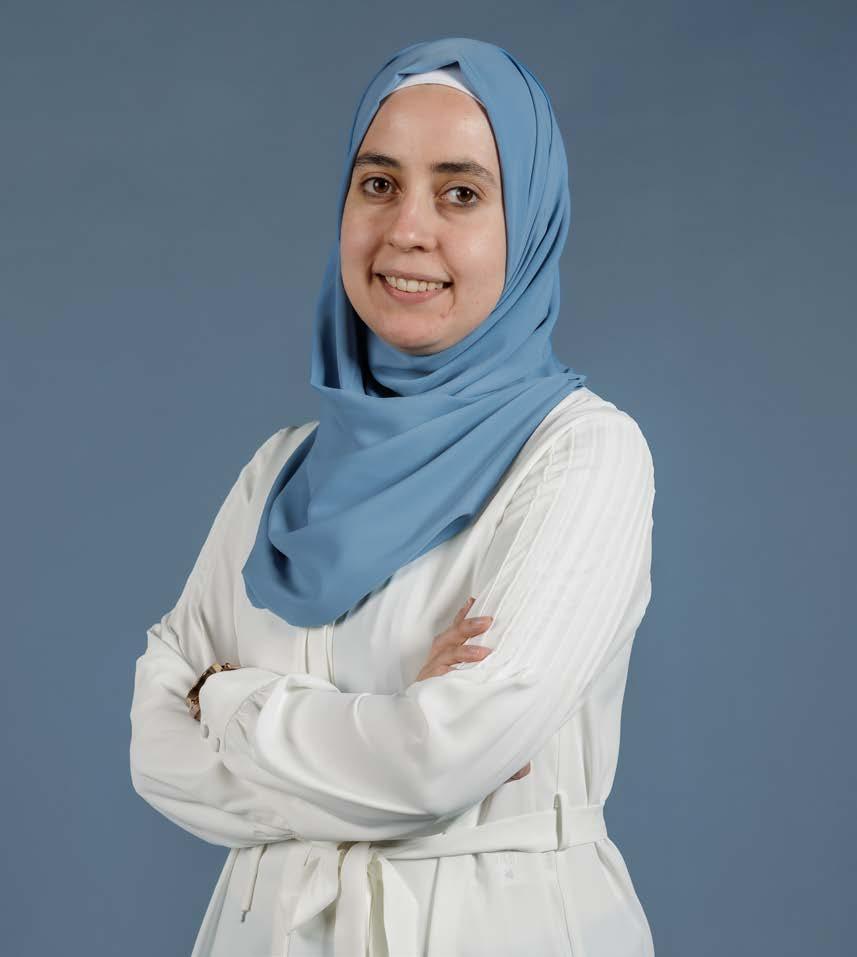
make the region more food-secure, and preserves our natural resources.” Since its launch in 2021 by Asa’d and her co-founder Omar Asa’d, SmartWTI has built a customer base that includes agricultural, industrial, as well as commercial clients. And having been selected as one of the six startups in PepsiCo’s Greenhouse Accelerator Program: MENA Sustainability Edition this year, Asa’d and her team are laser-focused on what they wish to achieve next. “Being a part of this program marks a significant milestone in expediting our growth,” Asa’d says. “Over the next six months, our mission is clear: achieve tangible results that align with our vision and goals. We will refine our water management solutions based on insightful feedback from PepsiCo mentors and their partners, enhancing precision, efficiency, and scalability for the food and beverage industry. To demonstrate the effectiveness of our solutions in real-world scenarios, we’ll also establish pilot projects and collaborations with PepsiCo and other participants, gaining valuable insights for market adoption, and operational expansion.”

Inever expected to be involved in agriculture!” These are the words with which Mohammad Zeinati, founder and CEO of Jordan-based agritech startup Smart Green, begins his description of how he forayed from being an electrical engineer into the world of sustainable agriculture. “My first exposure to agriculture was when I volunteered as an adult at a lemon tree farm with the Arab Group for the Protection of Nature in Jordan,” Zeinati recalls. “This moment was the first time I ever worked in the presence of trees and soil. That experience eventually led to me heading numerous projects in hydroponics and agritech turnkey mega projects. Through this experience, I first noticed that farm irrigation systems were the brain for digital transformation, and that they were anchoring the entire production. But what I observed was that all these systems were imported from international companies, and they were very expensive without water-saving features.”
}Meanwhile, looking to the long term, given that water scarcity set to continue to be a major concern for the region, Asa’d is absolutely clear about how she hopes to position her startup in the market in the future. “Ultimately, our aim is to position SmartWTI as the leading provider of innovative, data-driven water management technologies, empowering businesses to optimize resources, reduce costs, and contribute to a more sustainable future,” she concludes.
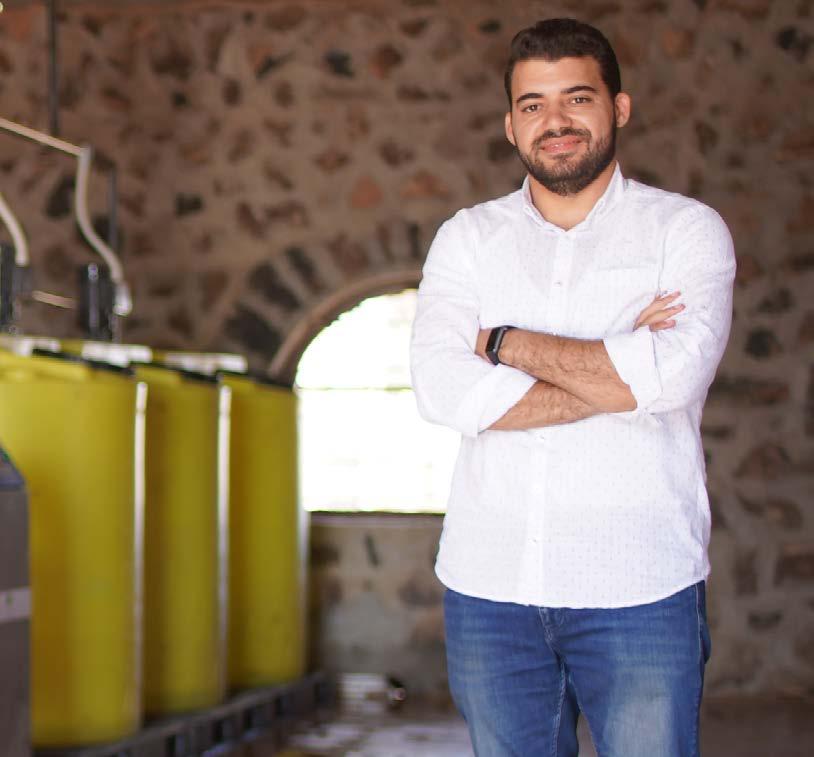
This observation is what sparked Zeinati’s entrepreneurial instincts, which led him to launch Smart Green in 2020 in both Jordan as well as Canada. To fulfill its vision to digitally transform traditional agricultural practices, Smart Green makes use of Industry 4.0 technologies such as artificial intelligence (AI), cloud computing, internet of things (IoT), and machine learning. One of its main offerings is Fertigo, a smart irrigation and fertigation (the process of fertilizing and irrigating at the same time) system that aims to address water scarcity. “Fertigo is the first smart irrigation and fertilization system to offer Arabic language services, allowing us to cater to a wider community of growers, and scale positive practices in Jordan and the wider Middle East region,” Zeinati adds. “More than 70% of water consumption around the world goes towards agriculture. Smart Green therefore aims to reduce water consumption in agriculture to make more
← FERTIGO offers a solution to save water, save fertilizer, accurate fertilization, meet the demand for fruit growth, improve fruit quality, improve output, and reduce labor
tions, while protecting the environment. Smart Green thus uses advanced technology from the Industrial Revolution 4.0 to help farmers optimize their use of water, nutrients, and energy sources.”
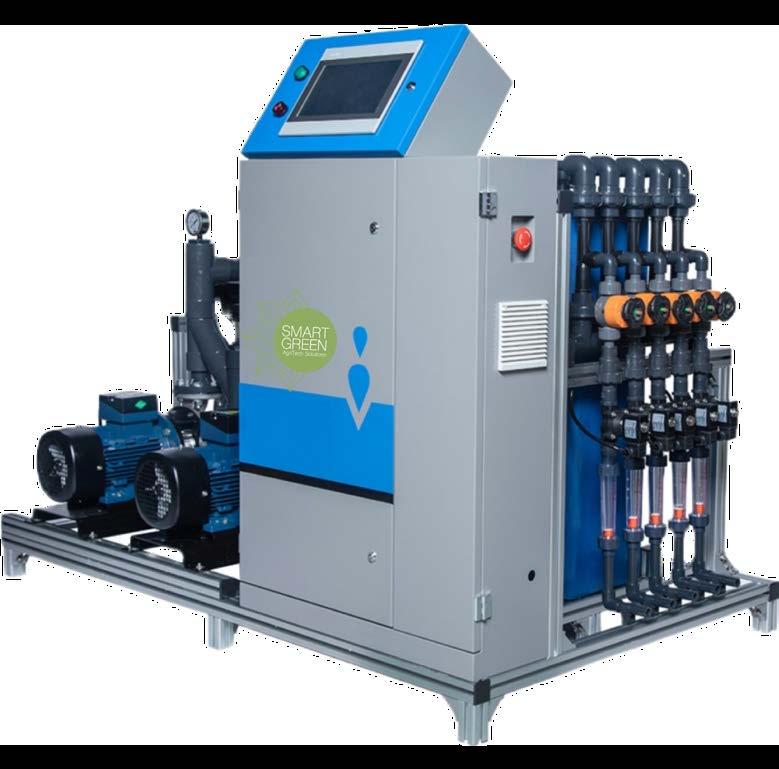
water available for people’s consumption. At Smart Green, we hope to develop technology that addresses food security through water-saving technologies for the next generation.”
}Besides Fertigo, Smart Green has two other major solutions in its portfolio: Rootrika, which is a root-sensing sensor, and Taqs Scope, a data-based weather application. “Our ultimate goal is to help farmers conserve resources and enable remote management,” Zeinati adds. “Our intelligent systems help farmers to reach the optimum use of water and fertilizers by delivering precise amounts of water and nutrients to plants in a timely manner. By delivering precise amounts of water and fertilizers in a timely manner, Smart Green can help farmers save up to 30% of water consumption in open systems, and 70% in closed systems. This results in higher-quality crops, and also helps ensure food security for future genera-
}For Zeinati, scaling his startup into newer markets within the region -such as Saudi Arabia- is his next plan of action. And to achieve this, the founder believes being a part of this year’s edition of PepsiCo’s Greenhouse Accelerator Program: MENA Sustainability Edition will be extremely beneficial. “One of the main challenges for startups in the region is a lack of capital and access to networks, but working with a multinational player like PepsiCo propels our growth,” Zeinati explains. “The program will allow us unprecedented access to potential investors, industry experts, business communities, and partners, alongside a world of new opportunities. As a growing business, access to insights into research and development, business models, market activation, product development, and regulatory practices are invaluable, and allow us to stay ahead of the curve. And, of course, if we win the final prize of $100,000, it can transform our business!”
}As for the road ahead, Zeinati reveals that he’s already devised comprehensive long-term strategies for his business. “These strategies include carrying out pilot projects in different areas to foster trust among local communities,” he says. “We will also conduct awareness sessions to emphasize the significance of technology in sustaining resources and improving food quality and quantity. Implementing upgrades to the current system through add-ons will enable users to invest more efficiently, and expand their experience in the field. Finally, we also wish to introduce new systems such as satellite monitoring, water harvesting, and other services for the agriculture sector, and provide a diverse range of agriculture applications that cater to the needs of various farms, including crops and irrigation networks.”


Applications are now open for the Future 100, an initiative by the UAE Ministry of Economy and the Government Development and the Future Office that aims to highlight the top 100 startups that promote the UAE’s readiness for the future as well as the competitiveness of its future economic sector. Startups and scaleups that have offices or operations in the UAE that are eligible to apply can submit an online application on the Future 100 initiative’s website. Applicants to the Future 100 will need to be operating in the fields of future technologies (sharing economy, robotics, Web3, internet of things, blockchain, on-demand economy, AI-based service optimization, and 3D printing), or future industries (renewable

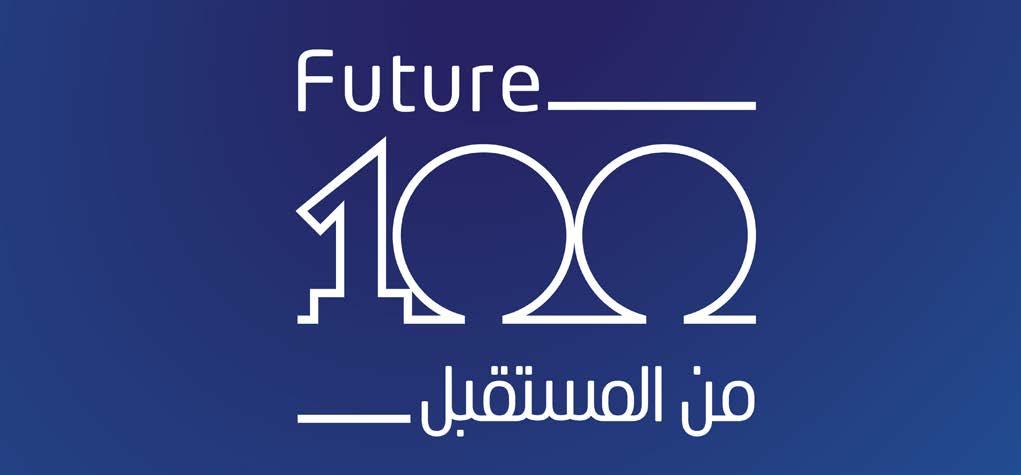
energy, agritech, advanced manufacturing, biotechnol ogy, space, creative indus tries, sustainability and environment, health tech, cybersecurity, intelligent mobility, and fintech). Applicants for the Future 100 will be evaluated on the basis of their creative capacity, market potential, and environmental, social and corporate governance impact.
Besides the prestige of being one of the Future 100, the companies selected to be a part of this list will also be felicitated at a high profile award ceremony, and they will also be given support in terms of funding, legal, commercial, and capacity building, as well as access to investors, regulators, and the business community in general.
The Future 100 initiative was launched in December 2022 in the presence of the H.E. Abdulla bin Touq Al Marri, UAE Minister of




